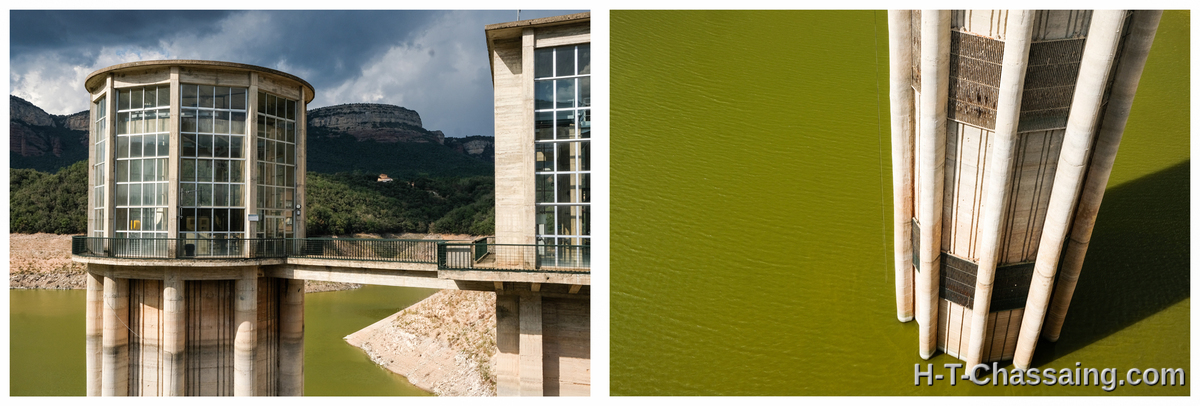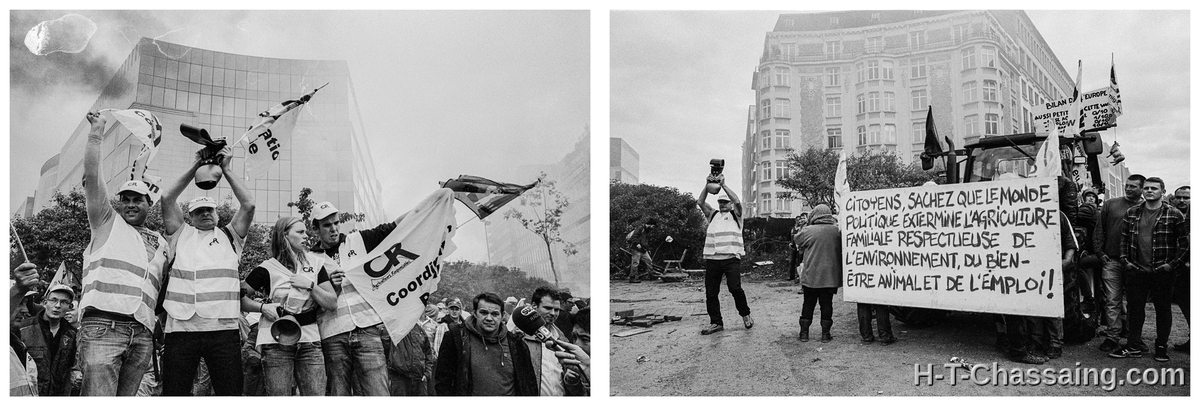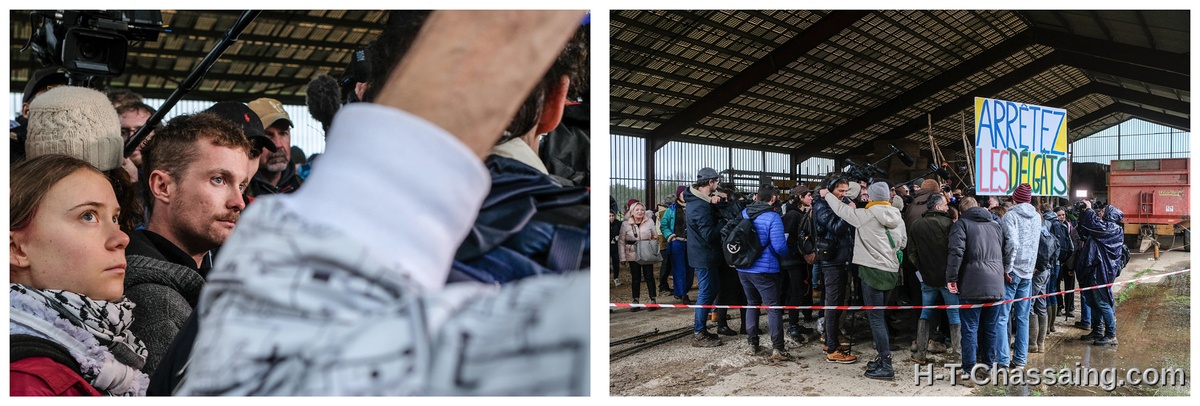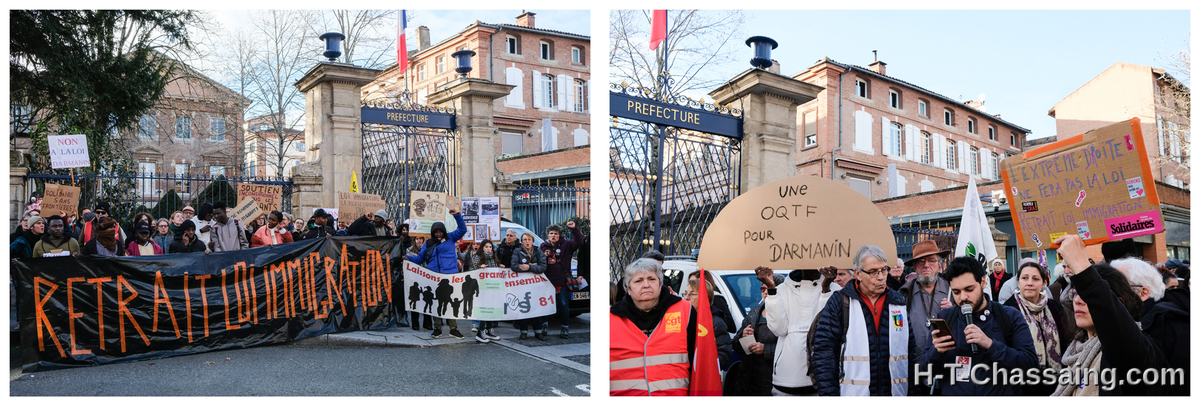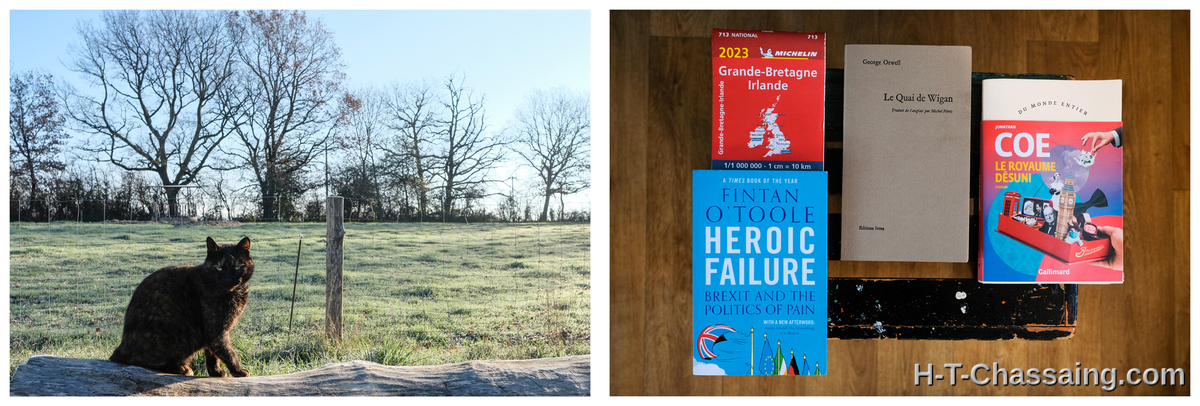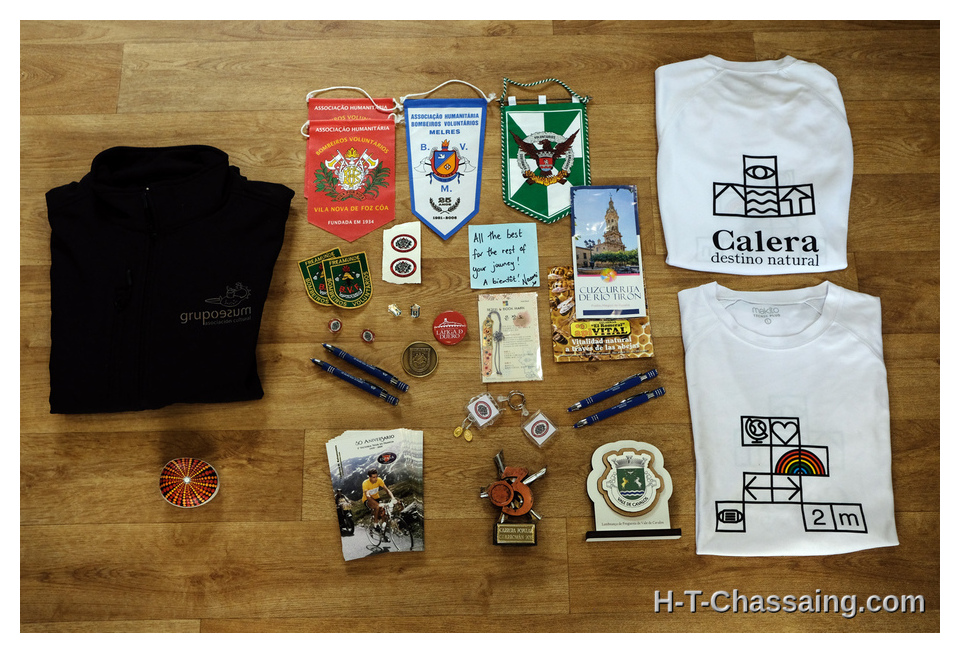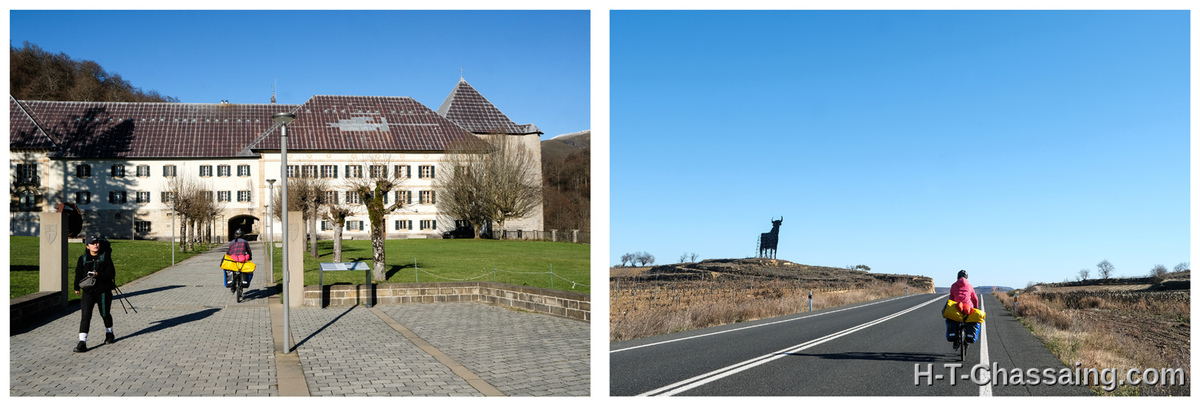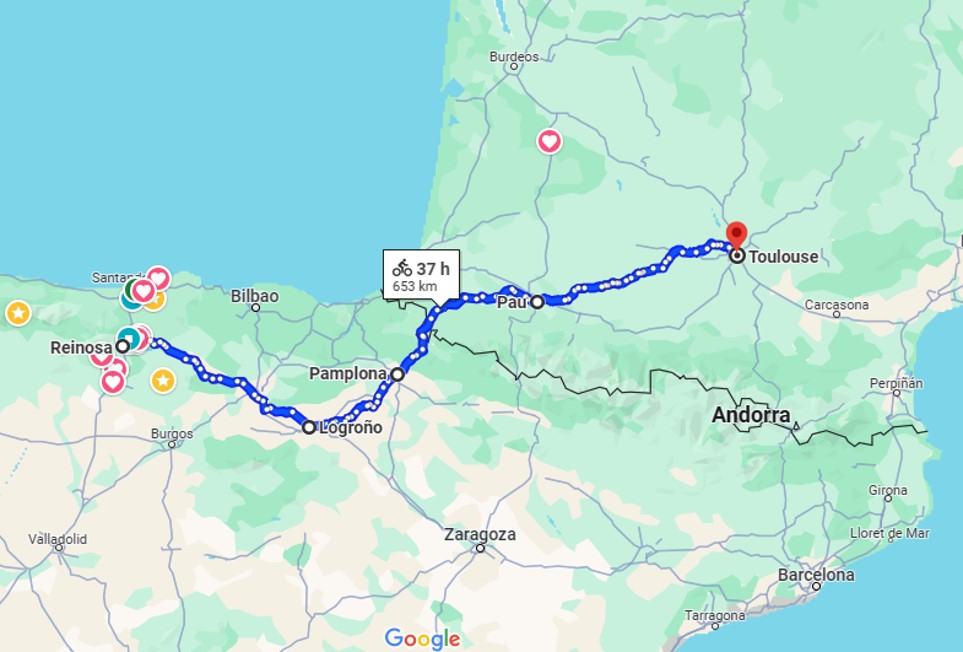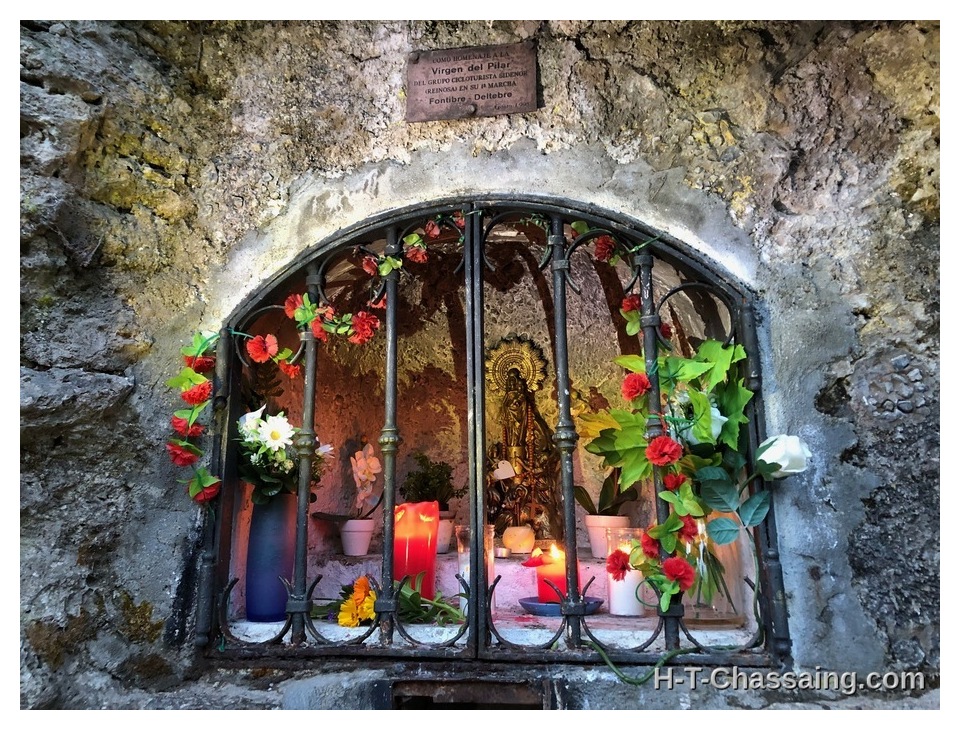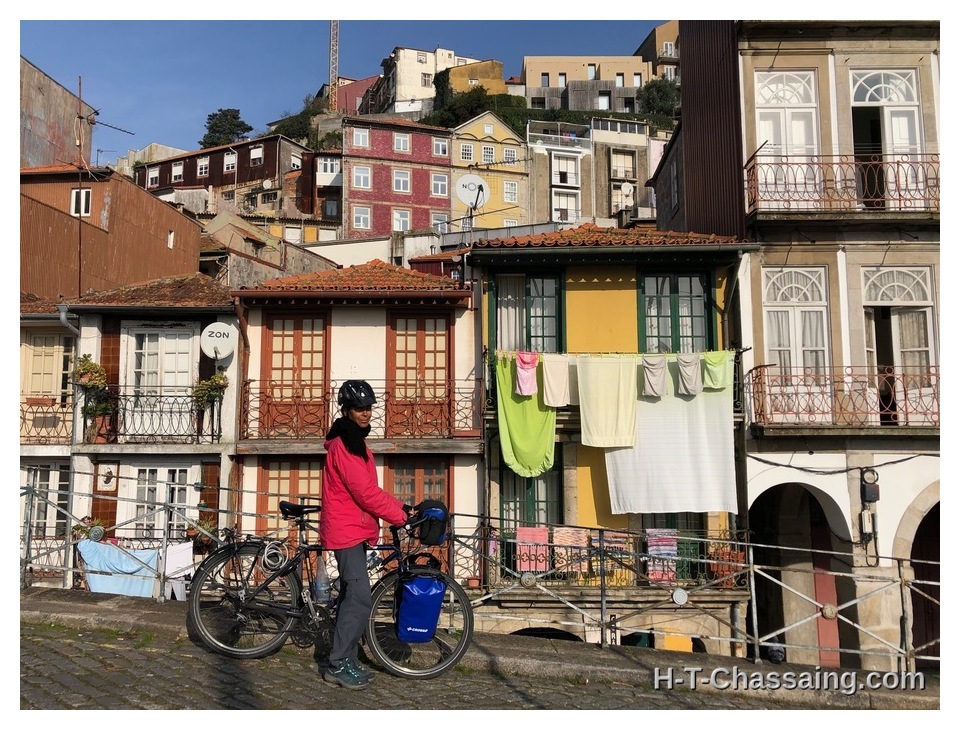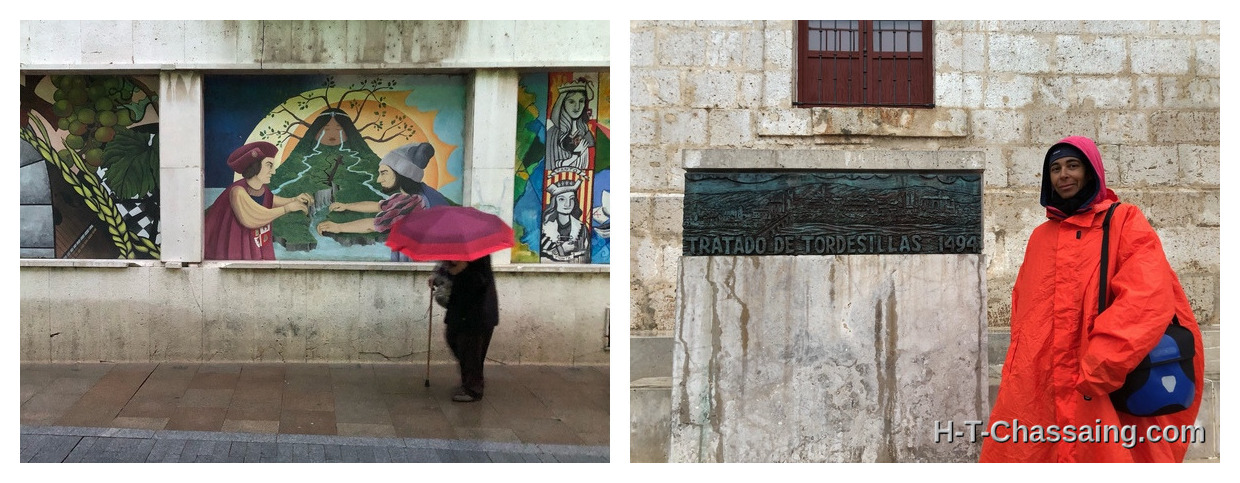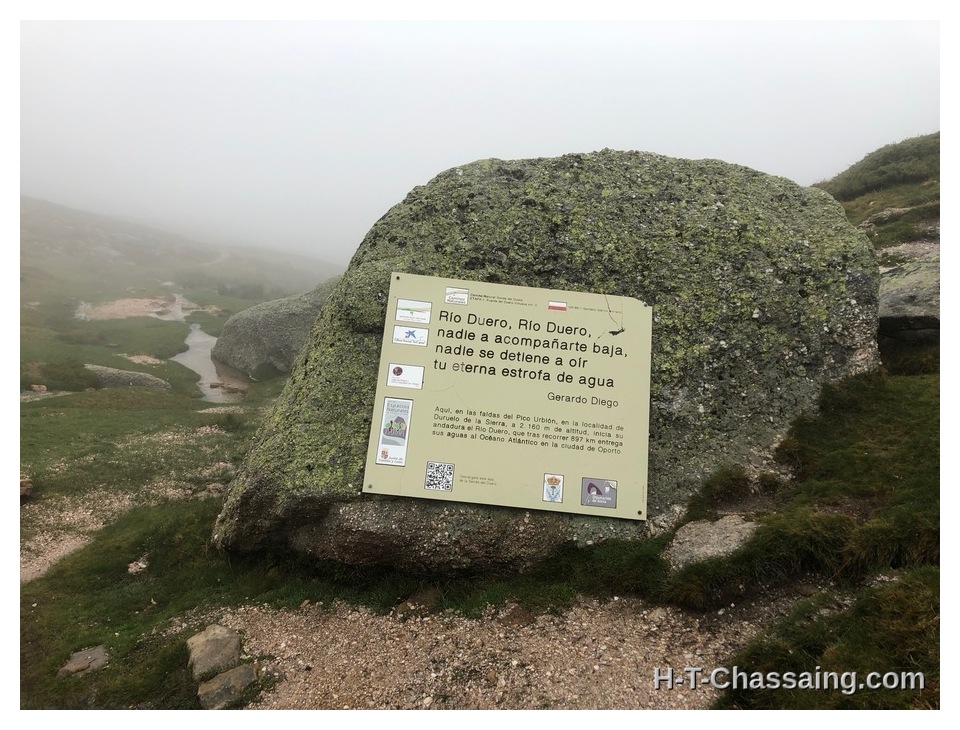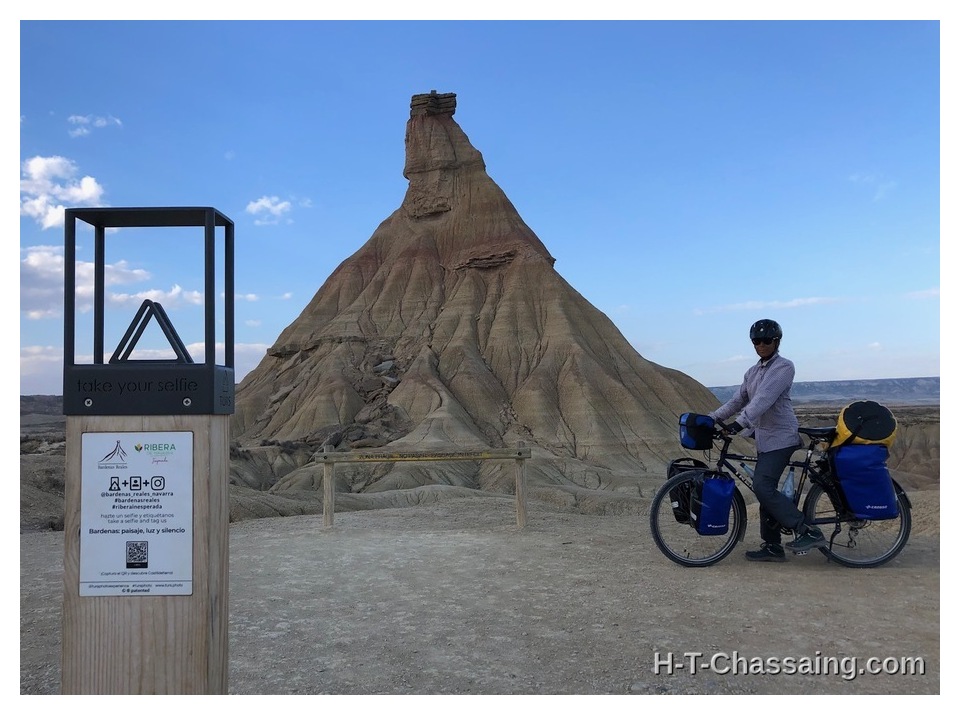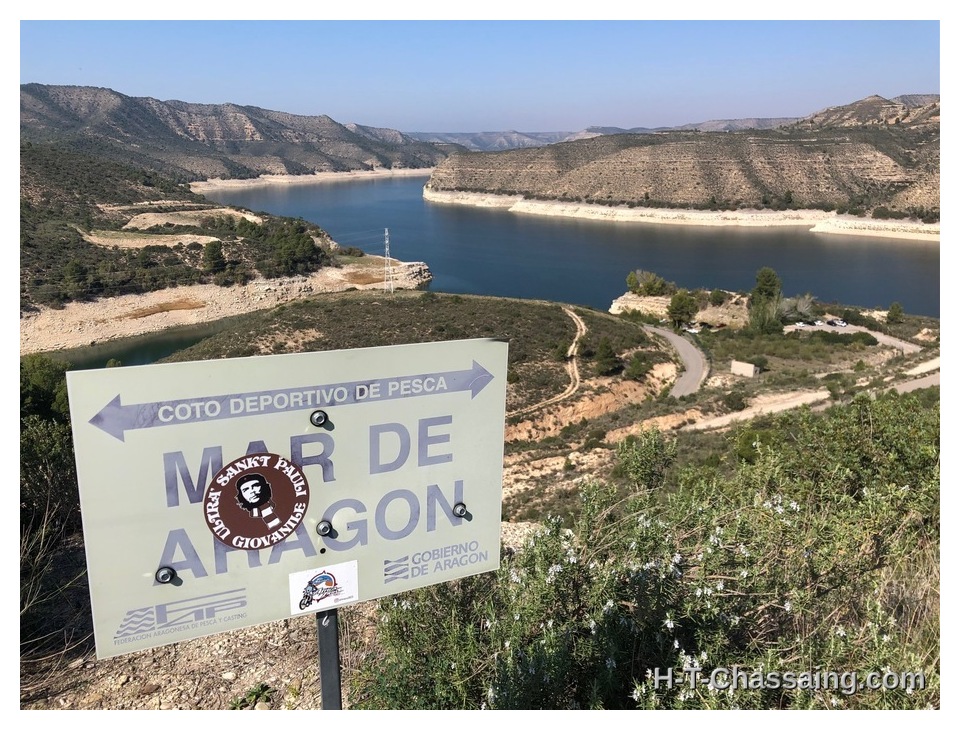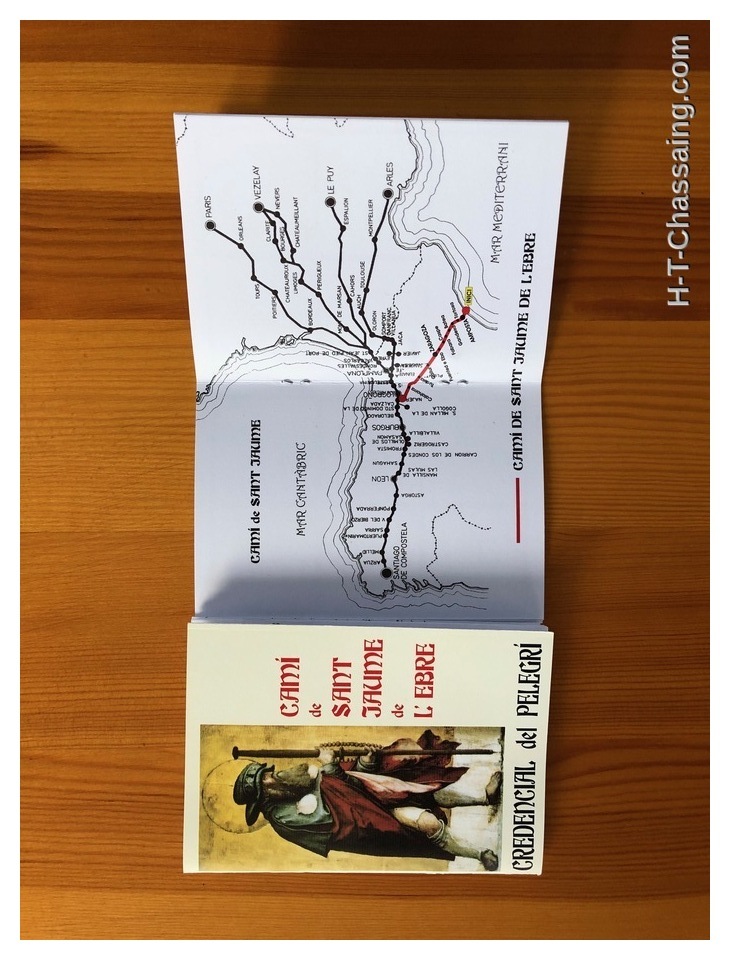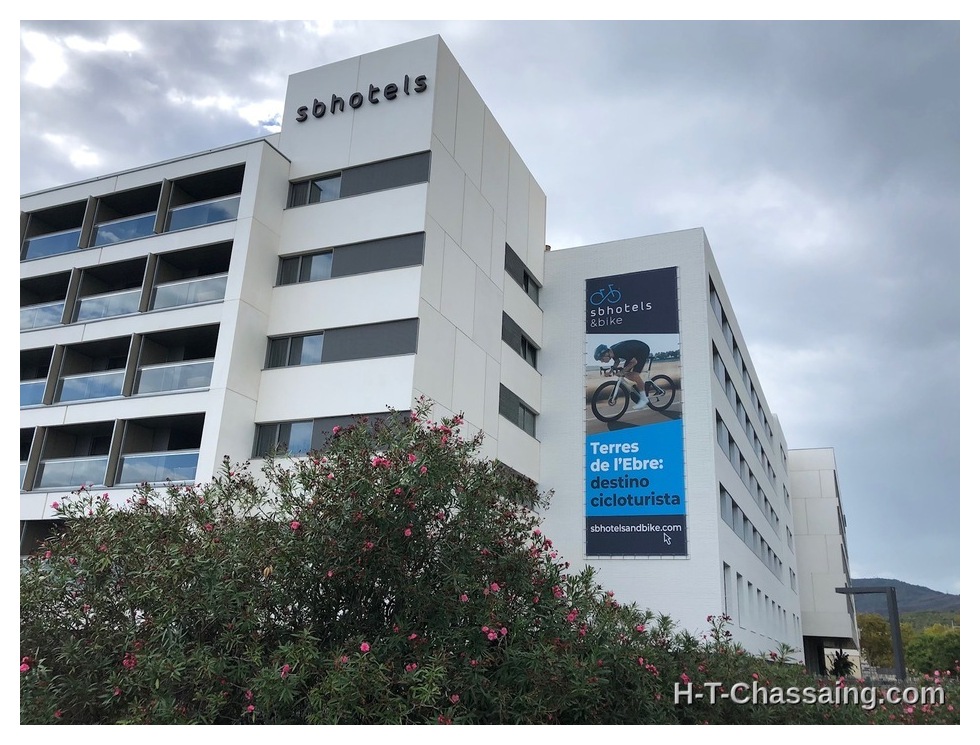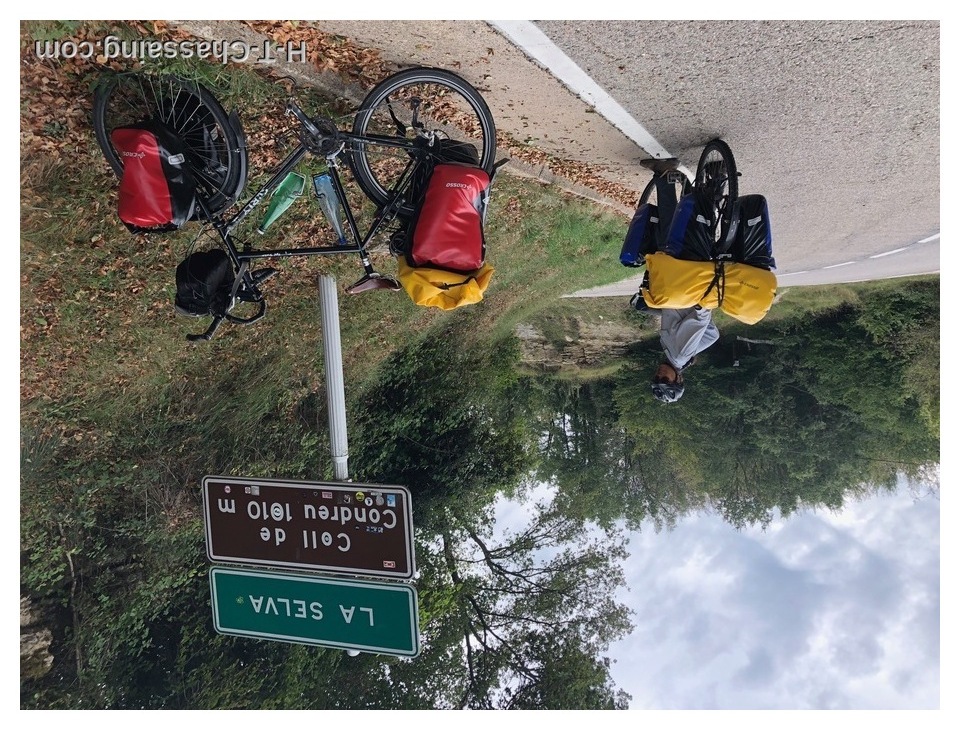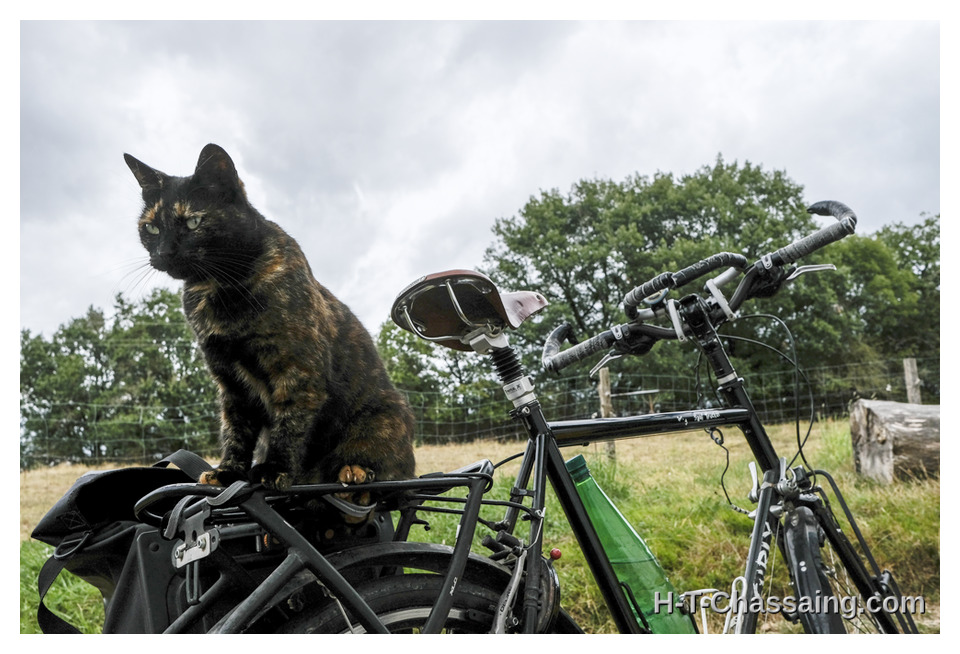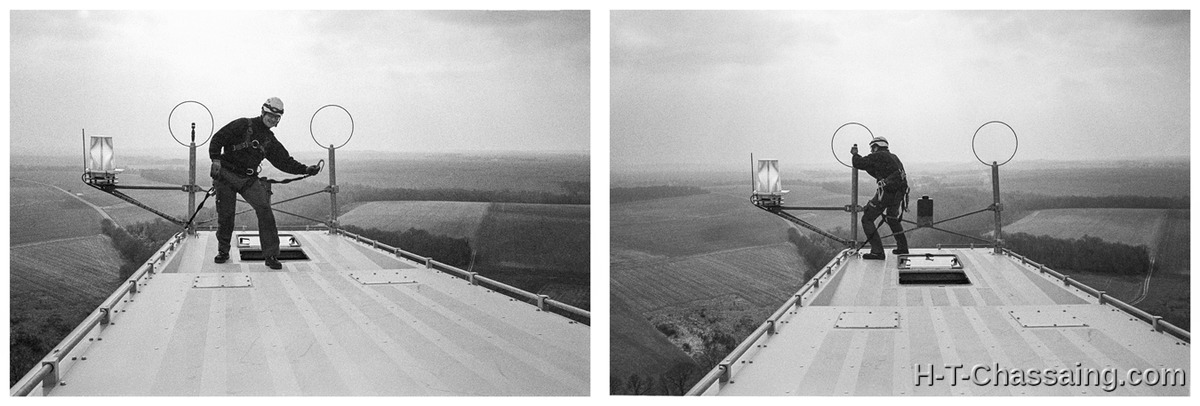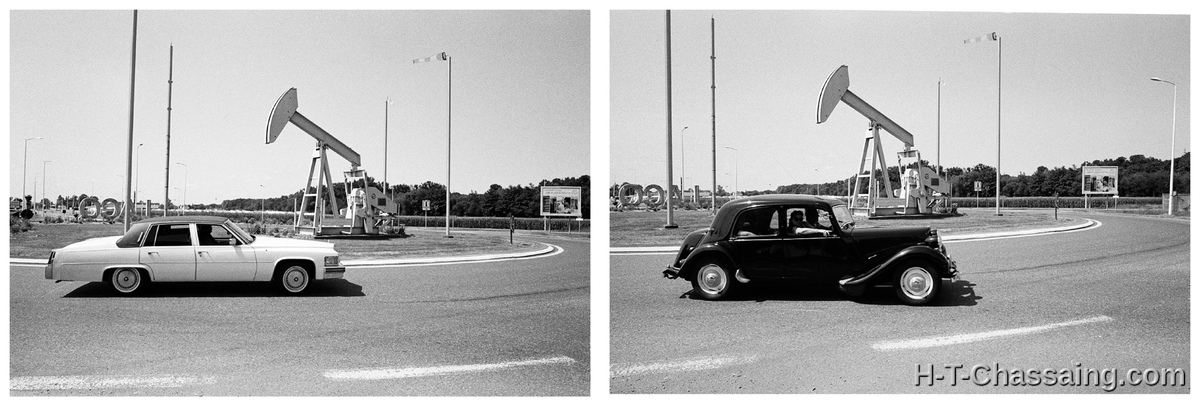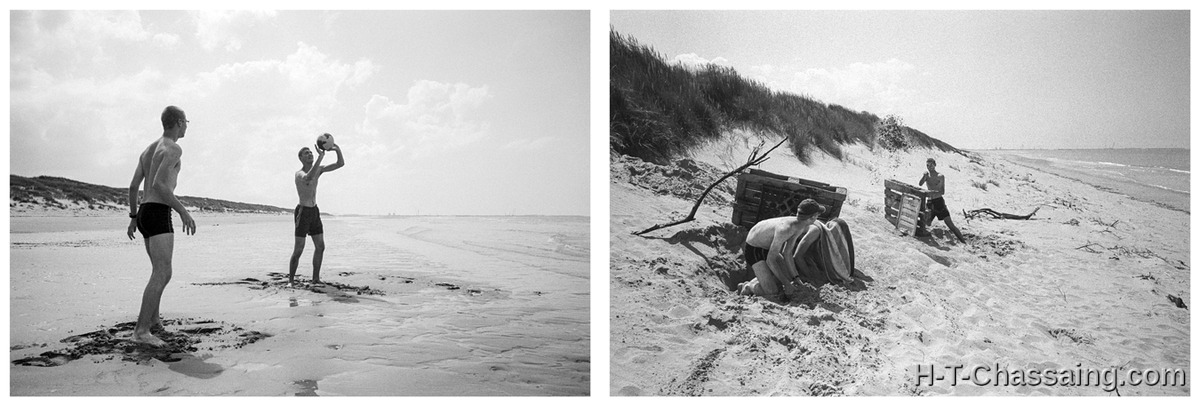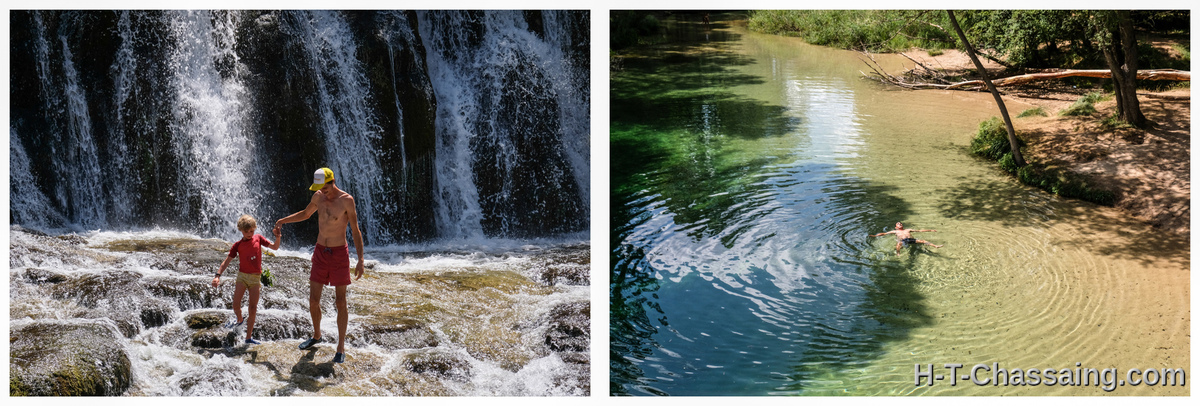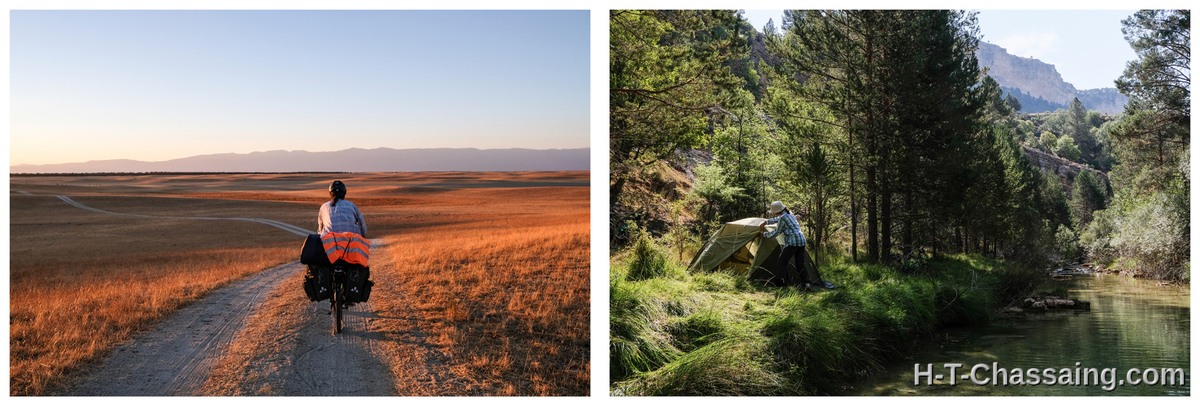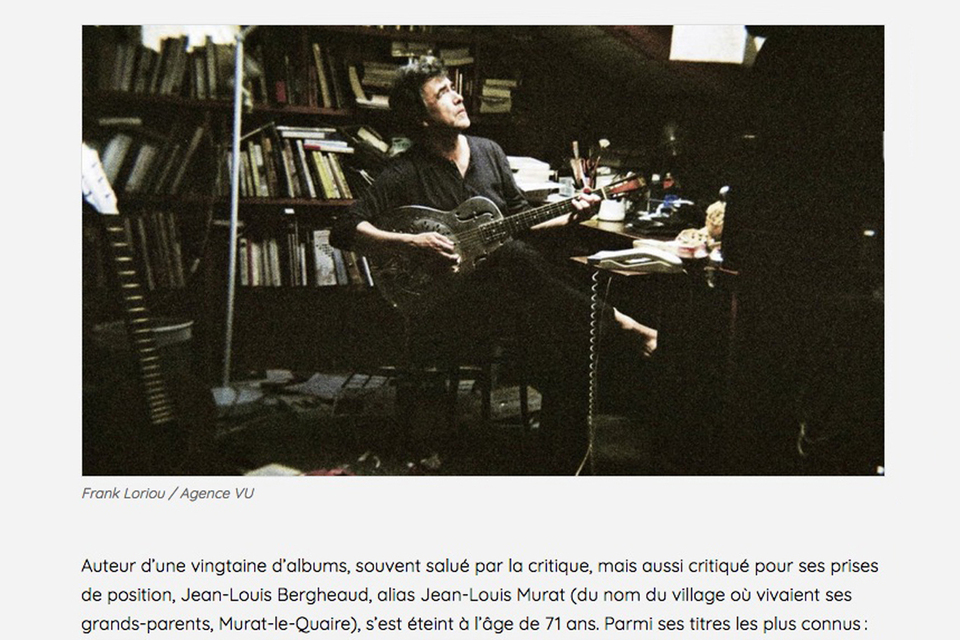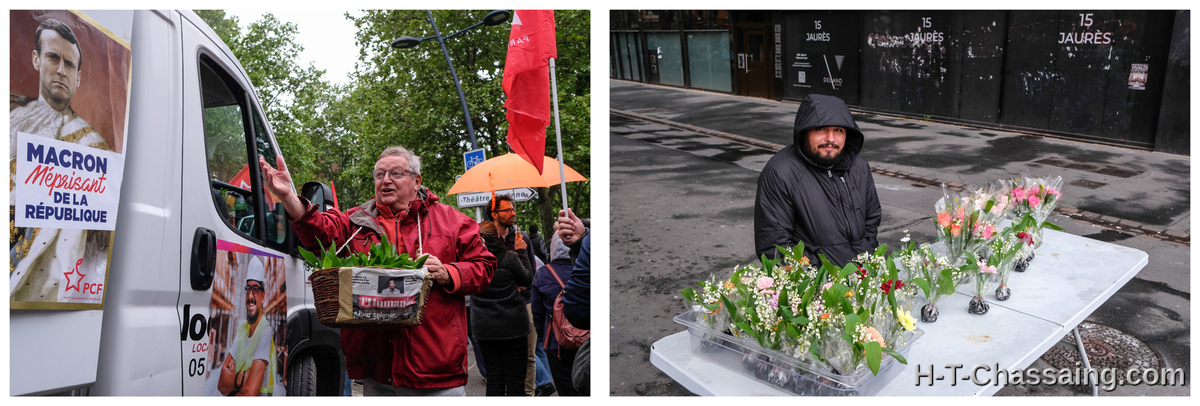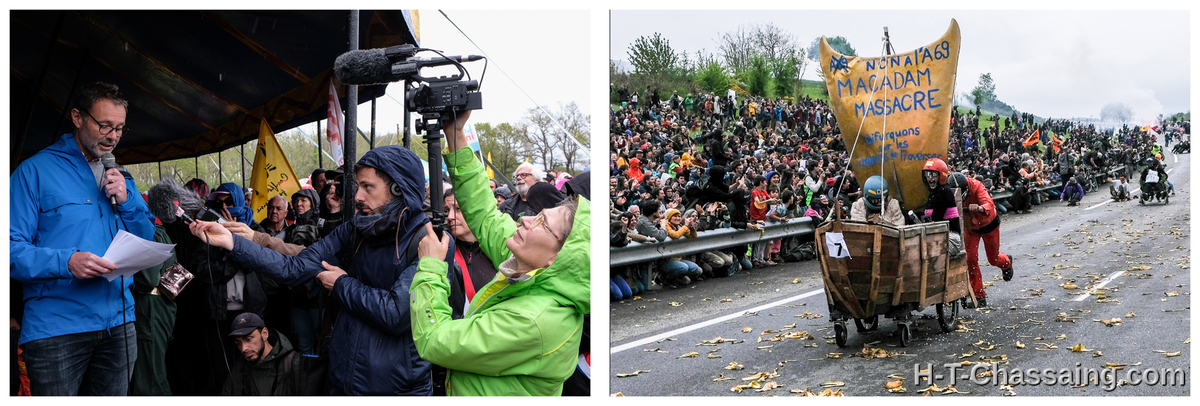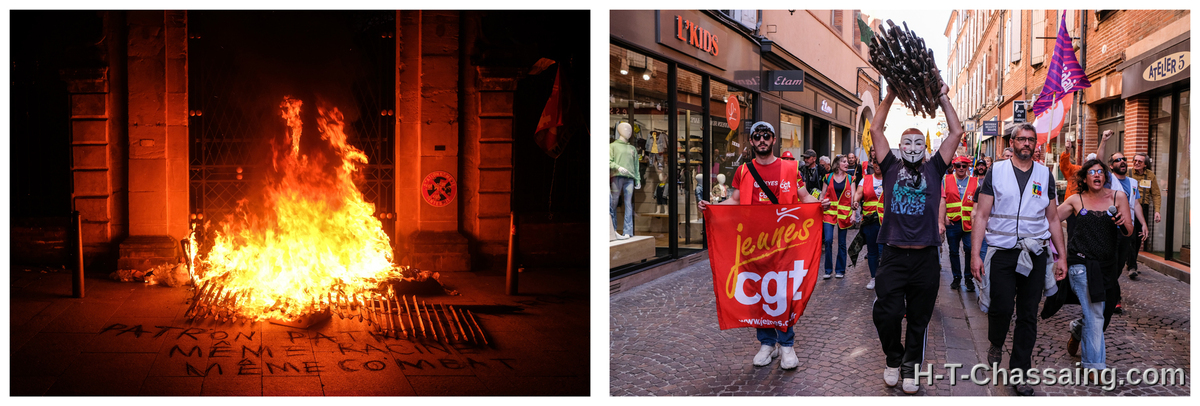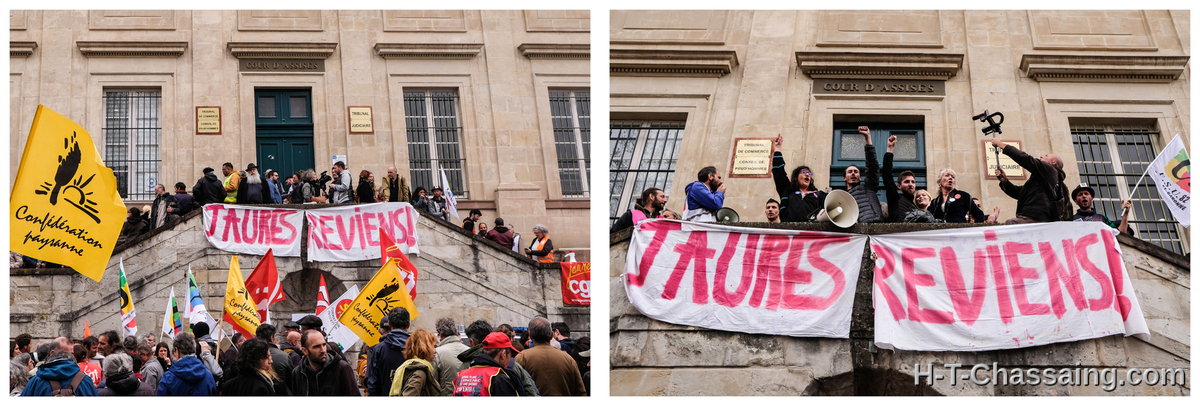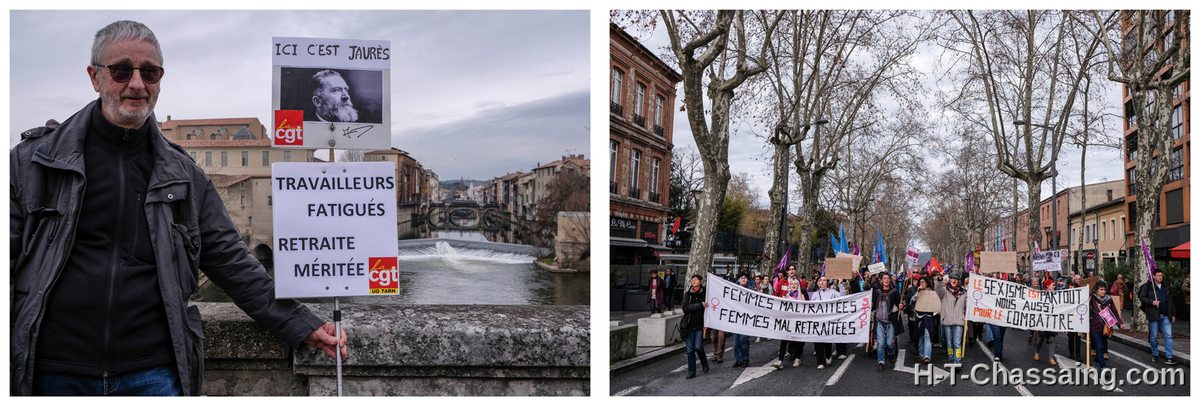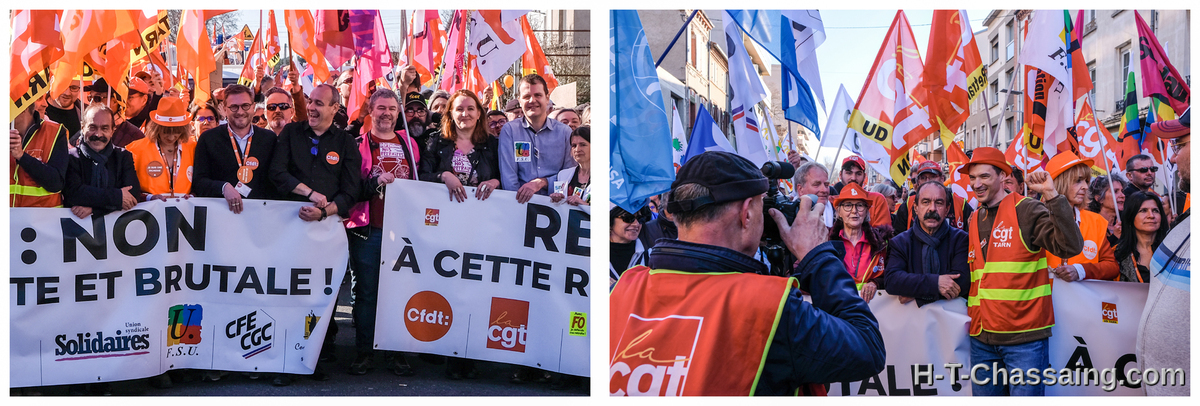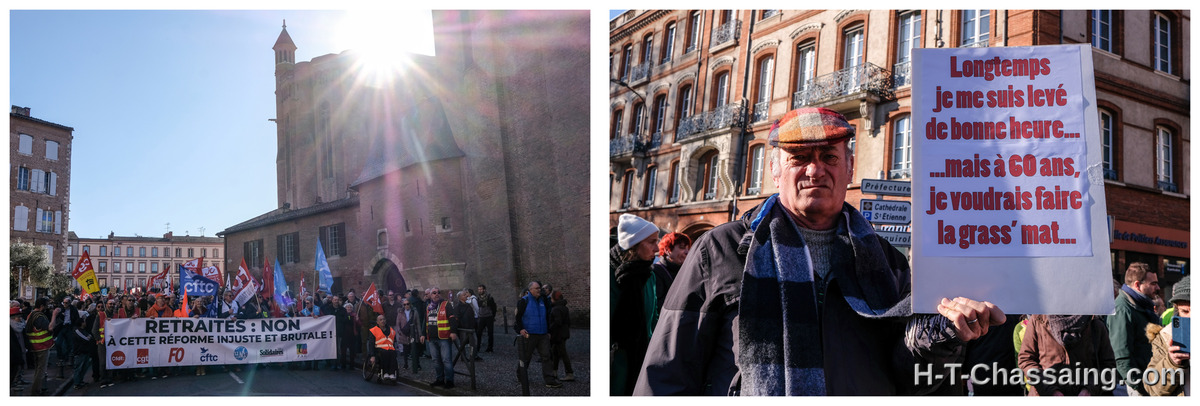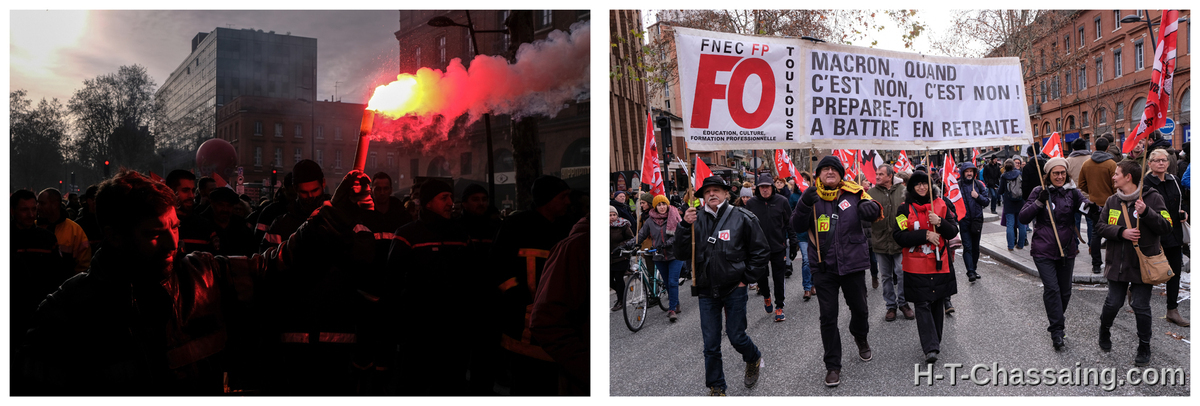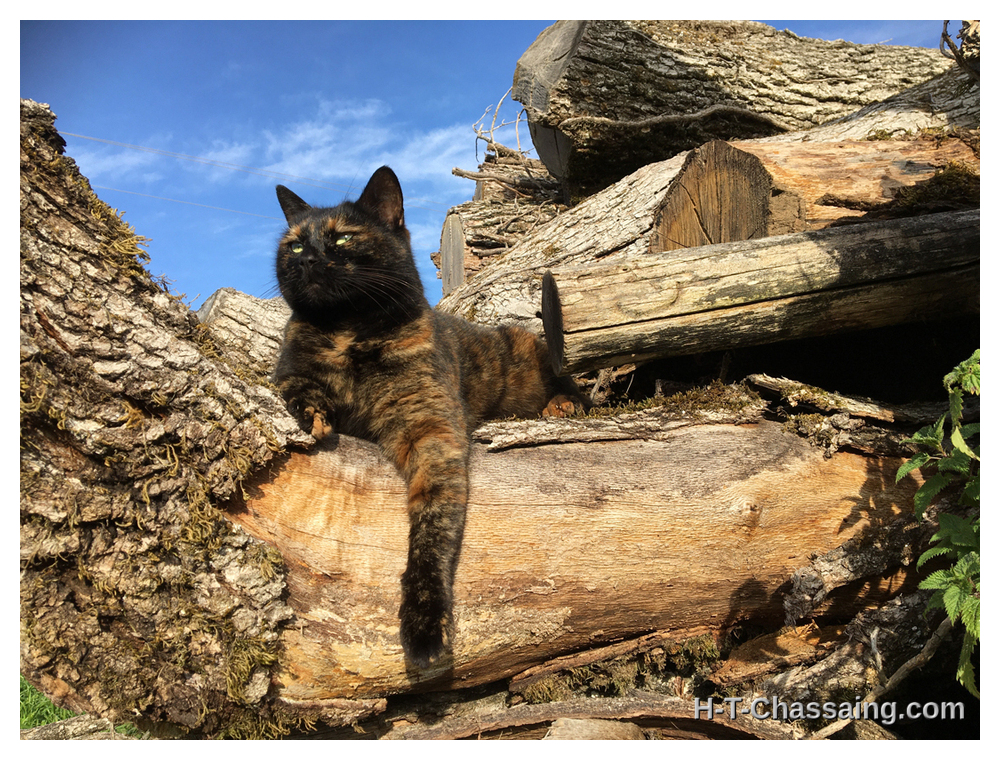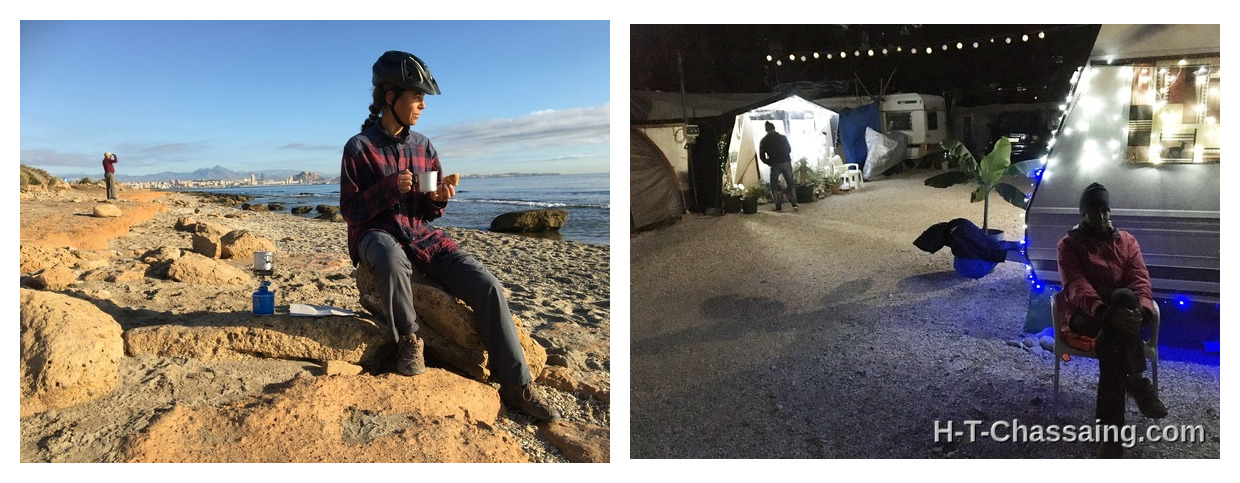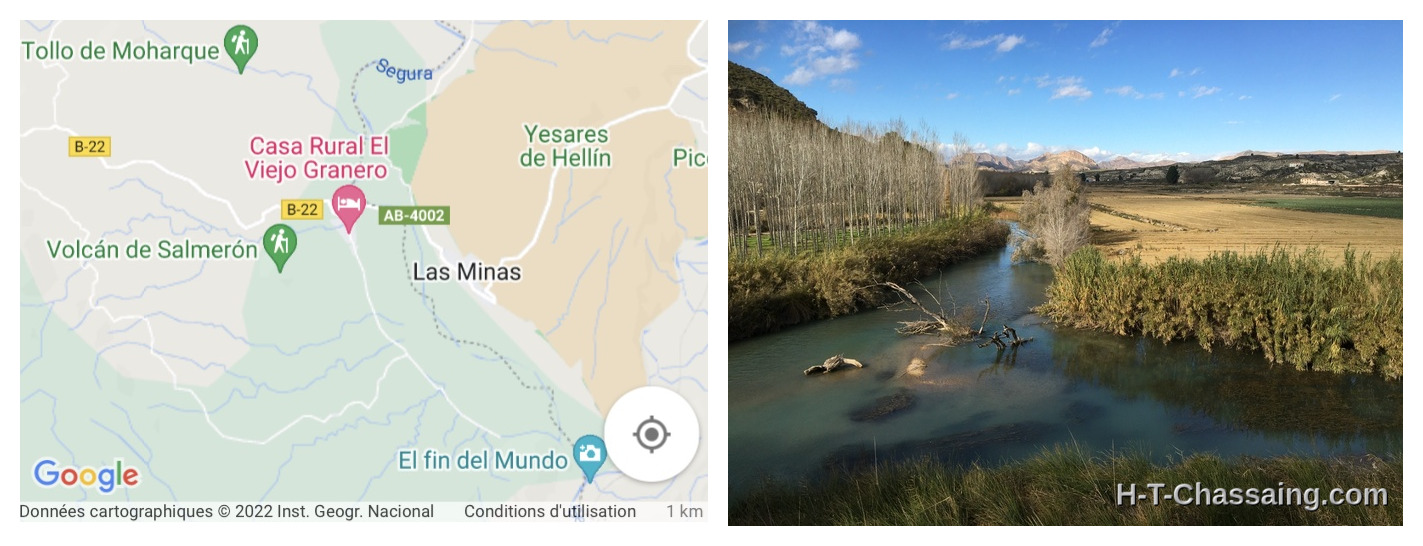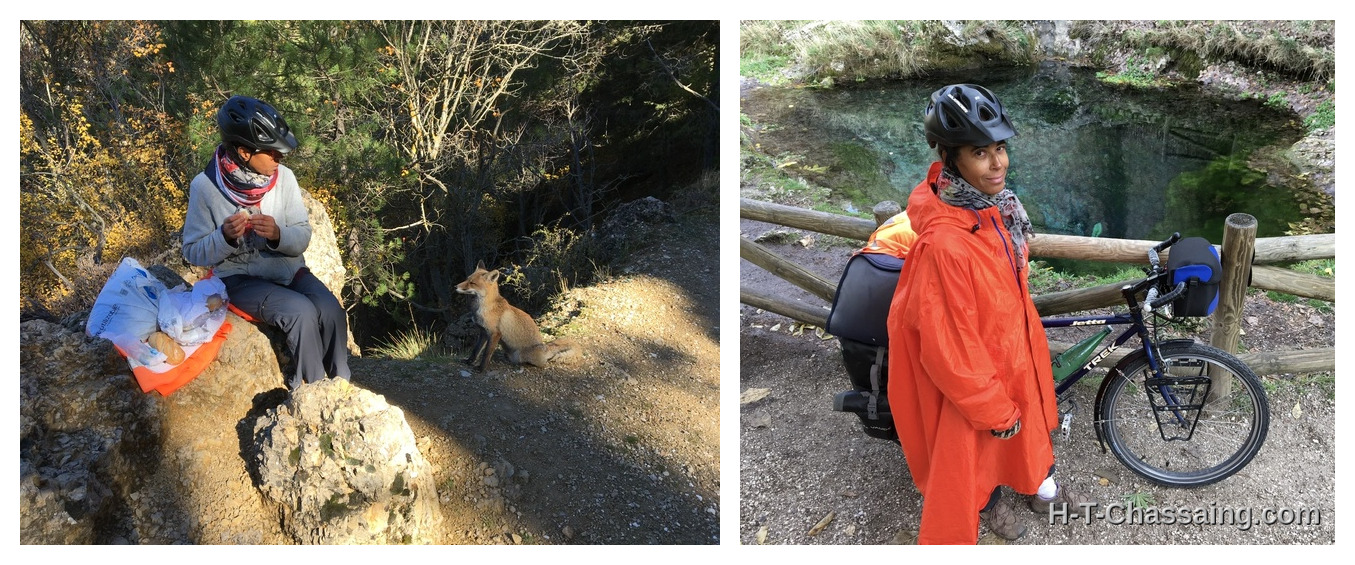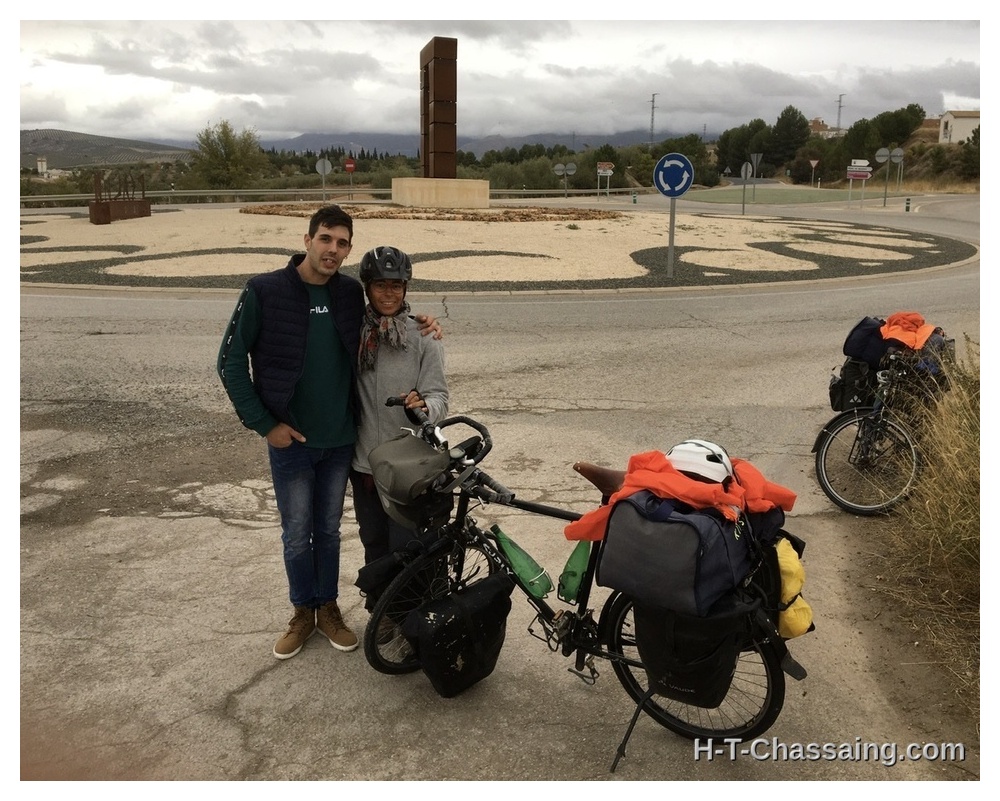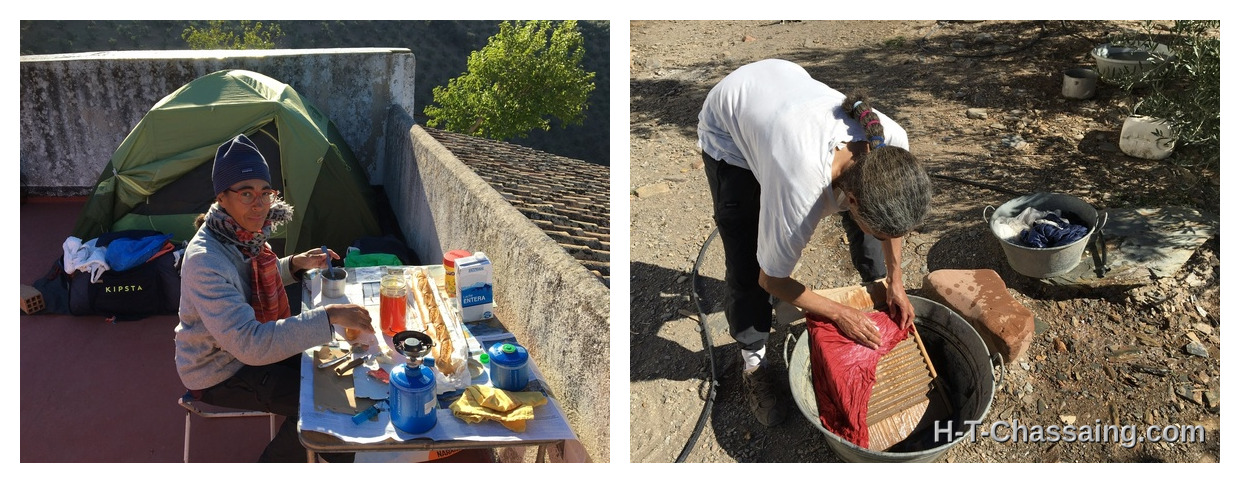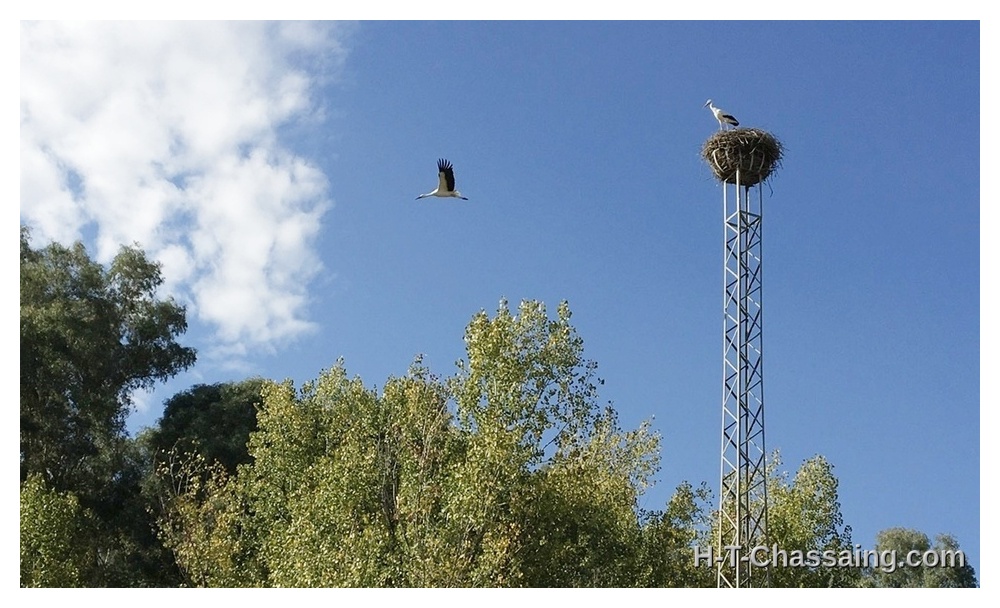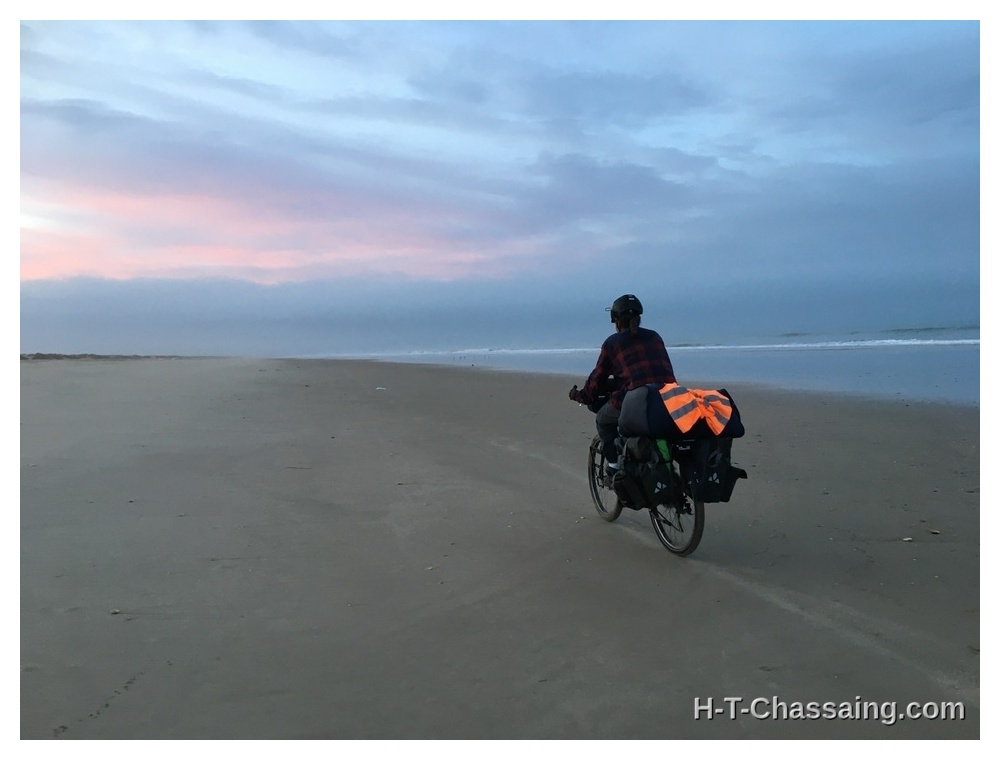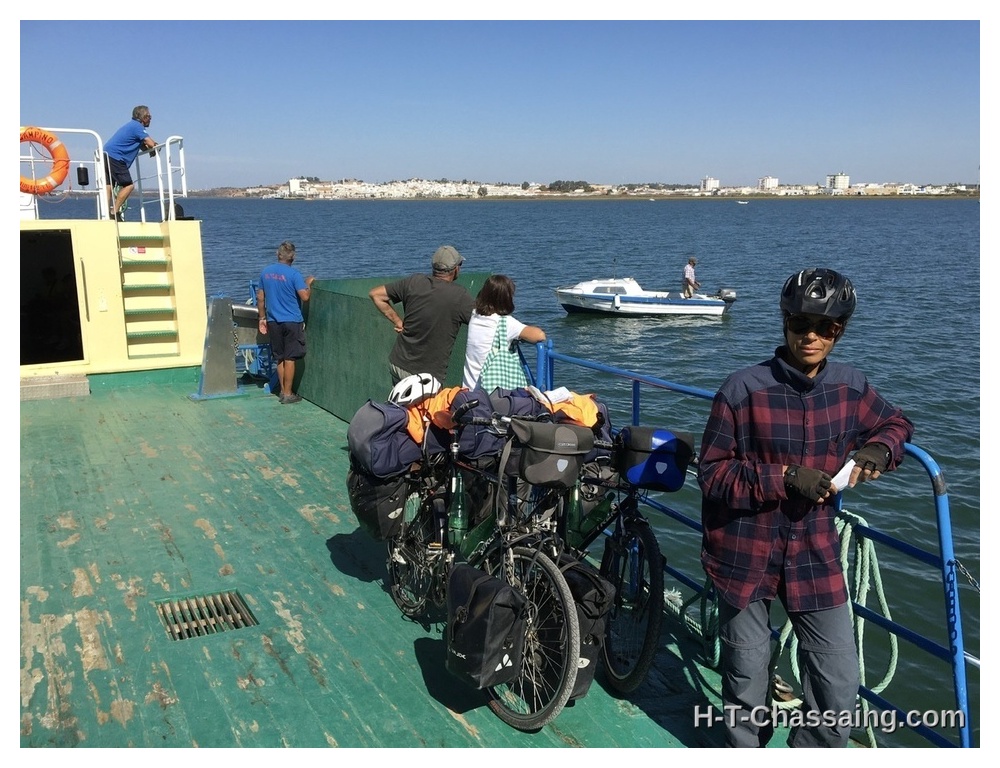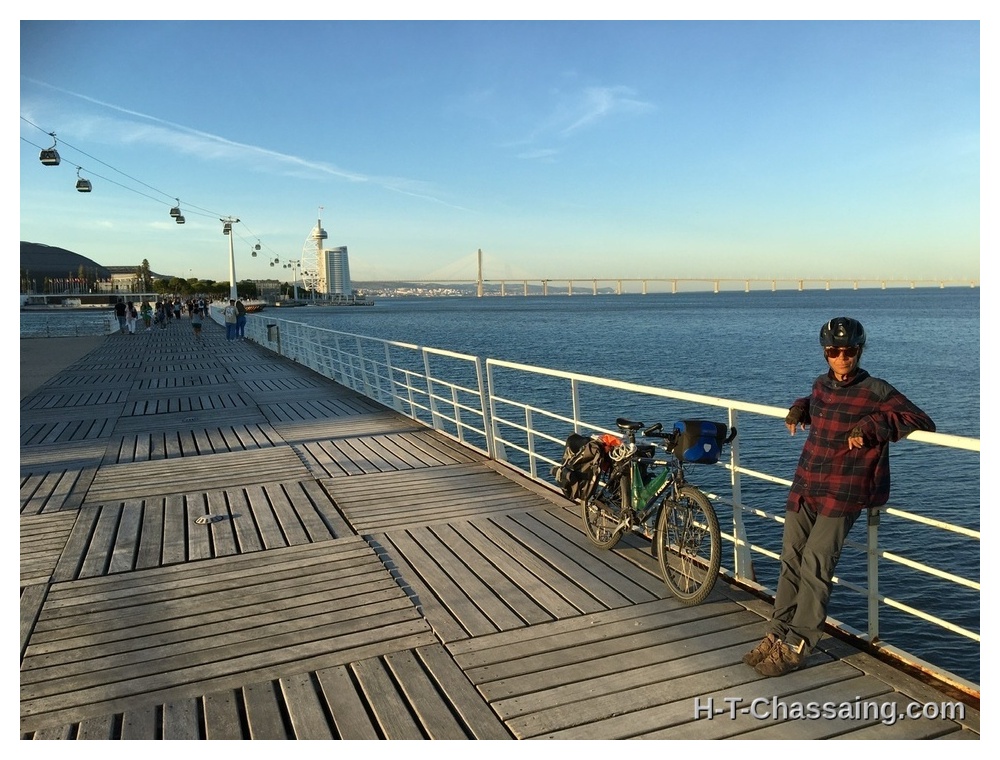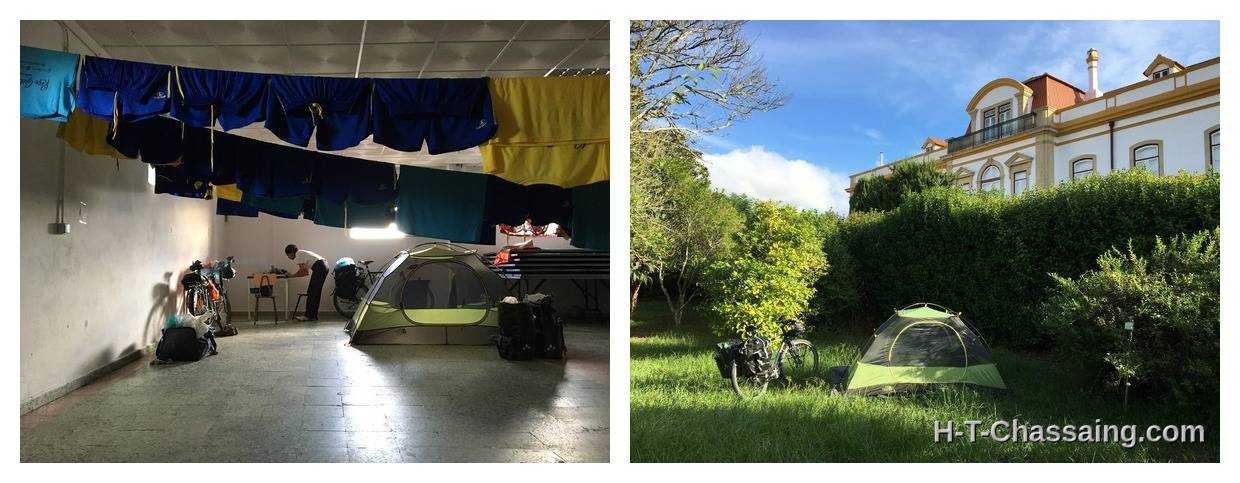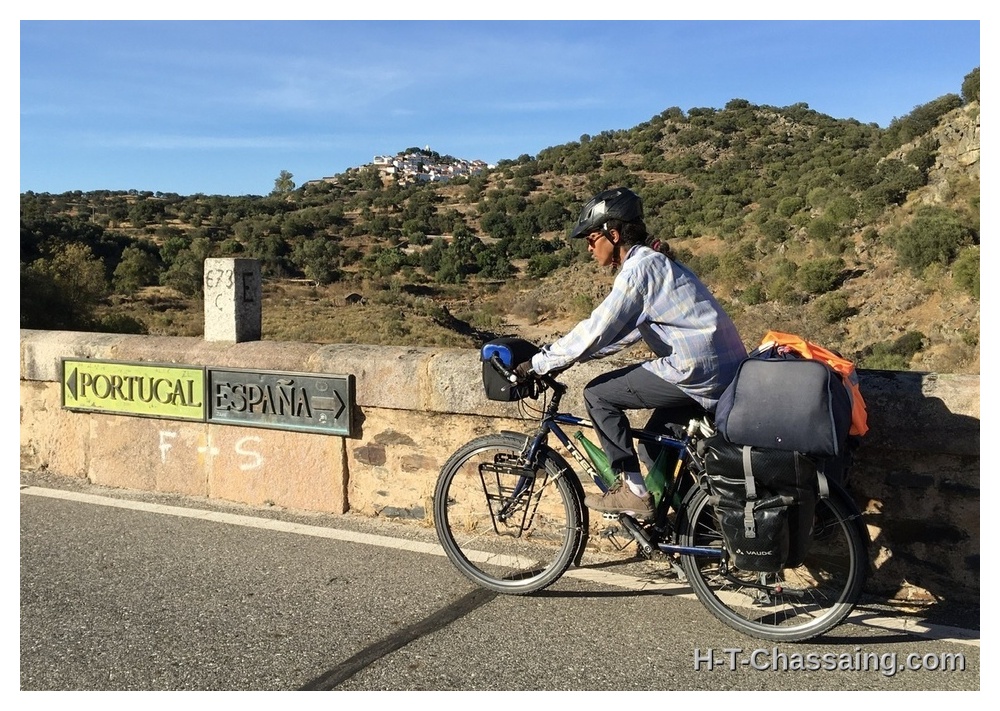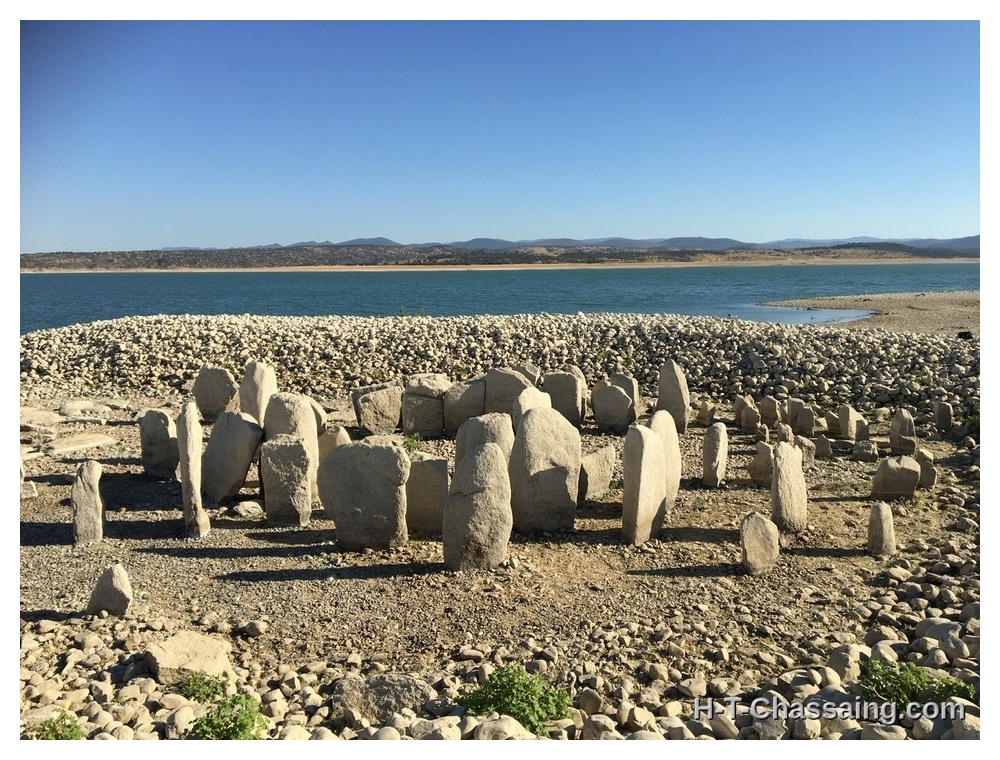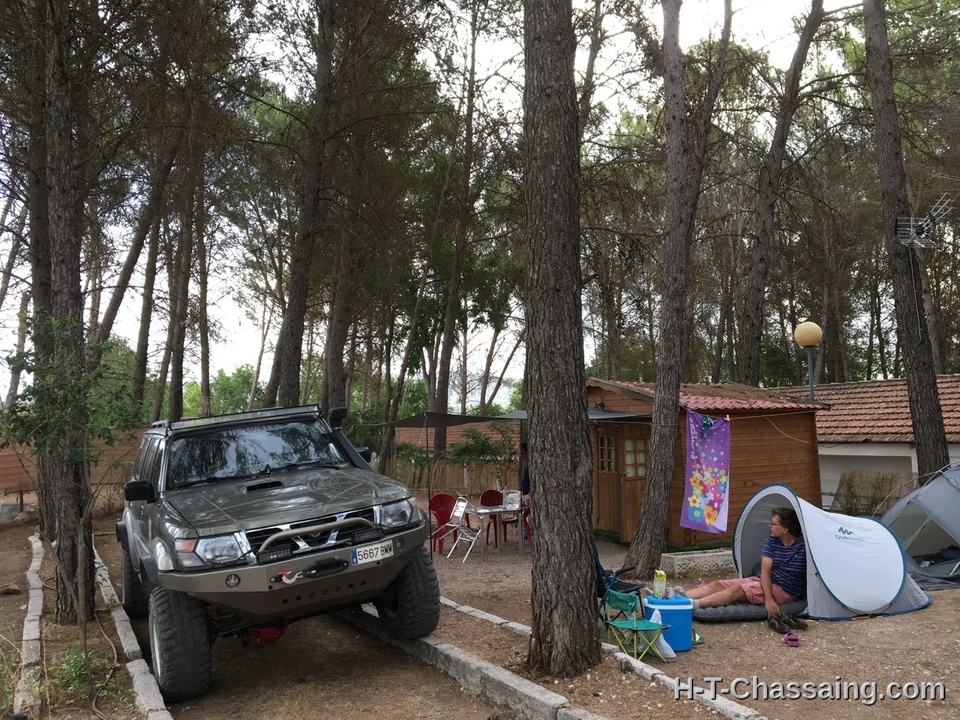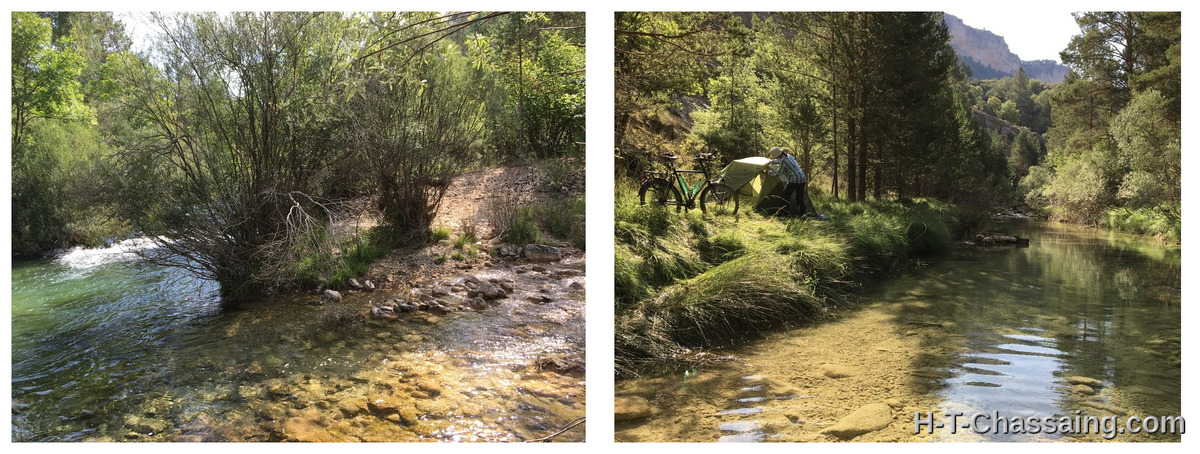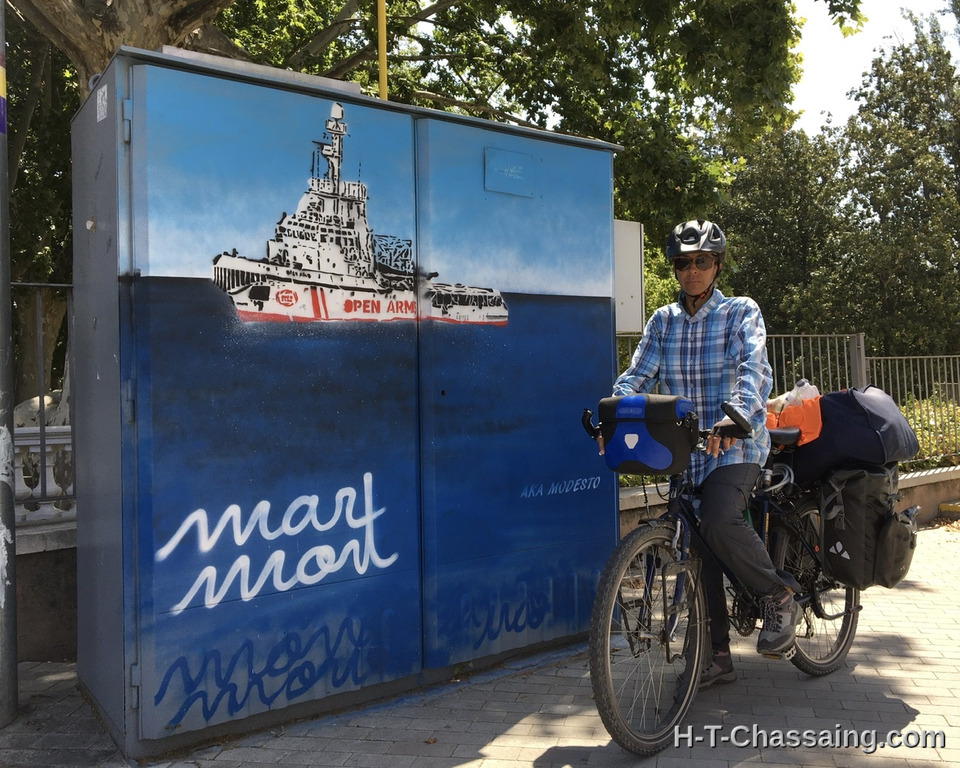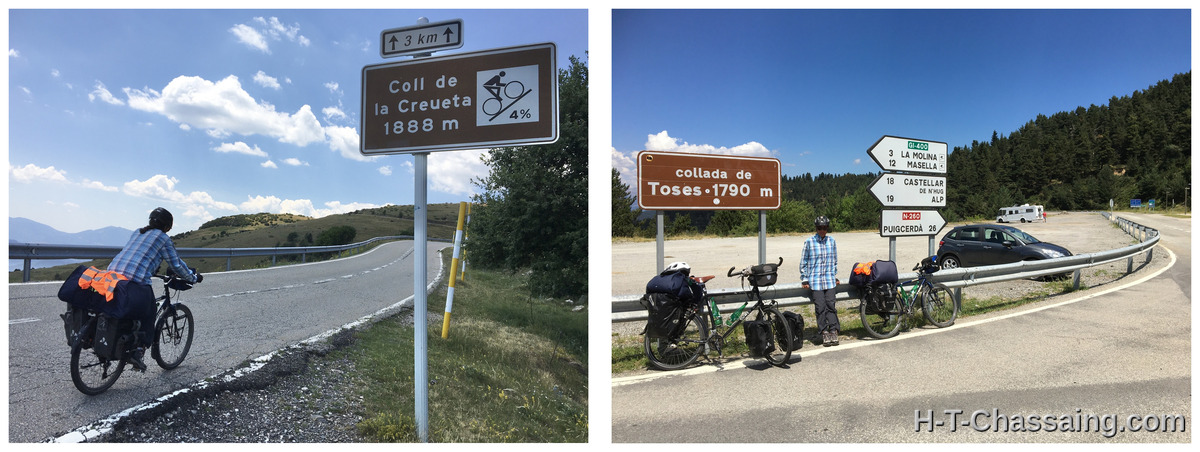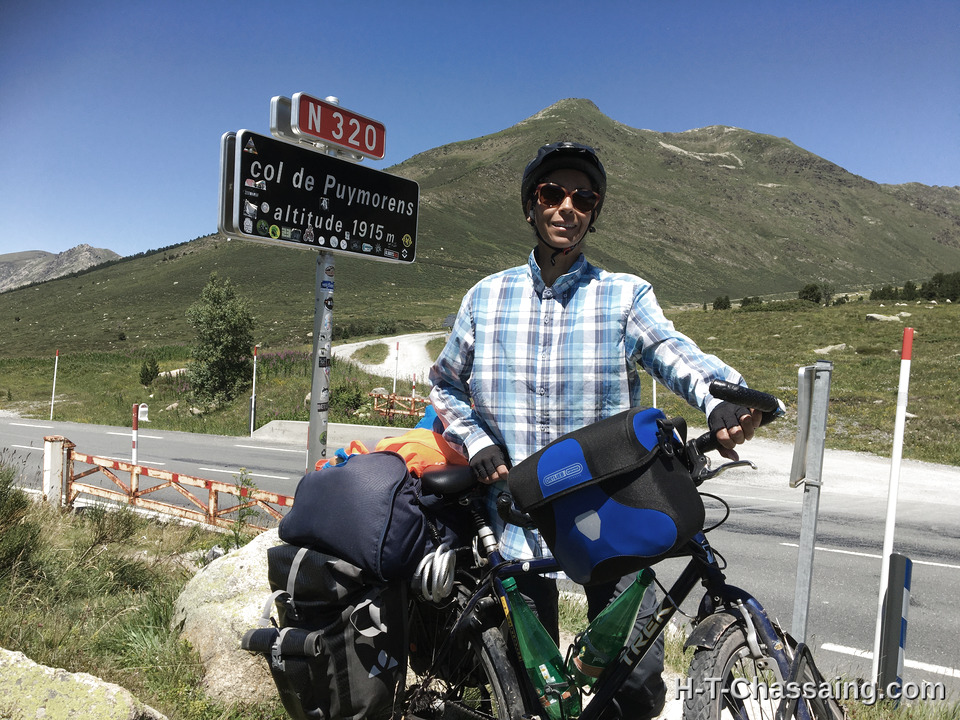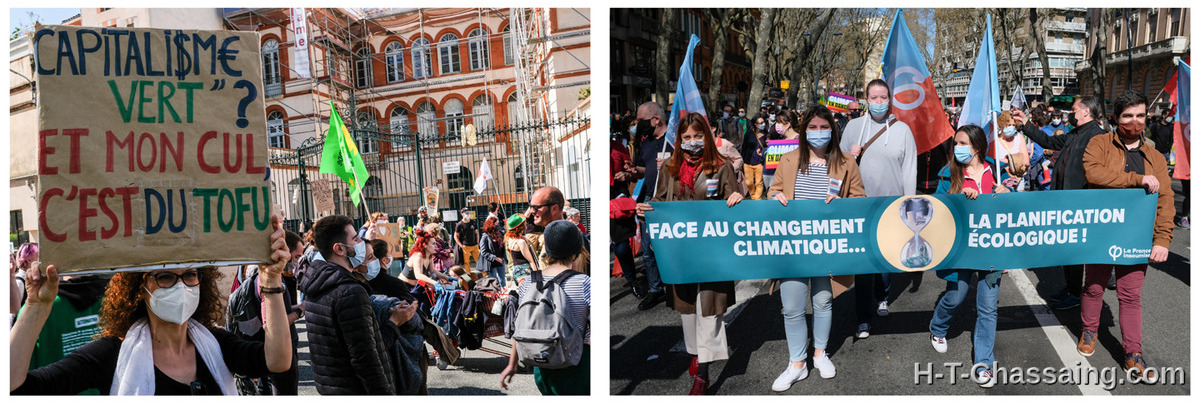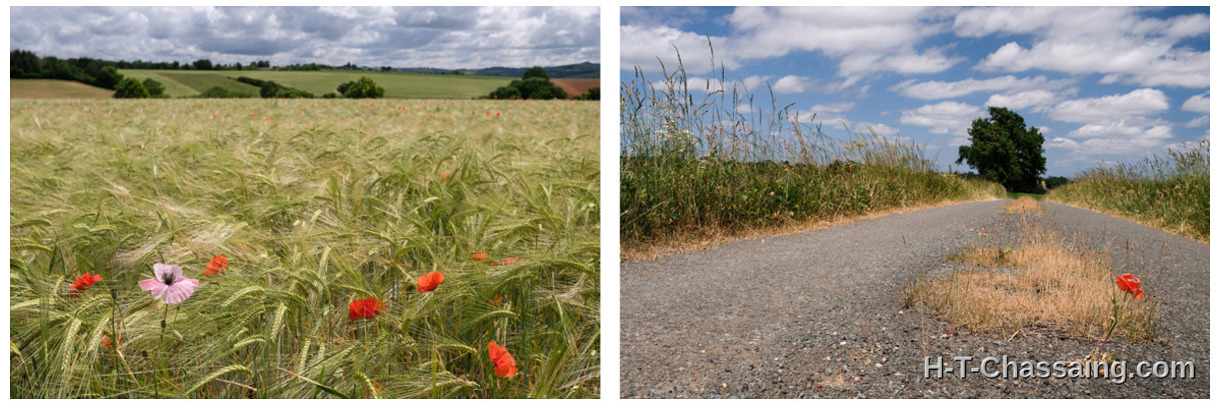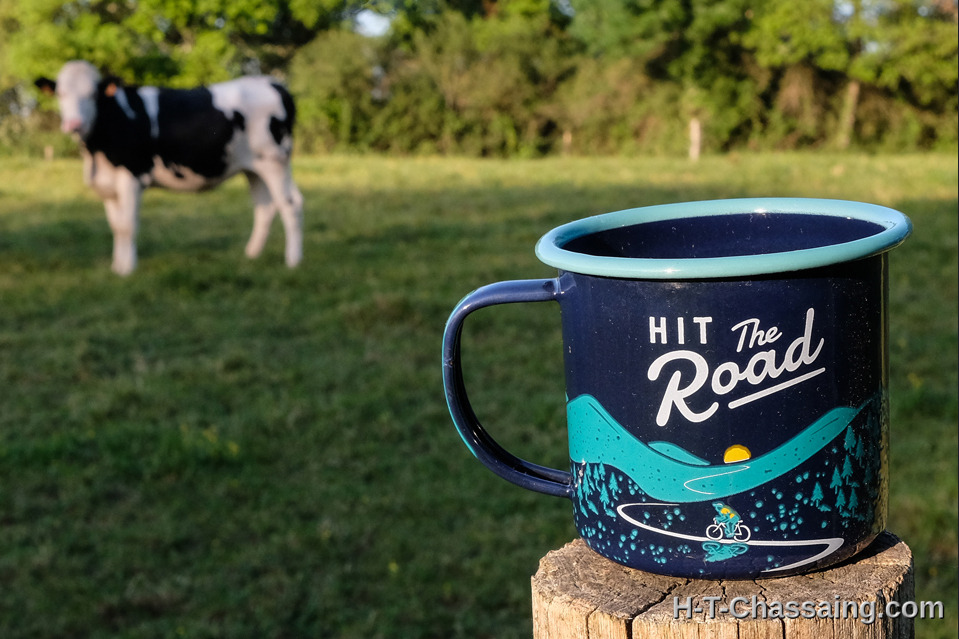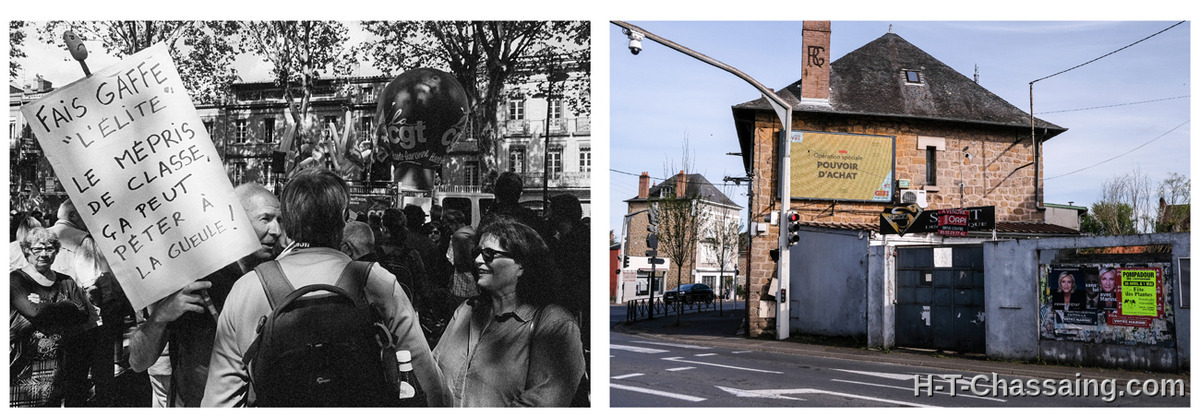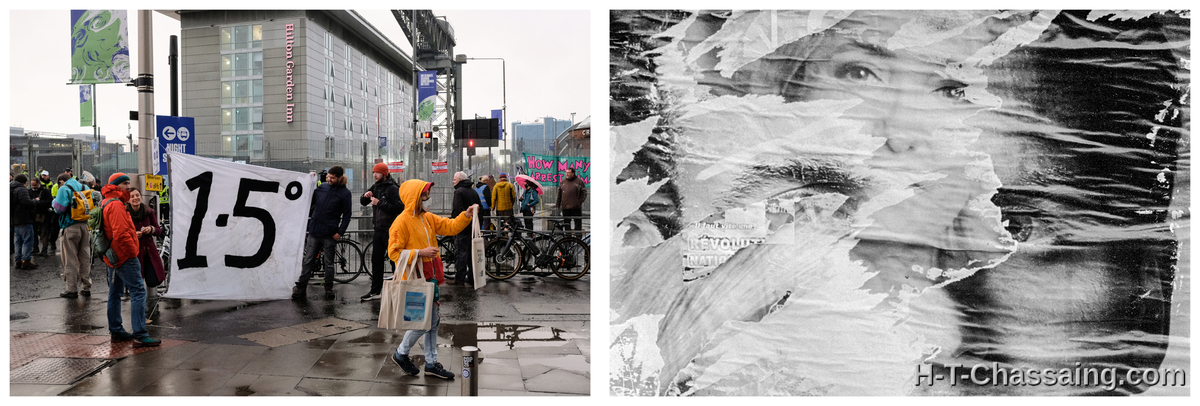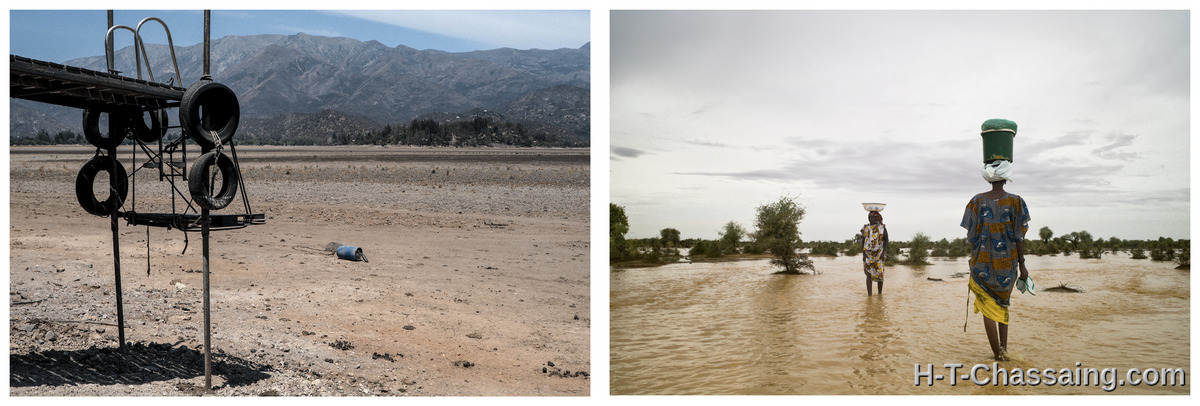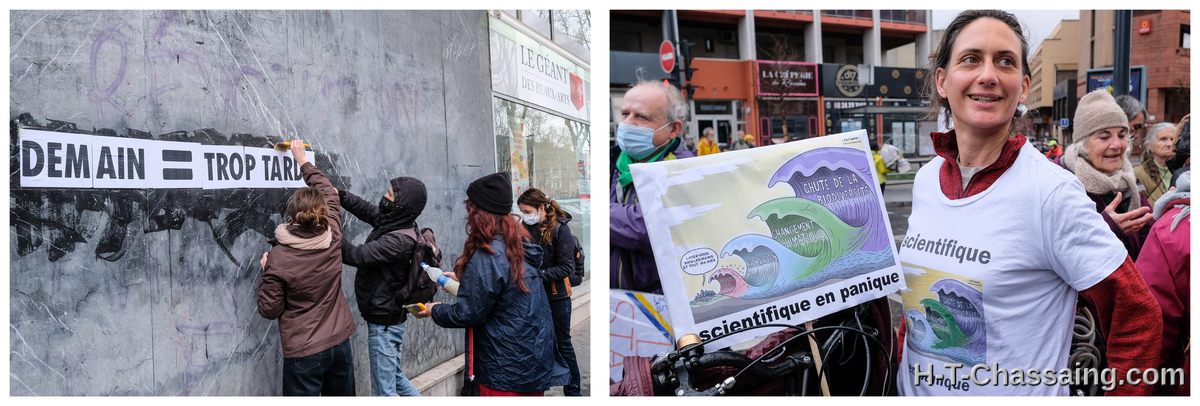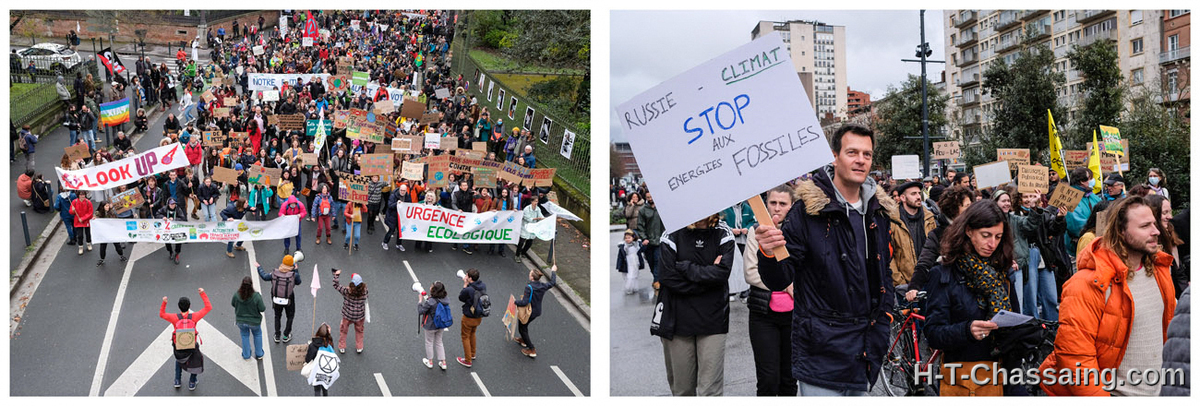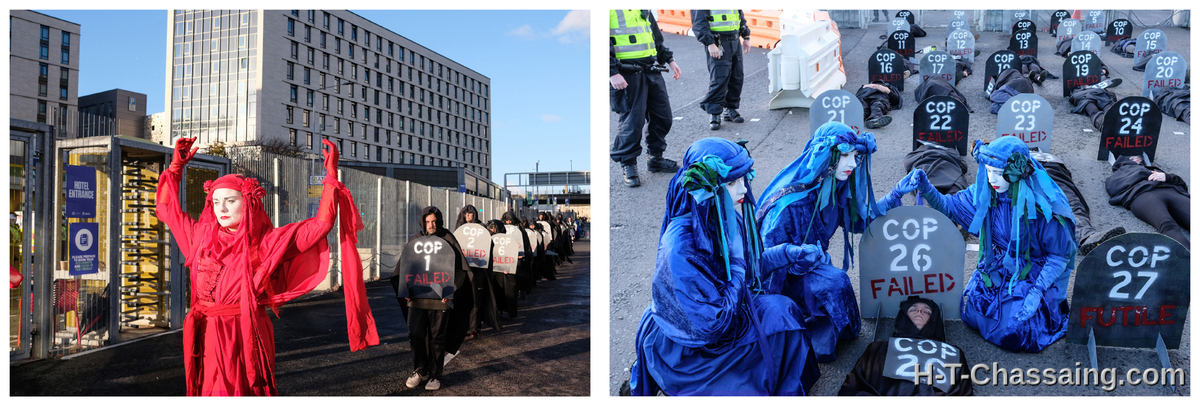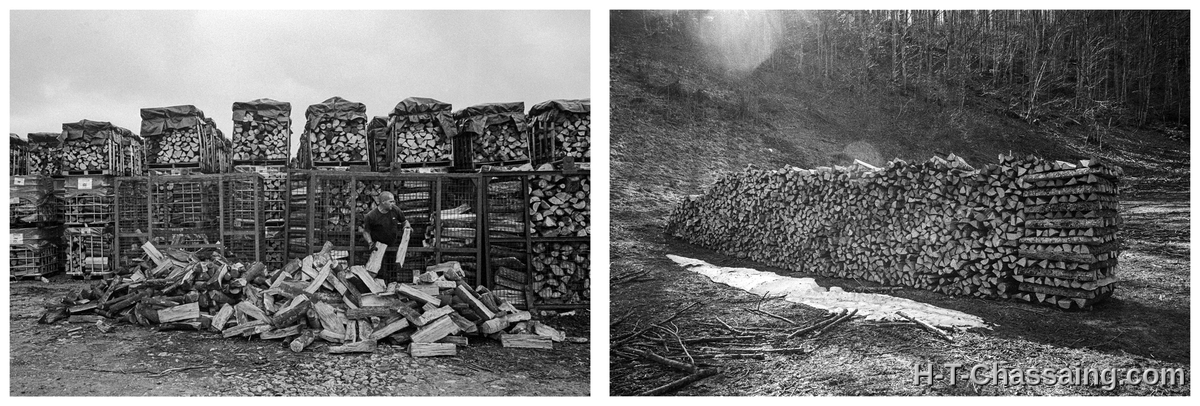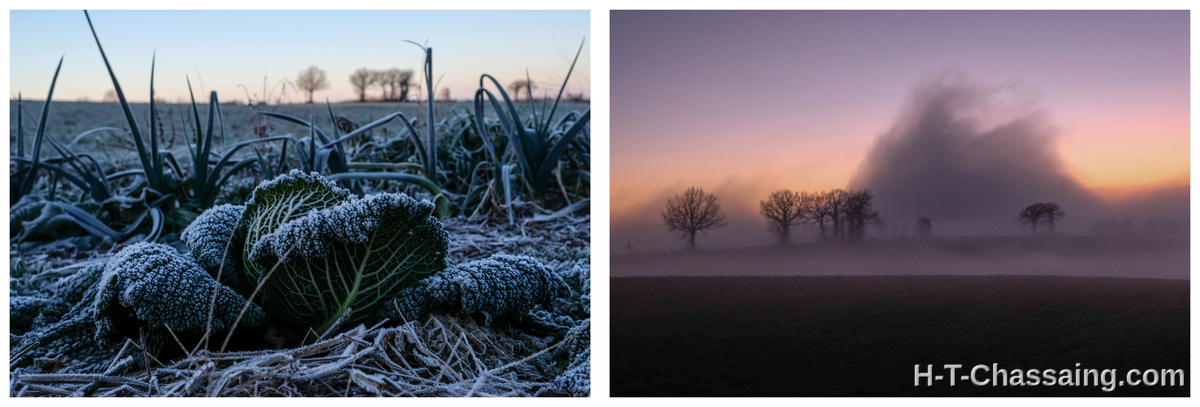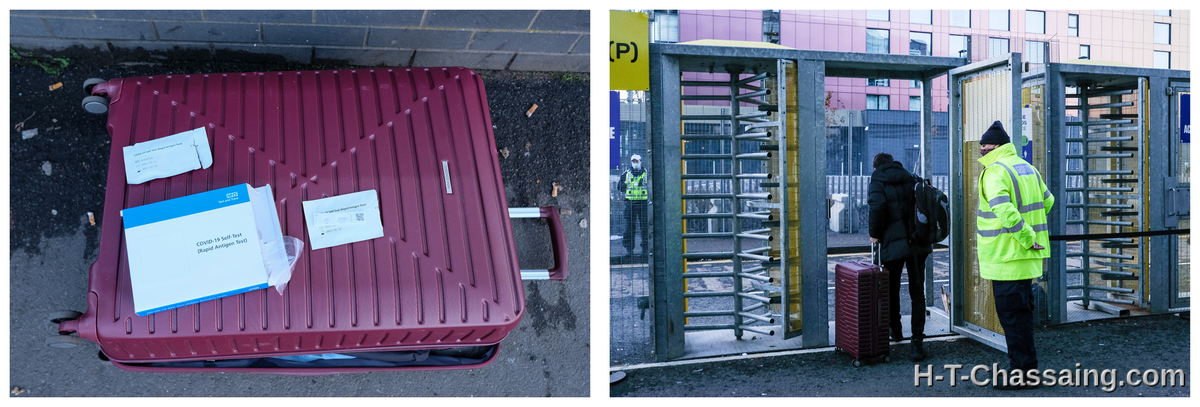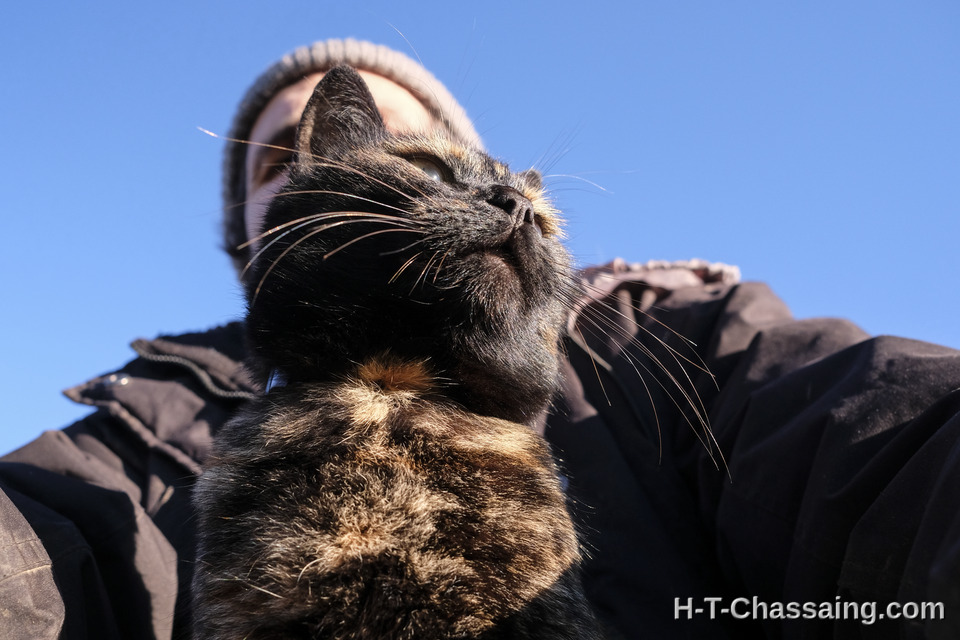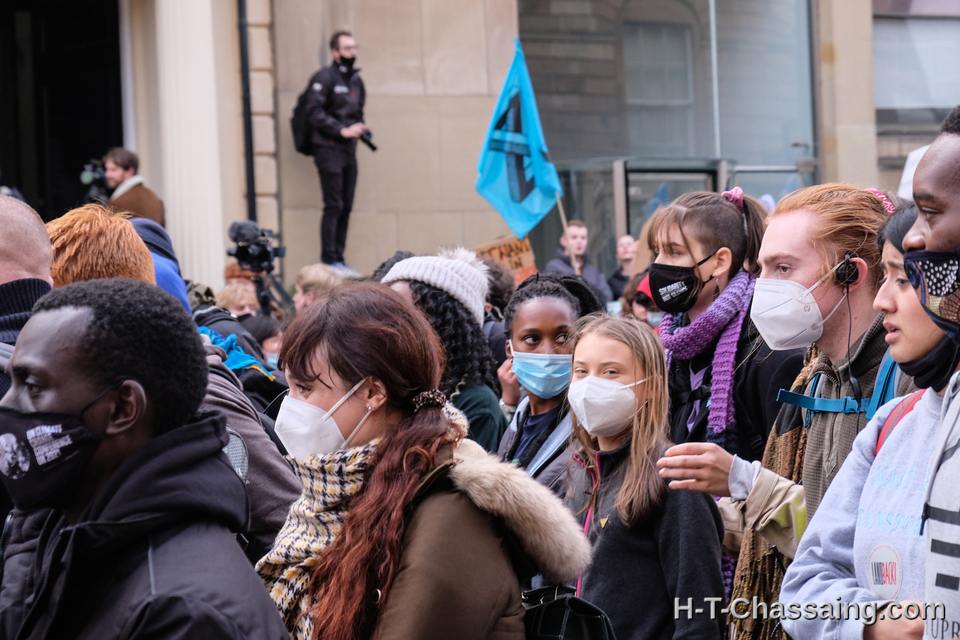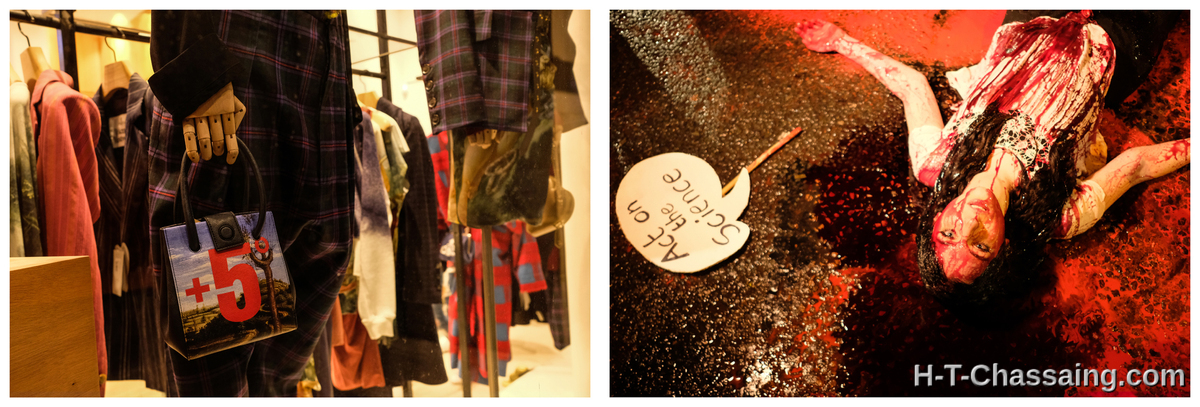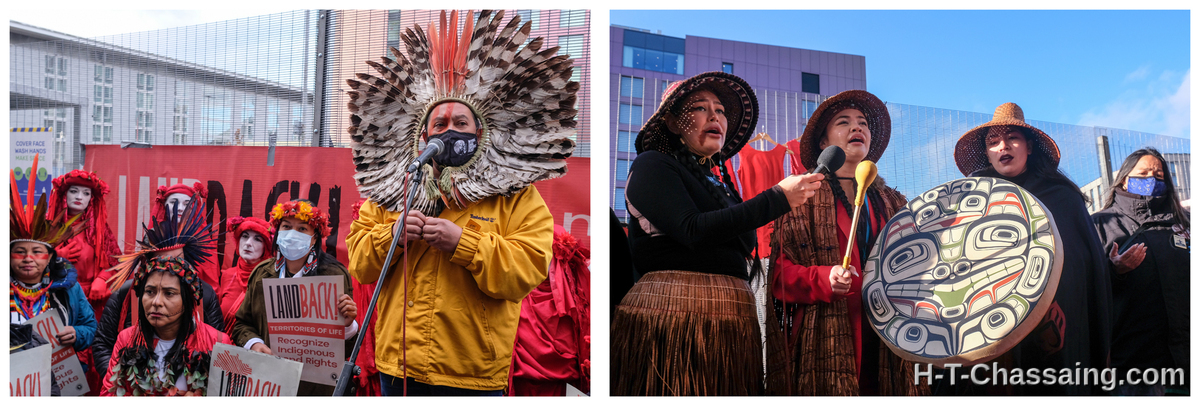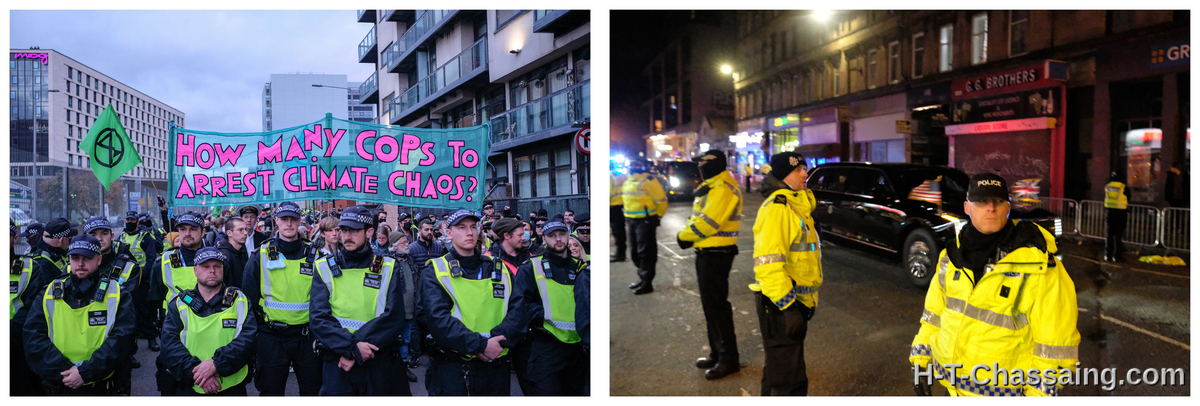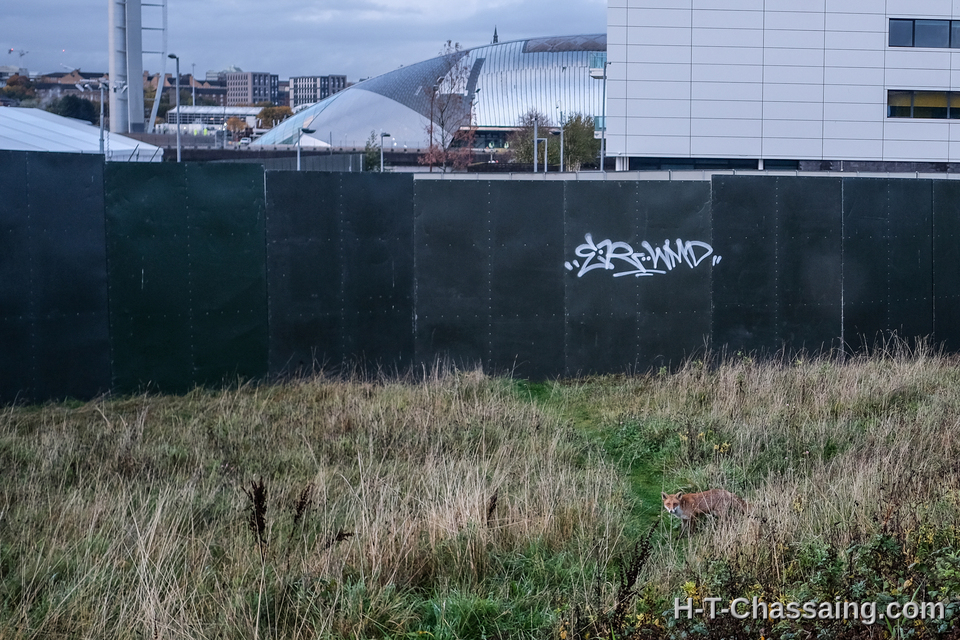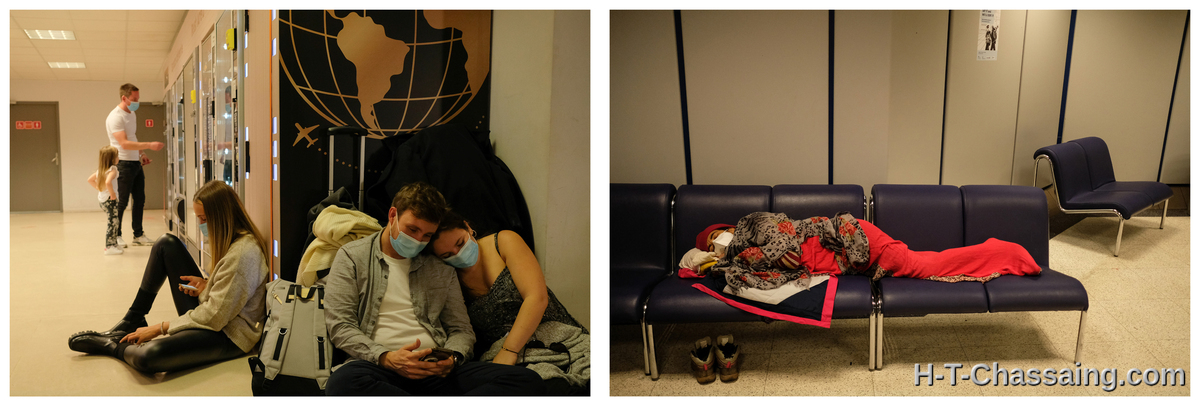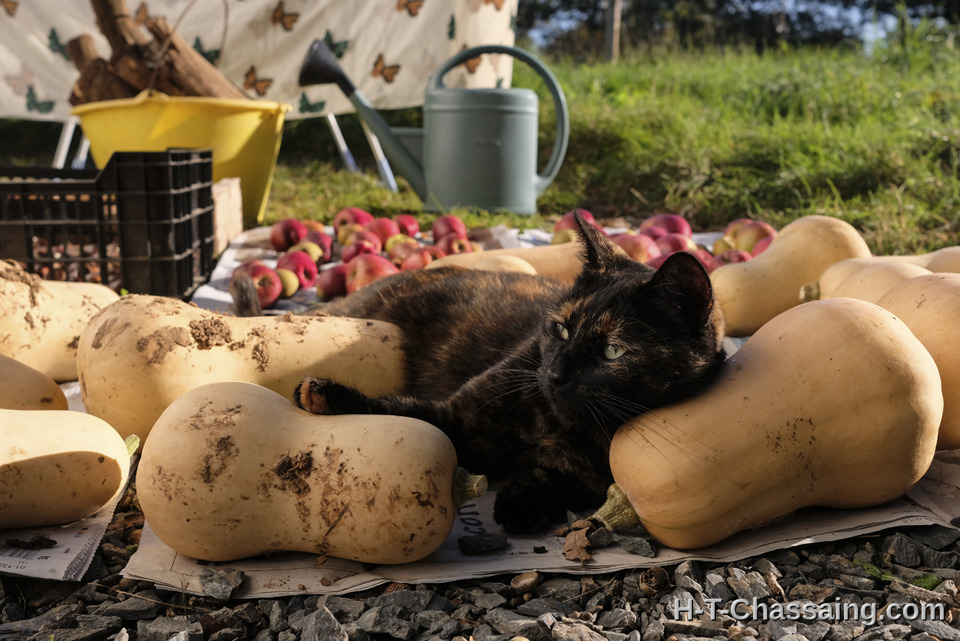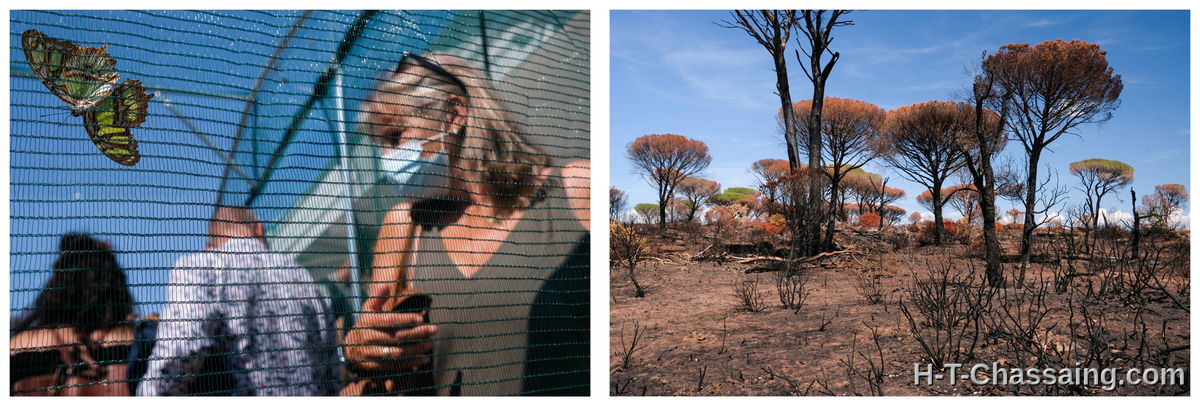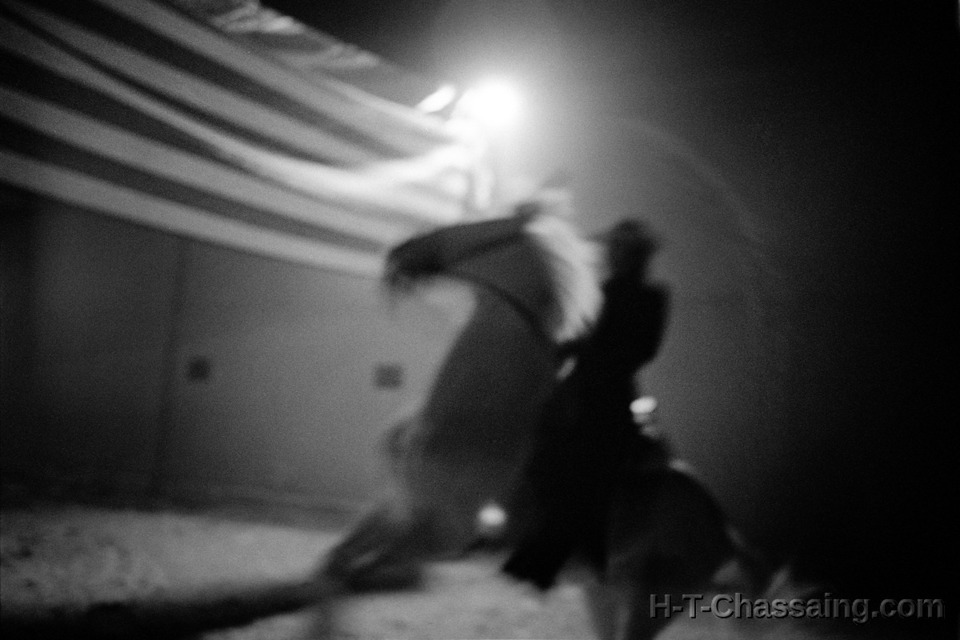From Chatham
Posted by Hélène et Thomas, 2024-07-15
- Hélène studying a map of England on board the ferry making the crossing from Calais to Dover. English Channel - July 9, 2024.
- Hélène disembarking the ferry from Calais. Port of Dover. Kent, UK - July 9, 2024.
Hello,
In the end, we landed in England on July 9, almost a month behind schedule. This was due to the dissolution of the French National Assembly at the beginning of June, but we won't go into that highly political subject again, so as not to raise our blood pressure to 20 again and waste too much time on chatter.
Before arriving in Dover, Kent, we made a point of trying to collect photos related to "migrants" trying to cross the Channel to the UK. Our aim wasn't to produce a full report, due to lack of time, but to have a few photos that were a little symbolic to deal with this (in ellipsis, so to speak) as we couldn't pass by without saying something about it.
First of all, by a combination of rather extraordinary circumstances, we were put in contact with members of the Osmose62 association, which organizes "scrumpings" to help people who have failed in their crossing. Only the weather didn't allow us to document their activities. Maybe on the way back, if we ever go that way again?
So we went off on our own and rode our bikes into a sort of unofficial camp, not far from the port of Calais. We approached some Africans who spoke good English (we didn't ask about their nationality), explained our request directly to them and they helped us without complication. Many thanks to them!
Nearby in a car park, there was an immigrant aid organization (Care4Calais). We asked if we could take a couple of snaps but we were refused.
Since our arrival a few days ago, we've been doing our best to acclimatize. The weather isn't exactly fine. If it weren't for the green leaves on the trees and the flowers everywhere, we'd almost think we were in south-west France in autumn/winter, temperature-wise.
It rains practically every day. Fortunately, since our departure on May 23, we've become adept at navigating between the drops. It's also often windy, which cools us down.
As we left the ferry at Dover, we had two choices: to start our UK loop by heading west (towards Cornwall), or to head for the east coast. The cool, brisk wind encouraged us to choose the second option. For our debut here, it was better to have it at our backs and let ourselves be carried along.
Apart from the climate, we're still struggling with two things (although we're making progress day by day): Firstly, left-hand drive and, above all, the narrowness of the roads means that we often ride on sidewalks when we can't find more bike-friendly roads.
The second point concerns our little struggle, come evening, to find a place for our tent. We had to go over it several times, as people politely referred us to campsites and other Bed and Breakfasts or cottages, which were of course out of our budget.
Of course, in the end, there are always good encounters, like that of a gentleman we met on a port, who invited us to spend the night in his beautiful home. We'll be discreet about this perfect host so as not to embarrass him too much.
Have a good fortnight,
Best regards,
Helen & Tom
- Hélène studying a map of England on board the ferry making the crossing from Calais to Dover. English Channel - July 9, 2024.
- Hélène disembarking the ferry from Calais. Port of Dover. Kent, UK - July 9, 2024.
Hello,
In the end, we landed in England on July 9, almost a month behind schedule. This was due to the dissolution of the French National Assembly at the beginning of June, but we won't go into that highly political subject again, so as not to raise our blood pressure to 20 again and waste too much time on chatter.
Before arriving in Dover, Kent, we made a point of trying to collect photos related to "migrants" trying to cross the Channel to the UK. Our aim wasn't to produce a full report, due to lack of time, but to have a few photos that were a little symbolic to deal with this (in ellipsis, so to speak) as we couldn't pass by without saying something about it.
From Hénin-Beaumont, two hypotheses
Posted by Hélène et Thomas, 2024-06-30
Screen shot of a portion of the map provided by the ERIH (European Route of Industrial Heritage) in the UK. Francy - 30 June 2024
Hello,
There's no doubt that June 9, 2024 (the date of the announcement of the dissolution of the National Assembly) will go down in history.
Much has been said and written of late about President Macron's motivations, which remain (even now) a mystery to many, even in his own camp.
One of the hypotheses we made right away (and which we didn't read or hear in the analyses, but it's true that our news monitoring is less easy on the road than at home) is that he tried to play it like Sanchez and Sunak.
Last year, following municipal and regional elections in May with very poor results for him, the Spanish Prime Minister, Pedro Sanchez, took everyone by surprise by calling early parliamentary elections at the beginning of July. This risky maneuver worked out rather well for him, as we reported in the blog at the time.
This spring, British Prime Minister Rishi Sunak (a little before the French president) also accelerated the electoral calendar, scheduling a general election for July 4.
Although they're not on the same side and their national political contexts are different, these political animals are similar; and it's not unimaginable that the Spaniard's political stunt has given ideas to the other two.
Now, you'll tell us that there's perhaps nothing very clear to think about, and you're probably right. But in the end, this is our little contribution to the beginning of an explanation of this decision and its rapid application (just before the Olympic Games, leaving little room for debate), which this evening could prove just as calamitous for Macron's party, for France and for Europe .
Getting back to us and our little Photo-Cyclo-Tourist adventures: we're doing fine.
As we told you in the previous post, our schedule and itinerary have been turned upside down by the latest events in France, but we've done our utmost to adapt as best we can; the unexpected being part of everyday life for travelers and photographers alike.
To wait for the second round of parliamentary elections (July 7) on French soil, we slowed down our daily mileage. And we've diverted to departments such as Meurthe-et-Moselle, Moselle, Ardennes, Aisne, Nord and Pas-de-Calais. This was in order to continue working on a series (linked to the elections and the extreme right) started over a decade ago now. Today, for example, we're in Hénin-Beaumont, the fiefdom of Marine Le Pen.
We're often asked how we're being received. Well, since we left on May 23, we've been very well received. The day before yesterday, for example, on her birthday, the Miss was treated by our hosts for the evening to a meal of crêpes (savory and sweet) washed down with Champagne!
Thank you Odile, Hubert, Paul, Hélène, Manon and Victorine!
More than twenty years ago, when it came to crossing France in the other direction (on our return from a trip to India), it was a completely different story. In the evening, we were more mistaken for chicken thieves than celebrated, it has to be said.
Our hypothesis on this subject: the TV shows that everyone talks about, such as "J'irai dormir chez vous" or "Nus et culottés", have somehow opened up a lot of people's minds when it comes to welcoming travelers. One day, we'll have to watch an episode of each series to get a better idea.
Just goes to show, nothing is ever lost in this country, and "the media" can even have a positive effect.
Last but not least, what's planned across the Channel (and we get asked for it quite often) is a project on "The First Industrial Revolution".
For this, the map on the ERIH (European Route of Industrial Heritage) website, which we've taken a screenshot of to illustrate this post, will be very useful. Each orange dot indicates things to see related to industrial heritage, and we have every intention, like Pac-Man, of swallowing as many as we can.
But we'll tell you more about all this in July. Unless other events, more or less foreseeable, distract us from our current project...
Have a good fortnight,
Hélène and Thomas
Screen shot of a portion of the map provided by the ERIH (European Route of Industrial Heritage) in the UK. Francy - 30 June 2024
Hello,
There's no doubt that June 9, 2024 (the date of the announcement of the dissolution of the National Assembly) will go down in history.
Much has been said and written of late about President Macron's motivations, which remain (even now) a mystery to many, even in his own camp.
One of the hypotheses we made right away (and which we didn't read or hear in the analyses, but it's true that our news monitoring is less easy on the road than at home) is that he tried to play it like Sanchez and Sunak.
From Verdun
Posted by Hélène et Thomas, 2024-06-15
- Hélène poses in front of the Dom Perignon statue in the courtyard of Maison Moët & Chandon, on the famous Avenue de Champagne. Épernay. La Marne, Grand Est. France - June 9, 2024.
- Hélène in the courtyard of the Centre Mondial de la Paix in Verdun. On the panel: "After the war, the republic: the Weimar Republic, Germany's first republic". In the background, photos of the war in Ukraine hang on all the walls: "Kiev: Report of a day: March 8, 2022". Verdun. La Meuse, Grand Est. France - June 14, 2024.
Hello,
I'm sure you weren't expecting us to write this post from Verdun, and neither were we. It should have been sent from the ferry to Dover.
Since our last message from the volcanoes of the Auvergne, we've done everything we could to make it happen. Despite the occasional bout of bad weather, we made good progress through Allier, Nièvre, Yonne, Champagne (Aube and Marne) with the idea of getting to the UK as quickly as possible to get underway with our documentary project across the Channel.
And then, as political commentators often say on TV when they're telling a story: "Patatras".
On June 9, when we had just spent our first 1,000 kilometers on the Avenue de Champagne (one of the richest in the world, we were told several times), in Épernay near Reims to be exact, the disrupter-in-chief (E-Macron) announced in the evening the early dissolution of the National Assembly with new legislative elections for June 30 and July 7.
For those of you who follow us closely, you'll know that since 2012 we've been working on a long-term study of elections in France, focusing on the far right.
So what can we do? Stick to the plan and board a boat in Calais around June 15? Or wait and continue the series started over a decade ago? We spent a good 48 hours stunned, worried, irritated (we'll skip the political considerations) and stalled. In the end, we decided to wait in France, at least until June 30, to continue the work in progress...
That's why we changed direction to the east, to the Ardennes in particular, before making our way quietly up into the Nord-Pas-de-Calais region, covering former steel and mining areas where the FN-RN has long had a strong foothold.
We should also point out that Charleville-Mézières is often cited when people talk about the "diagonal of emptiness or low density" (see one of the previous posts).
Let's hope that the 15 days "lost" to the UK project won't be too damaging, especially at the end of November when the cold weather may return.
But for now, tomorrow (Saturday, June 15) we'll be in Metz. This weekend all over the country demonstrations against the extreme right are being organized and we'll be photographing one there.
Finally, 2 little anecdotes:
- In the Allier region of France, as Toto waits for the Miss to put on her pilgrim's jacket for the umpteenth time today, an ordinary car pulls up to a crossroads in the middle of the countryside, while it's raining cats and dogs. A beaming man in his sixties opens the window:
- It's raining, isn't it?
- Indeed, it's exquisite weather.
- Well, we're not in London yet, but we will be soon.
- We should be there soon if we keep up this pace...
- Not far from Auxerre, a motorhome couple welcomed us into their garden. In the morning, as our tent finished drying on a clothesline, we had breakfast with our host (Madame had left early for work). To make our toast even better, he brought out a jar of cherry jam, saying: "Guy Roux's jam".
The day before, they had told us that they had recently been to Aveyron. And at a market, understanding that the couple were from Auxerre, the shopkeeper (if we understood him correctly) handed them the pot: "It's for Guy Roux, when you see him please give it to him".
The redoubtable AJ Auxerre soccer coach, though elderly, is still a figure locally (where we're told it's not uncommon to see him in the city center in his raincoat and cap), and even on a national level, we have to believe. It was then we learned that AJ Auxerre and AS Saint-Etienne (another club with a glorious past) were moving up to D1 this year.
Good luck to them next season, and happy fortnight to you!
Hélène et Thomas
- Hélène poses in front of the Dom Perignon statue in the courtyard of Maison Moët & Chandon, on the famous Avenue de Champagne. Épernay. La Marne, Grand Est. France - June 9, 2024.
- Hélène in the courtyard of the Centre Mondial de la Paix in Verdun. On the panel: "After the war, the republic: the Weimar Republic, Germany's first republic". In the background, photos of the war in Ukraine hang on all the walls: "Kiev: Report of a day: March 8, 2022". Verdun. La Meuse, Grand Est. France - June 14, 2024.
Hello,
I'm sure you weren't expecting us to write this post from Verdun, and neither were we. It should have been sent from the ferry to Dover.
The Volcanos of Auvergne
Posted by Hélène et Thomas, 2024-06-01
Picnic near the Salins waterfall (not far from Salers) in the Parc naturel des Volcans d'Auvergne. On the menu, food given by the family for energy: a good portion of Cantal (we are on the "Route des Fromages AOP d'Auvergne") and a blueberry cake. Off-camera on the table, Dame Fabienne's delicious pounti (a local specialty discovered thanks to her during the years of high school) is thawing in the sun on top of the yellow jersey to prevent it from flying away. Cantal, Auvergne. France - May 28, 2024.
View of the Tuilière and Sanadoire rocks (not far from Orcival) in the Parc naturel régional des Volcans d'Auvergne. Puy de Dôme, Auvergne. France - May 30, 2024
Hello,
Since our departure on Thursday May 23, we've already seen quite a bit of the country. First the north of Tarn, then Aveyron, a corner of Lot, Cantal, a corner of Corrèze and finally Puy de Dôme.
The first stages were very comfortable with accommodation in the evening with family (cousin, nephew and sister) and the parents of a friend of the Miss.
For our first two nights without an address we did very well. Guillaume, a friendly dairy farmer, allowed us to pitch our tent in a barn where he stores straw bales. In addition to our self-inflating mattresses, we also found a nice, soft carpet there.
And the next day, we bivouacked at the farm in a typical old Auvergne barn, with the sand underneath, the steep roof, the stone walls, the big wooden beams and here again bales, but of hay. Here too the inhabitants of the hamlet were very friendly. And in the early morning we discussed cycling and Formula 1, among other things, over a good breakfast in a kitchen well heated by a wood fire.
The weather wasn't too bad with us for our first week on the road. Only a few showers, a rainy night (but we were in the barn!), a little fog but not too much, no wind and overall pleasant temperatures.
Tonight, we're still in the Parc National des Volcans d'Auvergne. When we wake up tomorrow, we'll have the Puy de Dôme in our sights.
It wasn't really planned, but as we were travelling not far away—to document a lithium mine project in Echassières in order to make a link with the little report we did in the Atacama desert, north of Chile—it was impossible for us not to pass through the Muratian lands: la Tour d'Auvergne, la Bourboule, le Mont Dore, le col de La Croix Morand, le lac de Guéry, le puy de Sancy, les roches Tuilière et Sanadoire, Orcival et sa basilique, la N89 (et ses travaux! ).
On Saturday May 25, a tribute concert to Jean-Louis Murat was held at the Coopérative de Mai in Clermont-Ferrand, one year to the day after his sudden death. The apt title of the evening was: “Te garder près de nous” (“Keeping you close to us”), and press reports were full of praise (read here).
At one point, we toyed with the idea of going there. Only the venue's 1,500 seats had been sold out; and then, as is often the case, we were very late in relation to our departure date.
In any case, crossing these landscapes for the first time, long fantasized about by compulsively listening to his music and lyrics, was already very emotional.
Thanks again Jean-Louis, and a big Bravo for your work!
Hélène and Thomas
PS: A JLM weekend is planned for June, again in Clermont-Ferrand. Here is the program.
Finally, three books dedicated to the Bard of Auvergne are coming out. Since we haven't read any of them we can't say much about them.
Picnic near the Salins waterfall (not far from Salers) in the Parc naturel des Volcans d'Auvergne. On the menu, food given by the family for energy: a good portion of Cantal (we are on the "Route des Fromages AOP d'Auvergne") and a blueberry cake. Off-camera on the table, Dame Fabienne's delicious pounti (a local specialty discovered thanks to her during the years of high school) is thawing in the sun on top of the yellow jersey to prevent it from flying away. Cantal, Auvergne. France - May 28, 2024.
View of the Tuilière and Sanadoire rocks (not far from Orcival) in the Parc naturel régional des Volcans d'Auvergne. Puy de Dôme, Auvergne. France - May 30, 2024
Bikes to go!
Posted by Hélène et Thomas, 2024-05-15
- In the Cuban bike shop "Bikes to go", Thomas looks at the assembly and fitting of Hélène's bike. Miami, Florida. USA - 2000.
- The team from the Cuban bike shop "Bikes to go" poses with us and the brand new bikes they've just assembled and equipped for us. Miami, Florida. USA - 2000.
Almost ten years later, Thomas came back to Miami to do the reports that you can find on this site (Agriculture and the economic crisis, seen from Florida). At the bike shop, they remembered us and the photos we'd taken very well and were keen to have his bike serviced.
Hello, hello,
As you can see from the photos in the diptych, taken over 20 years ago in Florida (see previous post), we're on our way out.
In 3 or 4 days' time, we'll be setting off. Before boarding a ferry in Calais, we'll have a good thousand kilometres to cover on the roads of France.
We'll be taking the 'diagonal of the void', or rather… the 'diagonal of low density', to tackle a new long-term report that we've had in mind for some time.
Although we've got the hang of it by now, the preparations for leaving for a few months are no picnic: papers to put in order, tidying and cleaning, repair our camping equipment, the garden (we'd love to have some vegetables when we get back), medical check-ups, goodbyes to family and friends, etc.
Lately we've been doing a bit of research into what we'll be documenting in the UK and Ireland, but nothing more than that. It's always nicer to let the journey make itself up as it goes along.
Everything went relatively smoothly this time. We often played the new album by Liverpool musician John Canning Yates: perfect for keeping us focused and relaxed.
A good fortnight to you!
Hélène and Thomas
- In the Cuban bike shop "Bikes to go", Thomas looks at the assembly and fitting of Hélène's bike. Miami, Florida. USA - 2000.
- The team from the Cuban bike shop "Bikes to go" poses with us and the brand new bikes they've just assembled and equipped for us. Miami, Florida. USA - 2000.
Almost ten years later, Thomas came back to Miami to do the reports that you can find on this site (Agriculture and the economic crisis, seen from Florida). At the bike shop, they remembered us and the photos we'd taken very well and were keen to have his bike serviced.
Voyage, voyage !
Posted by Hélène et Thomas, 2024-05-01
- Hélène among the mountain lakes, on the slow climb from Tabay to Pico Bolivar, 4,978 metres above sea level. Not far from Mérida. State of Mérida. Venezuela - 1999.
- Departure from Miami, the Miss on the first day of the bike trip. She waits for the movable bridge to descend horizontally before continuing forward. Miami, Florida. USA - 2000.
Hello,
A fortnight ago, in this blog, we told you in broad strokes about our beginnings in photography. Today, for those who don't know the story, we're going to tell you about our first rides as bike travellers.
Here too, we have to go back to the end of the previous century: we had gone to Venezuela to visit Thierry, a great Belgian friend of the Miss who was working there. For about 3 months, we criss-crossed this Latin American country.
Among the highlights of the trip, apart from the good times we had with our friends and the people we met, were two climbs: La Travesia to Pico Bolivar, in the extension of the Andes mountain range, and then - obviously - the one on Mount Roraima, a magical tepuy on the border with Brazil and Guyana. Both of these expeditions required us to walk for a full week each time, completely self-sufficient in food.
On the other hand, it was hard for us to depend on buses and occasionally taxis to get around. Spending nights waiting for connections at bus stations or not being able to stop when we wanted to ended up getting us really fed up.
Near a lake in the Los Llanos region where we were stranded, we decided that enough was enough of the hassle with the coaches (which were expensive in the long run). We were going to follow the example of our mentor Thierry.
Before settling in Mérida for a while (in the north of Venezuela), he had cycled across the American continent, from Alaska to Tierra del Fuego. We couldn't have wished for a better coach.
First of all, he advised us against buying bikes here. At the time, we wouldn't have been able to find them, even in Caracas, or else at exorbitant prices (because they were imported from the USA).
Better to take a cheap plane to Miami, buy the bikes there and then come back with them and look for 'new instructions'. Florida has the advantage of being flat, so there's no better place to start before cycling on to Mexico.
So we sold our rucksacks to finance the jump over the Caribbean Sea. We bought our bikes in a Cuban cycle shop: the aptly named 'Bikes to Go'. That was it, we were ready to start our cycling career!
At the start, we were very stressed about where to put our tent in the evening (especially as we were passing through some very wealthy residential areas such as Palm Beach). But we quickly relaxed, realising that one of the coach's words always came true: "Don't worry. The right person exists, you just have to find her."
In Daytona Beach, we rode into town at the same time as thousands of bikers, there for the famous Daytona Beach Bike Week. At the traffic lights, it was funny to notice the sidelong glances of the bikers (often on Harley Davidsons) at our brand new bikes.
Unfortunately, after covering our first thousand kilometres, we were forced to stop in Tallahassee (the capital of Florida). A death in the family brought us back home.
After that, there was talk for a while of returning to where we had left off, but finally, in 2001, we set off again from home, heading for India.
In a fortnight's time, we plan to hit the road again (with one of the two bikes we bought in Miami!). Heading north this time, for the United Kingdom. This will be the second leg of our planned tour of Europe.
All the photos from the first stage in the Iberian Peninsula are now sorted and captioned. After our return, around November, you'll be able to see them on the new site, which is currently being prepared by our friend Jim.
These days, there are many accounts of cyclists who have travelled around the world. Even if we've only read one, we're not afraid to say that we've read the best of the best at Thierry's house in Venezuela!
It's that of the Hervés: Claude and Françoise who left in the 80s for a three-year trip, which lasted 14 years in the end. After 7 years, they had a little girl and continued their journey with her.
We've just ordered their book because we'll be happy to read it again. Its title: "Le Tour du Monde à Vélo".
Have a good fortnight!
Hélène and Thomas
PS: We recently listened to 4 radio programmes on travel in literature, from Homer to Jean-Paul Sartre.
- Did Ulysses have a good journey?
- Baudelaire, Segalen, Michaux: inner journeys
- Exoticism, orientalism, clichés and condescension
- Travelling without seeing
- Hélène among the mountain lakes, on the slow climb from Tabay to Pico Bolivar, 4,978 metres above sea level. Not far from Mérida. State of Mérida. Venezuela - 1999.
- Departure from Miami, the Miss on the first day of the bike trip. She waits for the movable bridge to descend horizontally before continuing forward. Miami, Florida. USA - 2000.
Hello,
A fortnight ago, in this blog, we told you in broad strokes about our beginnings in photography. Today, for those who don't know the story, we're going to tell you about our first rides as bike travellers.
Here too, we have to go back to the end of the previous century: we had gone to Venezuela to visit Thierry, a great Belgian friend of the Miss who was working there. For about 3 months, we criss-crossed this Latin American country.
Photographs from the UK
Posted by Hélène et Thomas, 2024-04-15
Photos taken on the streets of Glasgow. We were there to document COP 26. These are the only two outdoor images we took that are not directly related to this climate protection event.
- Entrance of a wedding party into a church.
- Early this morning, this gentleman is celebrating his birthday on the phone.
Glasgow, Scotland. United Kingdom - October-November 2021.
Hello,
The first two Brits we came across on our photographic journey were Martin Parr and Donovan Wylie. It was in the last millennium, during yet another sleepless night. We'd stumbled across a TV re-run of a fascinating documentary about Magnum, the famous photographic press agency (unknown to us at the time).
This, we think, is where our real interest in photography began. When we saw the 'gentlemen' Parr and Wylie in the field with other photographers from the agency, we said to ourselves: "Well, maybe we could do that. You don't need the kind of crazy resources you need for film." Without wishing to sound too pretentious or grandiloquent, it was like a wake-up call in the darkness of our depressed young souls.
When we got back from our bike trip to India, a journey of initiation that saw Toto try his hand at photography, we consulted a lot of photo books, both at our local media library and at the Château d'Eau gallery in Toulouse.
That's how we discovered the work of great English photographers such as Don McCullin, Larry Burrows and Philip Jones Griffith. Around the same time, we went to the annual Visa pour l'image festival in Perpignan. It was there that we saw the exhibitions of the Anglo-Australian Philip Blenkinsop. It was a golden period for him, his vision of Asia met with well-deserved recognition from the public and professionals in the trade. Since then, apart from teaching, he seems to have taken a back seat and, like Don McCullin after some very tough reporting, has turned to landscape photography.
While we've been to Visa several times, we've only been to the Rencontres de la photographie d'Arles once. We don't remember admiring the work of an English photographer there, but we were able to listen to a lecture by the admirable French philosopher Bernard Stiegler (who has sadly passed away). And Toto was able to submit his photos to Niall O'Leary of the London agency Millenium. Here are the photos he had chosen. It was one of the first times he'd done this (among his dozen or so attempts at presenting portfolios) and, to his great surprise, his interviewer offered to send us a contract! He didn't need to know who, what or what it was. And not the usual: "Your photos are good, but...".
Here are some images from the Millenium agency we noticed recently: those of Simon Roberts, Alex Currie and Chanel Irvine.
Another valuable British agency is Panos Pictures. It offers the kind of reports that we can make.
For lack of time, we now follow photographic activity across the Channel from far and wide. However, we often check to see if Mark Power has added a new series to his site. This one also served as a model for us when our friend Jim and we had to rebuild our site during the Covid-19 pandemic. Among the active British members of the Magnum photo cooperative, we have a soft spot for him.
As for the other British photographers we follow or have followed (like Simon Norfolk and Andrew Testa who is from the Panos agency mentioned above, or Peter Dench and Toby Smith from the Getty Reportage agency), there is of course John Davies. We too consider his work on urban and rural landscapes to be of the highest quality.
Finally, thanks to Martin Parr (again), we have recently discovered the very fine work of Chris Killip. To conclude, we would say that Great Britain, like France, has a great history with photography. Needless to say, it was in these two countries that the medium was born, in the first half of the 19th century.
Let's hope that during our future trip there, as cyclist-photographers, we'll find a good welcome for our tent and that people will allow us to take photos quite easily.
On the latter point, we're pretty confident. During our coverage of COP 26 in Glasgow, hardly anyone gave us any trouble when we were photographing, unlike in France or other countries we've visited.
Have a good fortnight,
Hélène and Thomas
PS: On rereading this post, we realised that, with one exception, there were no women photographers on this list. If you have any ideas for adding to the list, please let us know. We'll be happy to discover other works for our next trip.
Photos taken on the streets of Glasgow. We were there to document COP 26. These are the only two outdoor images we took that are not directly related to this climate protection event.
- Entrance of a wedding party into a church.
- Early this morning, this gentleman is celebrating his birthday on the phone.
Glasgow, Scotland. United Kingdom - October-November 2021.
Hello,
The first two Brits we came across on our photographic journey were Martin Parr and Donovan Wylie. It was in the last millennium, during yet another sleepless night. We'd stumbled across a TV re-run of a fascinating documentary about Magnum, the famous photographic press agency (unknown to us at the time).
A lazy post (more or less) #1
Posted by Hélène et Thomas, 2024-03-31
South Korean and Spanish pilgrims on the Pilgrim's Way to Santiago de Compostela. Castilla y León. Spain - December 2023.
Hello,
It's Easter weekend, we're still playing it cool! The day before yesterday we went to see a friend's exhibition, and tomorrow we've got the family.
As we've had our fill of writing lately, we're not going to overdo it for today's post. Captioning 600 images in a fairly precise way is no picnic. Of course, it's nothing like our Santiago pilgrims 'in Santiags'. We don't end up in dormitories in the evening, with blisters on our feet, but still!
When you've got a hefty quota of captions to write every day, which sometimes requires a fair amount of research, after 3 or 4 days in a row at a good pace, you start to whip yourself into shape to get on with it and not give up.
To distract ourselves a bit, we continued our bike training (see previous post - record now down to 50 minutes!), we went to get some 'responchous' (for foreigners, a plant similar to wild asparagus), we planted some seedlings and then above all, with our friend Jim from Vancouver, we prepared the foundations for the new website that we plan to launch at the end of 2024 or the beginning of 2025.
It's a big job, given the number of galleries, photos and texts already online, so it's best to start in the right direction from the outset! Following the signs can help you avoid getting too lost in the digital pampas.
Although we haven't been able to do our usual little information watch lately, due to lack of time, here are a few links to round things off.
Musical first, with contemporary Irish music that we discovered recently while preparing our trip to the UK and Ireland (here, here and here!).
Then, in the field of ideas, with Heinz Wisman (philosopher) and Tim Jackson (economist).
And finally a debate on 'the debt wall' and 'the ecological transition'.
Have a good fortnight !
Hélène et Thomas
South Korean and Spanish pilgrims on the Pilgrim's Way to Santiago de Compostela. Castilla y León. Spain - December 2023.
Hello,
It's Easter weekend, we're still playing it cool! The day before yesterday we went to see a friend's exhibition, and tomorrow we've got the family.
As we've had our fill of writing lately, we're not going to overdo it for today's post. Captioning 600 images in a fairly precise way is no picnic. Of course, it's nothing like our Santiago pilgrims 'in Santiags'. We don't end up in dormitories in the evening, with blisters on our feet, but still!
When you've got a hefty quota of captions to write every day, which sometimes requires a fair amount of research, after 3 or 4 days in a row at a good pace, you start to whip yourself into shape to get on with it and not give up.
Work in progress #5
Posted by Hélène et Thomas, 2024-03-14
Sau dam on the River Ter. Vilanova de Sau. Catalonia. Spain - September 2023.
Hello,
It's rare enough to be worth mentioning: at the beginning of January we had planned that by mid-March all the diptychs from the last photographic campaign in the Iberian Peninsula would be chosen and mounted. Today, the 14th, we can say, like many of our contemporaries: "That's done!
Starting tomorrow we're going to speed up the caption-writing process so that we can leave for the UK around 15 May. By then we'll have completed all the files for the first leg of our planned tour of Europe. In the end, there will be around 700 images to add to the new site when the time comes. New site!? Oh yes, since our return, with Jim and Elwynn (a new sidekick) we have been working on making the current site easier for us to use. For example, when it comes to updating this blog or uploading new photo galleries.
It's true that we've been taking refuge in work a lot lately because we're too far behind. We're thinking of the thousands of photos from the Tour de France still waiting on our desk. There are also the plans for a European tour and a world tour that we've been dreaming of! But let's be honest, it's also to protect ourselves from the ambient air, which doesn't exactly encourage carefree behaviour and the much-vaunted "carpe diem".
The news coming out of Gaza, Ukraine, Russia, the United States, Haiti, etc. is enough to send any of the world's cheerleaders into catatonia if they were really paying attention.
We're not going to go any further into these areas because that's not the purpose of this blog, which is about our documentary work. But all the same! Have all these 'issues' been 'managed' over time with all the seriousness and involvement they should have required by our respective leaders and the international community, or at least what is left of it? To a lesser extent, have we, civil society, exerted enough pressure to ensure that this happens?
During our New Year's greetings we were in contact with environmentalist friends, most of whom were in low spirits. The cause of climate and biodiversity, which should be at the top of the agenda, is in danger of being sidelined by all these tragedies, at the very time when we should be urged to take strong action, as the scientists keep hammering at us.
Added to this, in the case of France, is the structural weakness of its economy, which could, depending on the choices made, severely limit our ability to adapt to climate change. Here is a radio programme on the new annual public report from the Court of Auditors on the subject.
We recently read that "Europe is the fastest-warming continent", as this recently published study reminds us. The diptych illustrating this post was made at the Spanish Sau dam. The green color reflects the eutrophication of the water.
This reservoir is often in the news because the village of Sant Romà de Sau, which was swallowed up when the dam was built in 1962, had a church that appears and disappears according to the water level. This church has become one of the symbols of the drought that Spain has been experiencing for 3 years now.
In one media report, Catholics in Barcelona not long ago organised a procession to pray for rain. And its journey through the city had to be interrupted at times, due to showers!
All joking aside, after a particularly hot January, the Catalan authorities had to declare a state of emergency and reinforce the water restriction measures already in place.
To finish on a less sombre note, we've been back on our bikes for the last month or so in order to get back in the almost Olympic shape we were in at the end of December when we returned from our trip.
In his youth, Toto thinks he remembers reading in the Tennis de France magazine to which he subscribed that Connors and Lendl (that's not getting any younger!) had rather peculiar training methods. Jimmy said that 5 minutes of skipping a day was enough to keep him at the top of his game, and for Ivan it was an hour of cycling at top speed around his home.
Although there may have been some exaggeration on both sides, it was a completely different time, when physical performance of champions wasn't as advanced as it is today.
So, once every 2 days, we put ourselves on a Lendl diet. From our home we can do a loop with descents in the woods, ride on a plateau with a beautiful view and climb a tough hill of almost 3 km. When we're in sports mode, we manage to do it in 54 minutes (a record to beat!) and otherwise in over an hour in contemplative mode.
When the weather's better we'll try to move up to daily cycling. The good thing about cycling is that it does as much for your body as it does for your soul. Getting back out on the road in May with a bit of a kick would be a good thing!
Have a good fortnight,
Hélène and Thomas
Sau dam on the River Ter. Vilanova de Sau. Catalonia. Spain - September 2023.
Hello,
It's rare enough to be worth mentioning: at the beginning of January we had planned that by mid-March all the diptychs from the last photographic campaign in the Iberian Peninsula would be chosen and mounted. Today, the 14th, we can say, like many of our contemporaries: "That's done!
Starting tomorrow we're going to speed up the caption-writing process so that we can leave for the UK around 15 May. By then we'll have completed all the files for the first leg of our planned tour of Europe. In the end, there will be around 700 images to add to the new site when the time comes. New site!? Oh yes, since our return, with Jim and Elwynn (a new sidekick) we have been working on making the current site easier for us to use. For example, when it comes to updating this blog or uploading new photo galleries.
Dufumier!
Posted by Hélène et Thomas, 2024-03-02
Bell and banner waved during the demonstration by a thousand European farmers outside the European Commission's offices in Brussels in 2015. Brussels. Belgium - 7 September 2015.
Here joined in the mobilisation farmers from Coordination rurale, a French farming union that will be very active in the farming revolt that France is experiencing at the start of 2024.
Here is a press article about this demonstration in Brussels where farmers had turned out in numbers to make their anger heard, already.
Hello,
We imagine that no one is unaware of the agricultural "revolt" that is currently sweeping Europe and France. A lot of media (how many skips of dumped manure will have been filmed?) and political time has been devoted to it (while, incidentally, the severe crisis that the sector has been experiencing for years generally flies under the radar).
As a matter of urgency, the government has provided answers that have not restored calm (to say the least) to the farming world ahead of the opening of the Salon International de l'Agriculture (SIA), at Paris Expo Porte de Versailles. In fact, they didn't really convince and even raise many concerns, particularly environmental ones, as you can read here and here for example.
In this dark and very tense atmosphere, with Marine Le Pen and Jordan Bardella of the RN who appear to be more than just lying in ambush, it was a pleasure to see again recently, in a prime-time TV programme, Marc Dufumier (agronomist and teacher-researcher specialising in agrarian systems and their evolution).
We met him in 2011 in Labège, near Toulouse. After spending a whole year documenting work on a small family dairy farm, and going for the first time to the Salon de l'Agriculture (where several hundred European dairy farmers had gathered for a "Funeral March" at the call of the APLI and the EMB) with a farmer from our region (see the subject on our website), we were preparing, at the time, to do a cycling tour of France with the idea of doing some reporting, mainly on energy and agriculture.
So of course, when we heard that a conference was being organised in Labège with Pierre Rabhi, Lydia and Claude Bourguignon, Guy Kastler and Marc Dufumier, we didn't hesitate to go along to satisfy our curiosity.
Like the 1,400 other people who had turned up (the organisers were expecting around 500!), we were undoubtedly taken by the storytelling talents of Rabhi (who was the first to speak), and then we were very interested in the contributions of the other speakers.
Here a fairly recent talk by Marc Dufumier on scientific agro-ecology and here another talk by him, still recent but shorter.
In 2016, toto returned to the Salon de l'Agriculture and was stunned to have to photograph the Ministry of Agriculture stand (which promoted agro-ecology and agro-forestry) under heavy surveillance; it had been destroyed on the very morning of the Salon's opening by members of the FNSEA union. Towards the end of his term of office, on 13 February 2017, the then Minister for Agriculture, Stéphane Le Foll, looks back on his action and this particular moment.
We are reporting this incident because we are well aware that agro-ecology can provoke strong reactions in some people! However, it is a long-term vision for French and global agriculture that has been on the table for years, whereas at the moment, on the radio, TV and on the internet, we very often hear people bemoaning the lack of plans for agriculture.
In our humble opinion, if it is still possible and audible today, this scientific agro-ecology proposal (which in the previous decade drew crowds to attend conferences) deserves to be considered again. It could be one of the sources of inspiration for inventing a new model that is more viable for farmers, more sustainable for the environment and better adapted to the effects of climate change.
Here is Marc Dufumier's latest op-ed in Le Monde to be seriously discussed and debated.
Finally, here's a series of radio programmes looking back at European agricultural revolts and another series tracing a history of the evolution of agriculture in Europe from ancient Rome to the present day!
Have a great fortnight!
Hélène and Thomas
Bell and banner waved during the demonstration by a thousand European farmers outside the European Commission's offices in Brussels in 2015. Brussels. Belgium - 7 September 2015.
Here joined in the mobilisation farmers from Coordination rurale, a French farming union that will be very active in the farming revolt that France is experiencing at the start of 2024.
Here is a press article about this demonstration in Brussels where farmers had turned out in numbers to make their anger heard, already.
Send a comment
If you want to comment you can email us here.
Earlier Posts
Greta at the A69
2024-01-30
Immigration Law
2024-01-15
Desk and Garden
2024-01-01
Best wishes for 2024!
2023-12-23
Christmas at home
2023-12-15
An interruption of blogging
2023-12-10
From Fontibre
2023-11-26
From Porto
2023-11-08
Dur, dur, el Duero!
2023-10-28
Una semana complicada
2023-10-18
From Arguedas
2023-10-08
Vamos a la playa
2023-10-01
We're pilgrims now!
2023-09-22
From La Nou de Gaià
2023-09-15
The Warm-up is Over
2023-08-31
We're off again!
2023-08-15
Post(e) de Radio
2023-07-31
Gasoline
2023-07-14
Summer Notebook
2023-06-30
Hurray for Summer!
2023-06-15
Work in Progress #4
2023-05-30
JLM the Great
2023-05-15
May 1st Lily of the Valley
2023-04-30
Three Bullet Points
2023-04-16
Nothing, or almost nothing, to report!
2023-03-31
Once more Jean Jaurès!
2023-03-15
Politics, Photography and Poetry
2023-03-01
Laurent Berger, Philippe Martinez and Co. at Albi
2023-02-15
Photos and Songs
2023-01-30
Work in Progress #3
2023-01-10
Best wishes for 2023!
2022-12-21
Last post from Spain
2022-12-08
El Fin del Mundo (The End of the World)
2022-11-28
Origin of the Guadalquivir and Segura
2022-11-16
Health Bulletin from Arquillos
2022-11-09
From the Andalusian pampas
2022-11-01
From Villafranca de Córdoba
2022-10-25
From Sanlúcar de Barrameda
2022-10-15
From La Antilla
2022-10-04
Pause in Lisbon
2022-09-25
Unaccustomed Spots
2022-09-14
From Monte Fidalgo
2022-09-02
From Peraleda de la Mata
2022-08-14
A slacker's post
2022-08-07
From Peñalén
2022-07-31
From Frias de Albarracín
2022-07-21
From Llérida
2022-07-12
And 1, and 2, and 3 !
2022-07-09
Puymorens Pass
2022-06-29
Ready for Takeoff
2022-06-15
Clay Court
2022-06-01
Nice Poppy!
2022-05-16
Post of (almost) champions!
2022-05-01
Work in Progress #2
2022-04-26
A Word About Free Software
2022-04-15
Big fatigue!
2022-04-01
Eyes wide open!
2022-03-15
Look Up! (and speak around) - Part 2
2022-03-15
Look Up! (and speak around) - Part 1
2022-02-28
PIERO!
2022-02-15
Gilles "envoie du bois" (he's a heavy hitter)
2022-02-01
Lights!
2022-01-16
Work in progress #1
2021
Greta at the A69
2024-01-30
Immigration Law
2024-01-15
Desk and Garden
2024-01-01
Best wishes for 2024!
2023-12-23
Christmas at home
2023-12-15
An interruption of blogging
2023-12-10
From Fontibre
2023-11-26
From Porto
2023-11-08
Dur, dur, el Duero!
2023-10-28
Una semana complicada
2023-10-18
From Arguedas
2023-10-08
Vamos a la playa
2023-10-01
We're pilgrims now!
2023-09-22
From La Nou de Gaià
2023-09-15
The Warm-up is Over
2023-08-31
We're off again!
2023-08-15
Post(e) de Radio
2023-07-31
Gasoline
2023-07-14
Summer Notebook
2023-06-30
Hurray for Summer!
2023-06-15
Work in Progress #4
2023-05-30
JLM the Great
2023-05-15
May 1st Lily of the Valley
2023-04-30
Three Bullet Points
2023-04-16
Nothing, or almost nothing, to report!
2023-03-31
Once more Jean Jaurès!
2023-03-15
Politics, Photography and Poetry
2023-03-01
Laurent Berger, Philippe Martinez and Co. at Albi
2023-02-15
Photos and Songs
2023-01-30
Work in Progress #3
2023-01-10
Best wishes for 2023!
2022-12-21
Last post from Spain
2022-12-08
El Fin del Mundo (The End of the World)
2022-11-28
Origin of the Guadalquivir and Segura
2022-11-16
Health Bulletin from Arquillos
2022-11-09
From the Andalusian pampas
2022-11-01
From Villafranca de Córdoba
2022-10-25
From Sanlúcar de Barrameda
2022-10-15
From La Antilla
2022-10-04
Pause in Lisbon
2022-09-25
Unaccustomed Spots
2022-09-14
From Monte Fidalgo
2022-09-02
From Peraleda de la Mata
2022-08-14
A slacker's post
2022-08-07
From Peñalén
2022-07-31
From Frias de Albarracín
2022-07-21
From Llérida
2022-07-12
And 1, and 2, and 3 !
2022-07-09
Puymorens Pass
2022-06-29
Ready for Takeoff
2022-06-15
Clay Court
2022-06-01
Nice Poppy!
2022-05-16
Post of (almost) champions!
2022-05-01
Work in Progress #2
2022-04-26
A Word About Free Software
2022-04-15
Big fatigue!
2022-04-01
Eyes wide open!
2022-03-15
Look Up! (and speak around) - Part 2
2022-03-15
Look Up! (and speak around) - Part 1
2022-02-28
PIERO!
2022-02-15
Gilles "envoie du bois" (he's a heavy hitter)
2022-02-01
Lights!
2022-01-16
Work in progress #1
2021-12-31
Wishes for 2022!
2021-12-12
Back from Glasgow
2021-11-17
From Edinburgh
2021-11-10
Quick Post from Glasgow
2021-11-03
From Glasgow (update)
2021-10-31
Fox News!
2021-10-29
From Glasgow!
2021-10-23
Billie the Cat
2021-10-07
UICN at Marseille
2021-09-19
Launch of the site
Greta at the A69
Posted by Hélène et Thomas, 2024-02-15
Greta Thunberg, who came to support opponents of the A69, during the media interview with the climate activists from the international delegation. This is just after the press conference at which they were the last speakers, after 5 inhabitants of the Crem'Arbres ZAD and the La Voie est libre collective, who are resisting this motorway project between Toulouse and Castres. First day of the "La Cabanade against the A69" weekend rally. Saïx, Tarn department, Occitanie region. France - 10 February 2024.
Hello,
This fortnight's blog was to feature Spain and Chile. But a visit on Saturday 10 February upset our plans. We couldn't ignore the visit by Greta Thunberg, accompanied by an international delegation of climate activists, to the construction site of the A69 motorway at Saïx, near Castres, in the Tarn department.
It's true that we weren't able to get involved in documenting this struggle (for lack of time and resources) as we did at Sivens (see here the reports) almost ten years ago now, still in the Tarn. We have only just documented the demonstration that brought together between 4,500 and 8,000 opponents of the Toulouse-Castres motorway project on 22 April 2023 (see Post of 30 April 2023 on our blog). However, we are of course following the story closely via the press.
So on Saturday morning, Toto, in the little press review he usually does accompanied by his first coffee, learned that Greta had been announced in Saïx that very day.
Was it possible that he had photographed her in Katowice in 2018 (COP 24) when she was just starting to make a name for herself, and then in Madrid in 2019 (COP 25) when she had become a global icon, and finally the following year in Glasgow (COP 26) and not to come within fifty kilometres of our base camp? On each occasion, from what we saw, we found her behaviour impeccable. In our humble opinion, no matter what anyone says she will go down in the history books as one of the outstanding personalities of this new millennium.
But how do we get there? Getting there by bike could mean arriving too late. After a few phone calls, the solution found was to use the neighbours' car (thanks to them!). So all hell broke loose. Even though it was pouring rain, a handful of cereals was added to the bowls as well as the toast, half a loaf of bread was slipped into the bag along with a bottle of water and off we went.
We approached the site just before noon. From a distance we could already smell the tear gas, and the presence of the gendarmes confirmed that we were on the right track.
According to the news, the press conference was delayed because of gendarmes blocking the roads. The gendarmes are keeping an eye on the road and rail links between Toulouse and Mazamet, where traffic has been suspended for the weekend as part of a protest called "La Cabanade contre l'A69" (construction of shacks). It is prohibited by the prefecture, which specifies that it is authorised on private land with the agreement of the owner, which is the case here on this farm.
At a quarter past noon we reached the "green shed", which has no gas and provides protection from the rain. A red and white strip (rubalise) separates the farm tools and fodder from the meeting area. A yellow flag of the Confédération paysanne (farmers' confederation) was placed on this boundary, and later we spotted the Extinction Rebellion flag with its hourglass on a green background perched on the shoulder of a demonstrator. A few people bite into their sandwiches or eat from their tupperware as they listen to the press conference that has just begun.
On a stage trailer, 5 ZAD residents with masked faces (for security reasons and to avoid personalising the movement that aims to be horizontal, they explain) give news of the struggle and answer questions. They are framed by papier-mâché sculptures (it's Carnival time): a squirrel symbolising the struggle on the left and an effigy of President Emmanuel Macron on the right. They tell us about the activists who have been arrested and are under judicial supervision because the trials have been postponed. There is no appointed public prosecutor in Castres, which hinders and slows down proceedings. With their cardboard masks (some with the image of animals), they are sometimes almost inaudible except for the one who slips the microphone underneath. One of them makes us laugh because the eyeholes are badly positioned and he can't read the text on his computer, which he's holding up at arm's length.
The next speakers are from "La Voie est libre" with green waistcoats printed with a raised fist. We learn that 4 appeals have not been decided. A trunk road carries 8,000 cars a day, a motorway 25,000. It wouldn't cost a billion to build the railway line, it would cost around ten million. At 6 metres wide, it can be doubled so that trains can pass each other.
Then it was the turn of the international delegation: a Spaniard in a "plant future" T-shirt, a Belgian woman who told us that in her small country they had managed to build 150,000 km of roads, enough to go round the Earth 4 times, a Swede, a Swedish woman, Greta Thunberg, who remained silent on stage (in her pink jacket and with a Palestinian keffiyeh around her neck), her only presence being a strong support. When they get off stage, the cameras and microphones rush in and surround them as the brass band starts to play. A boy of about ten climbs onto the tables and starts rapping into the microphone with this refrain: "Aaaaa 69, we won't give up, we don't want it, it's not a bluff".
Despite the noisy environment, the interviews came to an end. Greta Thunberg, whose words are under scrutiny, spoke in front of the cameras, calling the motorway project « madness ».
To illustrate this post, we have chosen to present this diptych in which Greta and the international delegation are assailed by TV, radio, photographers (including us!) and the curious armed with smartphones. In the photo on the left, she is looking at the placard brandished by Jean-Baptiste Reddé dit Voltuan, often present in social and environmental struggles, and has been photographed many times in the past in France and abroad. The photo on the right shows the stressful crowd around Greta and Voltuan from behind, in white, brandishing his sign with its signature multicoloured lettering. He made a pun on dégâts (damage) and Delga (the name of the President of the Occitanie Regional Council, who supports the motorway project). On the other side of his sign was written: "Stop the A69".
Outside, a large white tent was offering (in exchange for a donation to be deposited in a tin box) a plate filled with hummus, semolina, vegetables and chickpeas. In the green tent next door, you can wash your own emptied plate and spoon. Behind these tents are 5 dry toilets and further out in the field, around forty camper tents. At the end of the field towards which everyone is heading, you can hear the shouts and chants of the demonstrators and see the silhouettes of the gendarmes.
As you get closer, you can see the huts perched in the trees next to the railway line. The brass band twice plays "Les rois des platanes" (The kings of the plane trees), the emblematic song of this struggle, while people dressed in black, some carrying tennis rackets, stood about ten meters from the gendarmes positioned near the railway line by throwing projectiles at them.
There's a sign saying that photography is forbidden: "We're a place to live - please respect that. No photos" and a retired couple had to delete the photos they had just taken at the request of a young man wearing a balaclava. So we don't insist. Because of Greta's visit, a lot of photographers, videographers and television crews (TF1, Quotidien...) have made the trip, so what more can we say? Taking photos of the press conference and speeches afterwards, such as that of Thomas Brail in front of the cameras, will suffice for our archives.
Back under the "green shed", at the foot of the stage, pallets are being dismantled and huts or barricades are being built? At the back table, pancakes are on offer in exchange for donations, at another table artistic productions are on display, and of course at the entrance is the usual table of books, journals, magazines, special issues and leaflets (some explaining the current struggle, others various struggles and forthcoming events). A large card leaning against the platform reads: - Propose your activity: I've just arrived with 30 boards and some cable - Priority Building a barricade at the entrance to the ZAD / making a pretty vigil - At 4pm Cooking to discover edible plants with Grenouille Volante (the didgiridoo will announce the gathering for this activity) - 15h : Unpacking site Improv theatre workshop Round table discussion Discussion on care.
We left the site at around 4pm (this evening, as on the previous Saturday, we were invited to eat and we had planned to prepare a dessert!). On the way, we passed a dozen people arriving with bundles of planks in their arms, on their shoulders or on hand trucks. The "Cabanade" will continue tomorrow. The following day Greta and the international delegation are expected in Bordeaux to take part in une manifestation against plans for eight new oil wells to be drilled in the La Teste-de-Buch forest, near Arcachon in Gironde.
To find out more, here are a few links:
- The "La voie est libre" website for opponents of the Castres-Toulouse motorway project.
- Here et thereand, two summaries of the day.
- The reaction of Christophe Ramond, President of the Tarn Departmental Council, in an interview with Sud RADIO.
- The polemic launched by an MP about the means of transport used by Greta Thunberg to come to Toulouse.
- And the latest tribune against the A69, signed by over 500 carers.
Have a great fortnight!
Hélène et Thomas
Immigration Law
Posted by Hélène et Thomas, 2024-01-30
Demonstration during a national mobilization to exert pressure before the Constitutional Council's decision on the Immigration Law. "An OQTF for Darmanin". An OQTF (obligation to leave French territory) is an administrative measure issued by the prefecture and Gérald Darmanin is the current interior minister who defended this bill. In front of the prefecture in Albi, Tarn. France - January 21, 2024.
On our return from Spain at the end of December, we stopped off in Toulouse to say hello to two friends who work in the city center.
One of them, a friend from teenage years, greeted us in Place Arnaud Bernard:
- Are you aware that you've returned to a different country from the one you left behind?
- Uh, no, you know, we've been traveling the old-fashioned way for almost two weeks now, with no Internet connection.
- It's great to see you again, live as they say, with your bikes and panniers.
As he guided us to a local bar, he was quick to give us the lowdown on the latest political events surrounding the Immigration Law. The vote on this law with the RN votes had just taken place.
Welcome to France! It had been about four months since we'd had political discussions on current events, and to be honest, we didn't really miss it.
In the days that followed, as always after returning from a trip, we took the time to look at everything that was happening in France, in the world and in cultural life. So the war in Ukraine, the Israel-Hamas war, the global economic war, etc. and then the Immigration Law passed under worrying conditions, to name but a few.
On the morning of Sunday January 21, we decided to take an afternoon off from our work of sorting photos from the Iberian peninsula. We wanted to document the demonstration taking place in Albi, during a nationwide mobilization to exert pressure ahead of the Constitutional Council's decision on this sad law on Thursday the 25th.
For years now (2012), we've been working on the FN (now RN). Following this demonstration is a continuum of this subject.
For those of you who, like us, have missed episodes of this immigration law: Here's a summary. Here the Constitutional Council's decision, and finally a TV debate and a radio debate after the decision.
Finally, on another topic that concerns our work, since our return we've been paying close attention to the media interventions of Jean-Baptiste Fressoz. For years, we've been following this historian of science and technology, who has just published a new book. Here's the latest interview with him, which we've just listened to, and which gives us some food for thought.
Have a good fortnight,
Hélène and Thomas
PS: The beginning of January was also marked in France (as in many European countries) by the farmers' mobilization. For the time being, we've decided not to document it, for lack of means and time to do anything remotely serious. We've photographed them many times in the past, in France and even once in front of the European Commission offices in Brussels in 2015, where clashes took place.
Desk and Garden
Posted by Hélène et Thomas, 2024-01-15
Hello,
The return to our French life went well.
Usually, it's when we return to our homes that we get sick, but that wasn't the case this time. Sleeping in a warm bed again, and above all not having to change location every day, was very pleasant. As always, re-lighting the stove, turning on the stereo and getting out the kitchen tools is a great pleasure.
Billie, our feline neighbor, made our day and we've been inseparable ever since. At first we couldn't go outside without her around! She was always with us when we went to saw wood or fetch vegetables from the garden, such as cabbages (red or green), leeks, celery, chard, sorrel and broccoli.
Still in the garden, we recently planted the dozen or so blackcurrant cuttings that a gardener gave us. And in a few weeks' time, we'll be sowing seeds we've brought back from Portugal.
Of course, we didn't take too long to start sorting out the last photos. On the first day, we didn't do more than an hour of "editing" before our concentration faltered and our eyes started to blink.
Now we're back up to speed. What's more, we've even been able to open the books we're presenting to you today to illustrate this post. In the few months between now and our new departure, normally for the UK, we thought we'd prepare for the trip by reading.
If you have any ideas to add to our little bibliography, please let us know!
Have a good fortnight,
Hélène and Thomas
Best wishes for 2024!
Posted by Hélène et Thomas, 2024-01-01
Hello,
To accompany our greetings this year we decided to ignore Billie (Ze cat) and instead present you with our treasures brough back from Spain and Portugal.
These are the gifts that our hosts were keen to give us, often in the morning just before hitting the road. We only turned down one: a most voluminous firefighters' almanac, probably containing photos of everyone who ever belonged to the brigade!
Joking aside, once again a big thank you to all those who made our trip to the Iberian Peninsula so much easier.
A happy new year to everybody!
Abrazos y Suerte,
Hélène and Thomas
Christmas at home
Posted by Hélène et Thomas, 2023-12-23
Hélène on her way home near Logroño and Roncesvalles. Spain - December 2023.
Hello,
Our trip to Spain and Portugal, the first stage of our planned tour of Europe, is now over. We got back to the casa in good time, i.e. early enough to spend the festive season with the family and avoid being yelled at by the Mamas!
The last stretch, from Reinosa, we did the old-fashioned way. As the screen on our phone gave out, we dug out the IGN map of the Iberian Peninsula from our panniers, so we wouldn't be going blind. To tell the truth, it was quite pleasant and saved us a lot of time. The only drawback was, of course, that we were no longer able to communicate, but we also had to find out what was going on. For example, to find out which pilgrim huts were still open at this time of year.
The days were often super sunny but very cool. Temperatures rarely rose above 12 degrees, and at night we were sometimes well below zero. In the mornings, when we were ejected from the "dormitorios" (dormitories) of the shelters, usually as early as 8 a.m., once on our bikes, the frost stung hard through our gloves. Reinosa is considered the second-coldest town in Spain after Teruel, and Logroño, on the banks of the River Ebro, is really freezing.
In or near these two towns, we had two wonderful encounters.
- The first was not far from the artificial lakes of Alsa and Mediajo. We had gone there to document the hyper-complicated hydraulic system (even an engineer could lose his Latin here!) which, among other things, enables water to be transferred on demand from the Ebro dam to the coastal region of Cantabria, which is very popular in summer.
The day before, we'd seen the Ebro dam, and Rosa, our host in Arroyo, had pointed out this "bitrasvase" system (a system that allows water to flow in either direction, unlike the Tajo-Segura canal) to be photographed, on the other side of the dam, 9 km on the map and becoming 27 km by road, with another pass through Reinosa.
We thought we'd be done by early afternoon, but a missed rendezvous at a hut and time to catch up meant we were still there at around 4pm. With no time to climb the steep coast to Reinosa, we had to decide to spend the night there. We head for the tiny village of San Miguel de Aguayo nearby.
A couple are walking their dog along the stream. Without much hope, we introduce ourselves and ask them where we could sleep sheltered from the wind with our tent. Bruno and Naomi reply, "At our place if you like, we have a room with beds." What! We're stunned, have we heard correctly? This kind of response was so rare in Spain.
The pleasant surprises don't stop there. We follow them, and to help us with our work, Bruno offers to drive us up above the lake and show us the tunnel at the top of the village that brings water from the Ebro dam. Returning at nightfall, after a shower and the laundry running in the washing machine (last time was in Tordesillas, we think) and then in the dryer, we eat with the family.
The children go quickly to bed, as there's school the next day. The house is full of books, and they show us the ones they like that have something to do with traveling. We talk about travel writers, their work, our own, and our next reporting project in the UK the following year.
In the evening, before switching off, Toto looks at the laptop to have the pleasure of reading Jim's translation of our last post. And then, bang! the screen suddenly goes blank. Between the irritation of the start of the day and this, the night is difficult despite the dream welcome we received.
In the morning, Bruno looks for a solution to repair or replace the cell phone while preparing breakfast. Then, very quickly, he prints out a map of the route we still have to cover, with stages of around 70 km.
A screenshot of our itinerary is sent to Jim for an upcoming blog post explaining that we no longer have a cell phone, and therefore no internet connection and no possibility of making a phone call.
- The second good meeting was in Logroño.
For Toto, it was his third visit to this working-class town in the north of the country, and apart from meeting the young Canadian woman about two months ago (see post of October 28), we had no lasting memories. As the night was shaping up to be icy cold (-4 or even colder), we decided that going back to the riverside campsite as we had done last time might not be the brightest idea, and that trying out the pilgrims' "dormitorios" there too, now that we were used to them, might not be a waste of time.
Dring! "Hello, we'd like to sleep at your place, but we'd like to know how much the night is, as it's the end of the trip and we don't have much money left.
Astonishment on the other side: - "But... it's free."
Here, you enter your first and last name and ID number on the register yourself, and what about the stamp on the booklet?" We'll see about that later." And just like in Zamora and Ricobayo, we give whatever euros we want for the night spent. On the other hand, Roberto asks us if we'd like to share a meal with them at 8pm (we've seen the sign that forbids eating in the dormitory) and we enthusiastically tick the "dinner" box.
Time to unfold the pilgrim's sheet and pillowcase, open our sleeping bag, prepare our belongings for the shower and the night (massage cream for muscles and joints) and introduce ourselves to our bedmate, a South Korean! There are surprisingly many of them on the Camino de Compostela, apparently because of a local journalist who shared her positive experience on the Camino de Santiago.
Our Asian pilgrim is suffering from a severe toe injury, probably due to rubbing while walking and too-small shoes. The German walker who joins us, and who has extensive experience of the Camino, advises him to take a day's break and go to the doctor for treatment. But our limping friend wouldn't hear of it, and there was no question of stopping. It takes the intervention of a "Hospitalero" (a person who helps voluntarily with reception), a nurse by profession, to make him change his mind after a footbath with bicarbonate of soda which gives him some relief.
At 8 p.m., Roberto picks us up and we pounce on the mixed green salad - a salad at last! A lentil casserole followed, with red wine and cookies. Then surprise! The Confrérie de Notre Dame de l'Espérance (a church we had photographed last time, when we arrived from the Ebro Delta) arrives with a huge bowl of creamy hot chocolate, carried by two of them: a gift for pilgrims!
After a very pleasant meal, during which we finally learnt the Pilgrim's Song: "Ultreia, Ultreia, Et suseia, Deus, adjuva nos!", it's time for the "sello" (stamp on our walker's booklet). At the church we visit, guided through a maze by our host, Roberto teaches us, among other things, how to read an altarpiece (vertically, not horizontally).
Here we meet up with the Confrérie from earlier, in full swing on the eve of tomorrow's feast. The supports are decorated with red and white carnations, and the statue of the Virgin and Child, already positioned on a stretcher, is polished with rags. In the streets, there are bandas and groups of people singing.
During this stopover, thanks to Roberto, we were able to get closer to the old-school spirit of the Camino, far from that which we have sometimes found in Albergues de peregrinos (more like youth hostels 2.0) with modern pilgrims (in fact often simple rich hikers with a cell phone attached to their hand).
Over the next few days, we'll be resting, but not too much! If we're to get back on the road in May for the second leg of our European tour, this time to the UK, we're going to have our hands full. First of all, we'll have to sort through all the photos we've collected over the last 4 months and organize them to put together the reports. We'll also have to think about what we're going to document about the subjects of His Majesty Charles III. If you have any ideas or addresses, we'd love to hear from you.
Muchas gracias", "Obrigado" to all the people who gave us a hand during the 11,000 km we've covered over the last two years in the Iberian Peninsula.
Abrazos y Suerte,
Hélène and Thomas
PS: The title of the post was given to us by a song of the much-missed JLM, who passed away this year.
An interruption of blogging
Posted by Jim Latteier, 2023-12-15
Thomas and Helene have lost their telephone, or rather, it is broken. This means there will be no more posting on this blog until they reach home.
They ask me to post this message and express their regrets to those who follow their progress.
To my knowledge they are in good shape and should reach home by Christmas.
A happy holiday season to all those who follow our wandering photographers.
Jim Latteier (site manager)
From Fontibre
Posted by Hélène et Thomas, 2023-12-10
Statue of the Virgin Mary at the birthplace of the Ebro. It was donated by cyclists who made the same journey as us (but in the other direction), following the river from its source here to its mouth in the Ebro Delta. "In homage to the Virgin of Pilar, the Sidenor (Reinosa) cycle touring group organizes its first excursion, Fontibre - Deltebre. August 1998" Fontibre. Municipality of Hermandad de Campoo de Souso, Province of Cantabria, Autonomous Community of Cantabria. Spain - December 9, 2023.
Holà,
Gone are the smells of ripe olives in the fields and from the trucks that pass us, gone too the scent of fermenting wine in the wineries we pass, persimmons blazing in the gardens, orange trees becoming more and more orange, lemon trees with the scent of lemon tarts and the vans with their trailers loaded to the brim with the family's olive harvest. Many thanks to Francisco, Gina and Guida in Portugal who, for our lunch break, treated us to their home grown olives and wine accompanied by thick slices of bread.
Since then we've returned to the eucalyptus forests, then to a lot of corn in the province of Zamora (Spain). Temperatures have dropped and we're just coming off a week of -2 and -3 degrees. Problems with wet hands and feet are back, but we're keeping our spirits high and protecting ourselves as much as possible.
During our day visiting Porto, and especially at the mouth of the Douro, we were pleasantly surprised to meet 3 young Bretons, 2 boys and a girl. Leaving Vannes 4 days earlier, with the idea of heading for South America, they had come to moor their little sailboat at the quay where it's easy to find the rabelos, the famous boats that once carried barrels of Port wine and now carry bunches of tourists.
"Normally it's forbidden, but we've read that at worst the police will ask us to leave, so we're here, enjoying the beautiful view before heading off tomorrow to the island of Madeira."
Talking to them and watching them from afar, absorbed in reading "The Count of Monte Cristo", reminded us of our younger selves. It was our dream to follow in the footsteps of people like Bernard Moitessier, until Toto had an experience—3 weeks at sea in rough weather—that made him realize he'd never be a sailor. He also realized that in addition to being expensive (purchase, repairs, harbor fees) it's not so easy with a sailboat to disembark and freely visit the country. Sailing on other people's boats seemed a much better option.
To complete the record, it was shortly after this vert demanding cruise that, thanks to Thierry, a Belgian cyclist friend who had just crossed the American continent (from Alaska to Tierra del Fuego), we began to think about cycling, and it was thanks to him that we bought our first bikes and started cycling as cyclo-tourists in Florida.
Meeting these young people, however briefly, was good for us. As we get older we may soften, or at least find it harder to do things we used to do without a second thought. They are off on a great crossing. We think of our return home in much the same way.
After all, there are many similarities between cycling and sailing. The importance of having the wind with you, of setting a course (sometimes with the need to divert), the necessary resilience in the face of bad weather such as heavy squalls, the frustration when things don't go well and the pleasure when they do, the absence of many comforts, menus that aren't exactly gourmet, managing fatigue and equipment, even if on this point it's a little easier to repair and a lot less expensive than dismasting!
Recently, the miss exploded her rear tire: a rim detachment never seen before! It happened between Ferreira and Barrosos in northern Portugal. The brakes went bang where the metal was exposed. Pascal and Paõlo tried to help us. But the tire Paolo had in his workshop was not compatible with the rim. Directed to Barrosas and then to "Unibike", we had to drive all the way to Amarante to finally find it, thus diverting us to the south - damn! The difficulty was that our wheels are the classic 26-inch diameter, which is becoming increasingly obsolete.
Last year in Spain, we struggled to find a good-quality tire in this size. Nowadays, it seems, it's easier to find equipment for 27.5 or 29 wheels. That's why a salesman recently suggested we think about changing bikes!
On the other hand, among the things that are very different is the fact that on a boat you generally have a lot of time for reading. Cycling as we do, with the added concern of photo reporting, doesn't leave us much time or energy for reading. Even writing these little notes for the blog can be complicated.
Since the wheel damage, we've made good progress. With no photographic lenses (there was no river to follow on this stretch of the route), we were able to ride more each day, first on the N2 in Portugal, then a little through Galicia and Castilla y León, before finally reaching Fontibre in the province of Cantabria.
The good news is our physique has held up with no looming tendinitis.
Along the way we've had some welcome encouragement. Ruth and Alberto invited us to warm up with a café au lait and "tostadas con aceite" as we took a photo in front of their house.
Once inside, we meet the rest of the family and were allowed to photograph the origin of the heat: "la gloria", an underfloor heating system fed by an "underground" wood fire. The invention is said to be Roman, and they've always seen their ancestors do it this way. Houses in the Palencia region are said to be similarly equipped.
Now all we have to do is follow the Ebro to Logroño (the town where we left it about a month and a half ago) and cross the Pyrenees for the last time. Weather permitting, the shortest route is via Pamplona and Saint-Jean-Pied-de-Port. If not, we'll have to go on to Irun, which will make the journey back home much longer. "A Ver" (we'll see) whether or not we're lucky.
Good luck to you as well,
Hélène et Thomas
From Porto
Posted by Hélène et Thomas, 2023-11-26
Hélène in the streets of Porto. Portugal - 26 November 2023.
Bom dia,
On Saturday November 25, under a hazy sun, we reached Porto, the capital of Portugal's northern region. It's the weekend and the city is packed with tourists who are euphoric about wandering around here. It seems to be "the place to be". There are plenty of selfies to be taken, and little bags containing the most famous souvenir: port wine.
Many of the Portuguese we met are very proud of this influx of tourists from all over the world. In their comments they often point to the well-known absence of security problems, the friendliness of the locals and the attractive prices.
Let's just say that after Valladolid, the second part of the trip down the Duero River (Douro in Portugal) was much more pleasant, as the weather was fine. For a good while we were straddling the border between Spain and Portugal, (a little disoriented by the one-hour time difference between these two neighbors) as the Douro is a natural frontier.
As a result, we jumped from one country to another, depending on what we could see, such as the large dams that sometimes made us dizzy: the Almendra dam or the Aldeadávila dam, seen from a narrow footbridge, embedded in the canyons of Las Arribes. Near the latter, locals told us that scenes from Doctor Zhivago (again!), Fast and Furious, Terminator and a James Bond movie were filmed here.
Then, from Barca d'Alva, we began the descent to Porto along the N222 (considered by some the most beautiful road in the world) and, at the end, the N108. Neither strays far from the river, winding their way through the famous vineyards of the Upper Douro, a World Heritage site producing "vinho verde" and Port. We were able to see some of the locks that ensure navigation on the Douro River, including the Carrapatelo lock, said to be the highest in Europe at 36 metres.
However, it wasn't always a piece of cake on the steeply rolling landscape.
In the evening, fortunately, we were able to protect ourselves from the humidity and rest in the fire stations. Here, as in Chile, the units are staffed by both professionals and volunteers. As a result, they are accustomed to receiving large numbers of people and have adequate space. We weren't surprised to learn of the close collaboration between these two countries, particularly in the piloting of fire-fighting helicopters.
In our opinion, this mix of volunteers and professionals is a good idea. It creates social ties and a strong local presence. We remember that one evening in Antofagasta, Chile, when there was unrest (riots, barricades), people directed us to the fire station: "You'll be safe there, the demonstrators will never attack them."
Also, for advice on what to see in relation to our work and which route to take: top notch! Thanks to Rui, Sonia, Filipe, Rui, Clotilde, Vera, Pedro, João, Octávio, Leonardo, Dinis, Miguel, Eduardo, Sílvia, Tiago, Domingos, Vitor, Jorge, Antonio and all the commanders.
As an aside, we've never seen so many Teslas (common and ugly) as on the N222, in the Port wine vineyards. However, it looks like the boss Elon Musk isn't too happy right now, and Uncle Neil had to get angry!
That's it, we'll leave you for tonight. We're getting tired after the 3,300 km we've just covered. Tomorrow, we're going to take the day to discover a little of Porto, staying close to the river mouth.
And on Monday, if all goes well, we'll be on the move. We'll head for the north of the country, then Fontibre in Spain, where the source of the River Ebro is, and finally back home. Let's hope the wind is at our back!
All the best to you,
Helena e Tomás
Dur, dur, el Duero!
Posted by Hélène et Thomas, 2023-11-08
Mural on the Treaty of Tordesillas in a downtown street. Here's a word about this artwork found on the Tordesillas Urban Art Trail: "LA RÉPARTITION by Sandra Estarrona and Oier Quesada, Vitoria (2013). Pachamama, the indigenous goddess of the earth, mourns the division of the discovered territories. Location: Santa María Street."
Hélène in front of the Museum of the Treaty of Tordesillas. At the entrance, a leaflet entitled "Tordesillas un lieu privilégié" (Tordesillas, a privileged place), distributed by the town's Tourist Office, tells us the following about the treaty: "On June 7, 1494, in the town of Tordesillas, an agreement was signed between the kingdoms of Castile and Portugal establishing the limits corresponding to each crown of the American lands already discovered or to be discovered. The agreement, known as the Treaty of Tordesillas, drew an imaginary line dividing the Atlantic from pole to pole, 370 leagues west of the Cape Verde Islands, leaving the western hemisphere to Castile and the eastern hemisphere to Portugal.
Thus, thanks to the mediation of Pope Alexander VI, the Catholic Monarchs and King John II of Portugal reached an agreement on the conquests each of their states could make on the newly discovered world. This agreement averted conflict and advanced the call for peninsular brotherhood. The Treaty of Tordesillas was added to UNESCO's Memory of the World Register in 2007, at the request of the two Iberian countries."
Holà,
We're writing this from Tordesillas, a town with a storied past. We would have liked to make more progress this afternoon, but an unexpected downpour stopped us in our tracks.
Fortunately for our morale, the morning was quite productive thanks to photos taken at the junction of the Rio Duero with one of its major tributaries, the Rio Pisuerga, in the middle of the countryside near Simancas (a small inhospitable town 14 km from Valladolid).
Since the Pico de Urbión (see previous post), it hasn't always been easy. We've had to deal with a lot of bad weather: first, torrential rains that caused flooding, as in Molinos del Duero and Salduero where we'd just passed, then a lot of headwinds gusting up to 90 km/hour (due to storm Ciarán) and now the cold.
There were minor breakdowns (punctures always caused by "abrojos" (thorns) and repeated derailments) and minor injuries such as the beginnings of nail infection for the Miss (which had to be treated with local and general antibiotics) and frostbite on Toto's hands and feet (here they call it sabañones).
We were also treated to some not always "cycle-friendly" behavior from mayors and an "albergue" for pilgrims (holy Arturo!) that we'll keep to ourselves.
We'd prefer to mention:
- José-Antonio (fellow cyclist) and Carmen in Soria, who taught us how to make a real Spanish tortilla and treated us to enormous toasts spread with butter, the local specialty (Mantequilla de Soria).
- Soledad prepared a Thermos of coffee for us and let us take some great photos of a village water supply. With the drought, nitrates in the soil (due to intensive farming) are no longer diluted and end up in the tap water.
- Carlos, Dominique and Luís took us on an evening tour of the "lagar" (Spanish wine press) and underground cellars.
- Carlos, the mayor, and the whole village who helped us. We'd never been offered so many cafés au lait. Everyone wanted to buy us a drink.
- Eleuteria, Luís Mariano, Santi, Conchi, Luís, who, after protecting us from the cold in the night, directed us to a Montessori school where we were expected to tell the children about our trip and show them our loaded bikes.
- Pepe, who after several phone calls told us to follow him to possible accommodation at "50 for 100" he told us with a wink. "100 for 100", he added later, guiding us to the "bodega" at the bottom of the garden, where he quickly lit a big fire in the hearth. On leaving he said in a theatrical voice "Now you need to do “El Amor”.
- Mame, Dani, Lola and Marta were patient role models for Toto when they were watching a TV match...
There were also Paz and Cristina, who invited us to warm up at the bar with a "café con leche" before accompanying us to the accommodation offered by Raúl, Maria Olvido, Nuria and Teodora with her guided tour of the Ethnological Museum, Cesar, Jorge, Juan Antonio and his colleagues at the card game in the local bar, Maria and Pablo improvised guide to a fortress, Alejandro, Ivan and Lourdes accommodating us in a magnificent bodega, Angel who accompanied us in the rain to see the mayor, then the deputy mayor and Rosa, all of whom, in one way or another during this fortnight, made life a little less hard for us.
On reading this little note, you'll surely understand that, although we're not very happy cyclists in cold weather (we much prefer last year's heatwaves), we don't give up, which often earns us the comment: son valientes! (They are valiant).
Before long, we'll be leaving "vacía" (empty) Spain, due to the very small number of inhabitants living in the provinces of Soria and Valladolid, but also "fría" (the cold) at this time of year, and moving on to Portugal. Let's hope we'll have better weather there!
Hasta Luego !
Elena y Tomas
Una semana complicada
Posted by Hélène et Thomas, 2023-10-28
"Senda del Duero nature trail. Stage 1. Source of the Duero-Vinuesa km 0. GR-86-1 Soria Iberian Trail
'River Duero, River Duero, no one accompanies you down, no one stops to listen to your eternal water verses.' Gerardo Diego
It is here, at the foot of the Urbión peak, in the municipality of Duruelo de la Sierra, at an altitude of 2,160 m, that the journey of the Duero River begins. After 897 km, it empties into the Atlantic Ocean in the city of Porto.
Natural heritage of Castilla y León. Network of natural areas in Castilla y León. Junta de Castilla y León"
Picos de Urbión. Duruelo de la Sierra, Soria Province, Castille-et-León. Spain - 23 October 2023.
Holà,
In the pouring rain, we arrived in good time at Logroño, "where the River Ebro is just passing by", as the locals put it. The campsite, although closed to tents since October 15 (due to flooded plots), accepted us anyway.
There was an inexpensive "alberg" for pilgrims (an old-style youth hostel). We had the impression that there were only (classier) "hostals" for pilgrims in this crossroads town of different Roads to Compostela. But spending the night in a dormitory with 24 bunk beds, already full to bursting, didn't really thrill us. It was a guarantee that we wouldn't be able to sleep all night. Maybe that's how you know you're getting old.
In Logroño, we photographed a young Canadian woman who had joined the Camino de Santiago at Saint-Jean-Pied-de-Port and we were surprised to learn that it was because of climate change. For her, it's an opportunity to decompress from what she experienced this summer, during the gigantic fires that struck Canada and specifically her region. In fact, she was heavily involved in the fight against the megafires, responsible for ensuring communications between the various responders, working 12 and even 16-hour days. Combined with a 6-year stint in the "Youth for Climate" movement, a break was welcome for her before burnout (too frequent among militants and activists).
Her story touched us and we thought of her for a long time afterwards.
We then spent a rather cool night, still under canvas (the tarpaulin protecting the bikes was covered in frost in the morning), a little before el puerto de Santa Inès (the pass), which rises to 1,755 meters. At this high-altitude campsite we made the acquaintance of Carlos, a Chilean sun who warmed us up nicely.
After that, we'll skip the details, but we had to climb up a 21 km forest trail (with a 1,000 m vertical drop) to reach the "nacimiento" (birthplace) of the river Duero, situated at over 2,000 m above sea level. Another, shorter route would have been possible via Duruelo, but as the weather was bad, it would have been dangerous to take this path, given the lack of visibility.
The ascent was tough enough, and the descent epic. Along the way we passed several "refugios", great places to take shelter and regain your strength, only they were all closed. 10 to 1 that they're only open in summer, during the tourist season! Three kilometers from Pico Urbión the path becomes even more sandy with slippery rocks, discouraging us from continuing by bike. Toto set off on foot to take the photos, while the energy-starved miss gorged herself on bread, salted peanuts and dried cookies and paced up and down to keep cool.
There was a brief clearing with bright sunshine but "las nieblas" (the mist) returned immediately and we couldn't see beyond 10 metres. When we got back on our bikes again a snowy rain began to fall and our pilgrims, stretched over the handlebars, were covered with snowflakes.
Despite the very bad conditions, the speedometer very often reads 25 km/h on the descent. The problem is that we can't let go of the brakes from time to time as we usually do. So what happens with all the rain, sand and friction on the wheels? Have we used up all the rubber on the brake pads? The brakes no longer respond!
On the final straight-away before the village of Covaleda, at the entrance to the "polígono" (industrial estate), instead of decreasing, the speed increases to 28 km/h. The miss shouts, "I can't stop!" and only one option left: take advantage of the cleats on her new shoes bought in Zaragoza to brake with her left foot firmly on the road. Phew! More fear than harm.
A little later, just as we arrived at the campsite, Toto's front tire was punctured. With us, two couples in camper vans (Montse y Adolfo and Dora y Tony), not put off by the bad weather, collected mushrooms (níscalos: delicious milk caps) from the surrounding area and served them to us, simply cooked with garlic, parsley, olive oil and salt.
Now, as usual, we're trying to make our way through the rain without any real success as it's raining almost non-stop. For the last three nights we've been sleeping in the dry in the "salón" (a kind of reception hall) in the villages we pass through. In the Alcaldesa de Duruelo de la Sierra (the first village on the Duero route) a very sympathetic mayor got the ball rolling.
After more than 2,000 km since our departure on September 2, we're still physically more or less unimpaired by the difficult conditions of the last few days. And to boost his morale Toto is wondering when he'll be able to put his shorts back on. There will certainly be opportunities between here and Porto, the Portuguese city at the mouth of the Duero.
Ice-cold kisses from the Sierra de Urbión!
Elena y Tomas
PS: Following publication of the photo in our Arguedas post, our friend Sergio sent us a very interesting link.
So, according to Arte TV, we would have intuitively made the right choices: the miss head-on, a framing that reveals the "Instagrammable" device, disgusting lighting, not broadcasting the image on social networks, common clothing brands, etc.
From Arguedas
Posted by Hélène et Thomas, 2023-10-18
A fairy chimney, Castil de Tierra. In this Wild West landscape, on this particular day, whirlwinds of dust. The wind is blowing at 39km/h and you have to press on the brakes just long enough to take the photo. Las Bardenas Reales Natural Park. Comunidad Foral de Navarra, Province of Navarra, Navarra. Spain - October 17, 2023.
Buenos días,
Stuck in the tent early in the morning by repeated downpours, we decided to catch up on our blog reports.
We're nestled at the foot of the troglodytes between the cemetery and the caravan park, and our neighbors include retired Finistère residents and the Dutch from Extinction Rebellion.
It's been another busy few days. We tried to pick up the pace in terms of kilometers per day, and there was also a lot to document.
In short:
- In Bujaraloz, the verdict is in. On the scales of one of the two large nearby "secadoras" (dryers for alfalfa and other grain used for animal feed), our two bicycles, parked for the time it takes to ask a question, weighed in at 94 kilos. Apparently, there has been some weight gain since the start. This may have been due to the increased stock of food for the route through the Los Monegros Desert, which wasn't a real desert! Hilarity from our interlocutors.
- In Belchite, we need a ticket for the guided tour to gain access to the old village. Destroyed during the Spanish Civil War and twinned with Oradour-sur-Glane in France, it has been "preserved" in its current state as a testimony to what happened during the Spanish Civil War. The radio program we listened to on this subject reminded us of a photographer friend's work on the remnants of the 14-18 war in France.
- In Zaragoza, the city is "a tope" (crowded) because of La Fiesta del Pilar. Contacted by telephone, the campsite does not take reservations: it's first come, first served. While we're in town replacing some worn-out shoes, we're lucky enough to be warmly invited into the home of Raquel and Juan Carlos in the sports store parking lot. We spend two very happy evenings and mornings in their company and that of their children who dropped by.
During the day, we ran out to photograph the Canal Imperial, the Fountain of the Incredulous and the Torre del Agua (Water Tower) on the Expo 2008 site in Zaragoza where a group of children were enjoying the festivities. Not forgetting, of course, the mountain of flowers laid before Our Lady of the Pilar and the vision of the basilica by the river in the setting sun.
To the south of the city, Arcosur (a large housing project with what was supposed to be the largest park in Zaragoza, but which was interrupted by the 2008 crisis) looks like it's coming back to life, with lots of cranes, families walking dogs and even a big meal organized between neighbors, outside on folding tables.
- In Tauste, we sought out David, the itinerant beekeeper we met last year in Calanda and Escucha, who had told us he was from the province of Zaragoza. As we had documented in Florida, he moves his hives around in order to rent out his bees for crop pollination. That's how we came across Claire and Jérôme. Honey producers, they wished us well with a jar of their magic potion (a recipe whose ingredients are all sourced from the beehive, but shhh, trade secret).
- Here we are in Arguedas, because for the past two days, we've been told that in Spain, you can't miss Las Bardenas Reales: "Besides, all the French go there, there are so many of them". Indeed, on bikes, motorcycles, camper vans and even quad bikes, they've come to see this natural park reminiscent of American westerns. We've read that Terry Gilliam, Jean Rochefort and James Bond, among others, have come here to make films.
Tomorrow, we should reach Logroño, the capital of La Rioja. From there, we'll head south.
Que le vayan bien.
Hasta luego.
Elena y Tomas de France et de Navarre
Vamos a la playa
Posted by Hélène et Thomas, 2023-10-08
Sign for the "The Government of Aragon and the Aragonese Fishing and Casting Federation" (apparently very popular with the German anglers who are legion here). It reads: "Aragon Sea - Sport Fishing Ground". A picture of Che effaces the A on the sticker of the St. Pauli Ultras, an "extraordinary" German football club. At the head of the Mequinenza dam. Province of Zaragoza, Aragon. Spain - October 8, 2023.
Holà,
Vamos a la playa... (Let's go to the beach) ...but not yet! We've still got about forty kilometers of cycling to do in the heat if we're to reach Caspe this evening.
Earlier, when we asked at a bar to fill one of our water bottles (the fountain didn't work in this strange town of Mequinenza, where everything seems to revolve around fishing), the waitress confirmed that from here to Caspe there would be some hills to climb and, above all, that there would be no houses or petrol stations along the way.
So, of course, there's no time for idleness! And it's Sunday, so we're not going to write too much either.
Just to let you know, in the same bar an old man leaning against the counter told us that since we were following the Ebro river there was no problem getting water. All we had to do, for example, was dip into the reservoir at the Mequinenza dam on the outskirts of the town. When we replied that the tap water had been treated, both he and the waitress agreed: "poco", or "barely" in their words. Hard to believe, given its taste and the bags of chlorine we've seen dumped into the reservoirs that supply the towns. Gloups!
And then Plouf! at the foot of the fortress overlooking the junction of the Segre tributary and the Ebro: big game fishing!
As we pass, the sound of bells, commotion and big arm movements. One of the anglers from the small group of Englishmen "from the London ghetto", encouraged by some Spaniards, has been struggling for 20 minutes to get a 1.91 m catfish out of the water. It will take another 10 minutes before he can pose triumphantly beside his catch, which he then releases back into the water. "It's just for the fun of the sport", they tell us.
The signs "Mar de Aragón - Coto deportivo de pesca" (Sea of Aragon - Sport Fishing Area) go on and on along the roadside. The Sea of Aragon is the other name given to the Mequinenza dam's only reservoir, covering an area of almost 8,000 km2.
Last year, following the Tagus River, we saw the Sea of Castile, made up of the Almoguera, Bolarque, Buendía, Entrepeñas, Estremera and Zorita dams. Since then, we've seen "a montón" (a lot) of dams in both Spain and Portugal.
Not long ago, in Catalonia, we took a detour to see the one in Sau, widely publicized because, due to the drought affecting the Iberian peninsula, the church San Romà, generally submerged under the water, had reappeared.
Today is another hot day, over 30 degrees.
Venga ! Vamonos !
Hasta Luego !
Elena y Tomas
PS: Our career as pilgrims ended as quickly as it began. Places are either supposedly full (although we didn't meet a single other pilgrim) or closed on Sundays, or turned into luxury accommodations at 50 euros a night. Thankfully we still continue to run into good encounters, like we did last night.
We're pilgrims now!
Posted by Hélène et Thomas, 2023-10-01
Brochure about the route of The Pilgrimage of Compostela, called "Camí de Sant Jaume" in Catalan. At the "Alberg dels pelegrins" (Pilgrims' Inn). Amposta. Province of Tarragona, Catalonia. Spain - September 29, 2023.
Holà,
It was in Amposta that we got our pilgrim's stamp book and our first city stamp on it.
The necessity arose when, after several refusals from the locals to let us pitch our tent on their plot, a librarian told us about the Auberge pour Pèlerins.
We'll be following (as the Camino de Santiago largely does) the River Ebro, so we don't feel at all like horrible opportunists.
We've had a busy couple of days in the Ebro delta.
As we had at the mouths of the Tagus, Guadalquivir and Segura rivers, we visited the area around the mouth of the Ebro. This is the time of the rice harvest and of course we were keen to document it, in spite of the heat and the lack of shade.
We also photographed "the sand works". The Ebro delta, which is sinking into the sea, is considered one of the places that are witnessing the effects of climate change.
Near Ampolla, on the Marquesa beach, the local people tell us that the sea has already encroched 2 km on the shore. Stone and sand walls have been built to halt the phenomenon. This reminds us of the report we did on "La bande de filaos" in Senegal. But here, the dune is already eroding before it has been stabilized by vegetation.
Signs inform us that people in the area are fighting to "Save the Delta—If the Delta is lost, we lose everything" and that a pilot project (Ebro-Admiclim) funded by the European Union is there "measuring mitigation and adaptation to climate change."
On Trabucador Beach trucks dump containers full of sand to rebuild and stabilize the arm of land that connects to the Banya Peninsula where the Trinitat saltworks are located.
At the entrance of this the same beach, a bride and groom are photographed in dresses and suits, their feet in the water, against a backdrop of sunsets and the sails of not-always-so-talented kitesurfers!
On the way back to the Tancada, there are bird-watching outposts. Here we met up again with the colony of 3 to 400 pink flamingos we'd seen taking off in the morning. They had, if fact, chosen the same campsite as us, and we found the neighbor's ducks quite noisy!
An opportunity for us to shoot at 35mm (which opens at f2) the wildlife photographers who might have 800mm zooms (which open only to f5,6) with military camouflage-type gear.
Tonight, we're enjoying the brand-new premises of the "alberg", located in the former river control station, between 2 bridges, including the "Penjant" bridge (suspension bridge) also known as the Little Brooklyn Bridge. Surprisingly there are no religious signs in the building, in spite of being equipped for 2.0 pilgrims.
The swarms of countless mosquitoes, day and night, are not missed at all! We'll have to remember next time we go to these kinds of places to buy repellente against these most invasive of insects.
Adeou,
Helena i Tomàs
From La Nou de Gaià
Posted by Hélène et Thomas, 2023-09-22
"Terres de l'Ebre : destino cicloturista" (translated from Catalan, "Terres de l’Èbre: Your cycle touring destination"). Castelldefels. Province of Barcelone, Catalonia. Spain - 20 September 2023.
Buenas,
This image illustrates the Spanish idea of bicycle touring. All-out, all-out, all-out (occasionally snapping pictures from their bikes) and then back to the hotel or home for the evening. And at noon, or better, between 2 and 3 o'clock around here, it's time for a snack. Local cyclists with panniers and camping gear are rare or non-existent.
So far as classic cyclists, we've met French, Germans, English, Australians, Swedes... often with plans to go from Europe's northernmost Cape in Sweden to the continent's southernmost point in Portugal. Or to Morocco, with one of them aiming to reach South Africa in a year!
This year, and until two days ago, we didn't have much trouble crashing for the evening. Maybe it's the effect of the new panniers.
We had some wonderful encounters: a couple of musicians, singer-songwriters, who treated us to a little recital of Catalan folk songs, a mayor who offered us a room in his house rather than give us permission to pitch our tent, a Pakistani family from Kashmir who treated us to typical recipes with chapatis, chai and roasted corn on the cob, a local police officer (like Roberto Benigni's Iberian cousin) who made us feel at home in the tourist office: "You'll see, our mayor is the best mayor in the world." We were also treated to a dish similar to paella, a tasting of Rioja wines and a delicious homemade ratafia...
But the day before yesterday we were hard pressed to find a host.
A guy from a sports complex asked us to return with a document stamped and signed by the mayor authorizing us to spend the night in the city. A completely new request for us, who have been traveling in Spain for six months.
At the town hall, the municipal employee said to us, "I'm going to do you a favor. Go to a hotel." Perhaps he too had seen the SB Hotels advert.
So we had to climb to the top of Barcelona to meet Manuel. Since he was living in an apartment, he preferred to introduce us to his neighbors who cultivate a garden where they also grow medicinal plants.
With Joan's gift this morning of St John's Wort oil (good for soothing athletes' muscles), we should be able to pick up the pace and reach the starting point for our next report in good time: the Ebro delta.
As they say here "Que disfrutéis !" (Enjoy!)
Helena i Tomàs
The Warm-up is Over
Posted by Hélène et Thomas, 2023-09-15
Coll de Condreu, 1,010 m. We leave La Garrotxa, a volcanic area in the pre-Pyrenees. We enter La Selva (the forest) that Francisco, our host of the previous night, described as a notorious region of banditry (with ransom demands for passage) and more or less legal plant cultivation. Spain - September 12, 2023.
Holà Buenas,
We've been on the road for just over a week now, and everything's going well with our brand-new panniers. We've just had a small puncture (due to a tiny piece of glass), which was quickly repaired with a patch, without even having to dismount the tire entirely. And the derailleur cable, which had been hanging by a thread since Mazamet, was changed in Lézignan-Corbière.
In 2000, when we were just starting out in bicycle touring, we met Lance Armstrong's teammate Scott at the post office in Tallahassee, Florida. After accosting us (Do you know where you'll be sleeping tonight?), he invited us to come and stay with him, accepting us as colleagues.
On the morning of a race he was planning to take part in, he had surprised us enormously by leaving the house directly on his bike (from memory, it was a round trip of some sixty kilometers). He explained: "I don't take the car, I'm a cyclist myself. I go to the start line on my bike and I come back on my bike."
We've always kept this attitude as an example. That's why even now, when it's time to go to a site to make a report, we try to go "like champions".
The recent article in Le Monde reinforced this idea. Almost every time we've taken our loaded bikes on the train, things have gone badly. We've had run-ins with ticket inspectors and arguments with other passengers. One of them even yelled at us: "Here, with your bikes, you're tolerated! Understand?" Needless to tell them that we had paid extra for our bicycles...
Since we set off, we've covered around 500 km (without once seeing the blue of the Mediterranean), with 8 challenging mountain passes: Col de La Croix du Jubilé, Col d‘Extrême, Col de la Dona, Col du Perthus, Coll d'Uria, Coll de Condreu, Coll du Buc et Coll de Ravell. Lately, we've been meeting a lot of cyclists. A bartender supplying us with water in Esponellà tells us that Lance Armstrong (him again!) has made Girona a training ground. Since then, there have been "disciples" on the many circuits in the region. Maybe that's why we're seeing so many well-trained cyclists in their professional cycling gear.
Girona is our next destination. We plan to meet up with a school friend of the Miss. Then it's on to Barcelona and the south, where the heart of our report begins.
As you can see, our morale is high and our physical condition not too bad. Back to the road. We may come across Scott as we round a bend.
So much for this fortnight's post. Back to you in the studio!
Hasta pronto !
Abrazos y suerte
Elena y Tomas
We're off again!
Posted by Hélène et Thomas, 2023-08-31
Billie on the luggage rack. France - 29 August 2023.
Holà !
Billie, our neighbor, seems to understand that our departure for Spain and Portugal starts tomorrow.
Perhaps that's why, for the past few days, she's been climbing on our bikes. Is she signalling that this time she'd like to be part of the trip?
We should be on the road until December. Some 4,000 km await us! As for the itinerary, we won't say anything so that you can imagine it.
However, like last year, we'll be taking the time to blog regularly so that, in a way, you too can be on the luggage rack!
Best regards!
HTC
PS: For those interested in the links we generally leave post after post. This fortnight, while still working on sorting out the images from our tour de France, we've listened to several programs: the first on homo numericus and the following on homo economicus.
Daniel Cohen was a familiar voice to us homo radiophonicus, and we were curious to read the tributes paid to him by Esther Duflo and Julia Cagé following his sudden death.
We know Karl Polanyi by name only. While listening to the programs that France Culture dedicated to him this summer, we told ourselves that to be a little knowledgeable and not complete idiots we must read his book The Great Transformation in preparation for our trip to the UK.
Finally, an interview with Christophe Cassou (see our post "Three Bulllet Points") interested us as much as it saddened us.
Post(e) de Radio
Posted by Hélène et Thomas, 2023-08-15
Wind turbine maintenance with a smile in Montdidier. In this commune, four wind turbines produce more than half of the electricity consumed. Created 12 years ago, it's the first and only public wind farm in France*. Montdidier. Somme, Hauts-de-France. France - March 26, 2013.
*https://www.francetvinfo.fr/economie/energie/energie-une-ville-picarde-produit-sa-propre-electricite_5746505.html
Hello,
To illustrate this fortnight's post, we could have featured images related to the fires that are once again ravaging forests in Spain (Extremadura) and Portugal (Algarve). Last year, around this time, we cycled through these regions and documented the extreme dryness that would inevitably make any fire difficult to control.
However, you may be saturated with seeing a continual stream of fires and disasters. So we thought we'd share with you a recent radio interview with philosopher Joëlle Zask, on the subject of megafires. Her words are relevant and realistic.
The diptych we're presenting instead originates from our work on energy in France, which we're currently putting together. From 2012 to 2018, we travelled the length and breadth of France with the idea of making reports on energy and agriculture in particular. For the background story, here's an extract from the logbook taken from the twenty or so draft notebooks we kept during this journey:
"Tuesday, March 26, 2013, Montdidier. After a quick coffee with my hosts I went back to see the wind turbines from the day before. A team from the manufacturer (Vesta) is in charge of maintenance on the park this week. As it was impossible for me to go up with them to take photographs, I passed them my camera so that they could take pictures for me from above, of the village, of their work. "Do as you like, be creative," I told them. They brought me back 18 photos: surprises when developed! At 4:30 p.m. I showed up at the town hall [...]".
Mentioning drought, fires, energy or agricultural issues brings to mind an interesting article in Le Monde on the new electoral strategy of the RN (Rassemblement National) in terms of ecology. Having seen how things are going in Spain with the far-right Vox party, this promises to put French society under a lot of strain in the coming months, and of course no progress on these vital issues. So here's to our bottles of Tylenol!
Concerning the far-right's favorite theme, immigration, the news is always dramatic, with the latest shipwrecks off the coasts of Tunisia and Pas-de-Calais. On the radio one morning, we followed the interview with Vincent Delecroix, philosopher and writer, who will be releasing his novel "Naufrage" inspired by the shocking tragedy experienced by a migrant boat in the English Channel in 2021.
While we were editing our tour de France photos, when we had tasks that didn't require too much concentration (such as removing dust from the scans or assembling the diptychs), we were able to listen to the summer radio programs at our leisure. Writer François Bon's music serials on Dylan, the Stones and Led Zeppelin were enjoyable, and we really enjoyed France Culture's "grandes traversées", such as that on Jean Moulin.
We also liked following the itineraries of journalist-writer Joseph Kessel and philosopher-moralist Günther Anders, both of whom spanned the 20th century (as recounted in the programs here and here). Although there are many things in their lives and works that separate them, perhaps we can say that they are two sides of the same coin, that of attention to the world.
In preparation for our forthcoming departure for the Iberian Peninsula, we resumed bike training and the order for panniers was placed yesterday. Black (classic) was out, and orange (easy to see from a distance) was also sold out, so we had to choose other colors. From now on, we'll both have front panniers as well as rear ones, but we're not allowed to carry more stuff: we'll have to divide it up!
And now we leave you with a link to a new music radio station we've just discovered, which should really liven up the end of the month: La Radio Meuh!
HTC
Gasoline
Posted by Hélène et Thomas, 2023-07-31
Traffic circle at Lacq. A plaque on the derrick reads: 1957 - 2007 - 50 years of production - TOTAL E&P FRANCE. Pyrénées-Atlantiques, Nouvelle-Aquitaine. France - 2018.
Hello les Loulous,
Summer advances and with it the sorting out of photos from our tour of France by bike (from 2012 to 2018) and captions for Iberian collection. The diptychs on solar, wind, geothermal, oil, gas and biomass energies have been completed. What's missing now is the bulk of the work on nuclear power and everything to do with agriculture. This is likely to be finished by 2024.
In the news of the last two weeks there were the parliamentary elections in Spain. Naturally, we followed them closely. Listening to the results brought back an expression we heard a lot during the discussions we had with Spaniards last year: "Aquí es complicado" (Here it's complicated)!
Let's see how things turn out. If new elections are called before the end of the year, we'll try to do a little work on the subject during our next visit to the peninsula.
Here is a link to the latest Spanish election results and the situation of undocumented workers in Florida. In the run-up to the primaries, Florida Governor Ron DeSantis is taking action against illegal immigration, which is endangering the state's economy in sectors such as tourism, agriculture and construction. On our website you can find all the reports made on two of these themes in Florida and Georgia.
Here is an in-depth debate on the Spanish political situation after this vote. Today, July 31, the count of votes cast by voters abroad, completed on July 29, has cost the Socialist party a seat and further complicated matters.
In France too, in connection with our work, there have been important developments that have caught our attention, such as the new tensions between the police and the justice system following the violence suffered by a young man in Marseille in early July. Here is a precise chronology of this latest crisis.
Worldwide, the scientific study by the World Weather Attribution (WWA) "establishes a direct link between the extreme temperatures recorded on the planet in recent weeks and man-made greenhouse gas emissions." Which in itself, if we're optimistic, is rather good news, because it's up to us...
In the newspaper Le Monde, an article looks back at the extreme heat waves affecting the Mediterranean basin, causing huge wildfires. There is also an éditorial on the subject entitled "Global warning: what more do we need to take action?".
For our part, the sudden disappearance of the "Chaman de Chamablanc" continues to shake us. Here's a live version of one of his songs we thought of when it came to finding a title for this post: "Noyé dans la gazoline - Qui nous a fait ça" ("Drowned in gasoline - Who did this to us").
Just recently, during the Tour de France, the peloton passed his home in the Puy-de-Dôme. Some "Muratiens" had written his name on the road, but to their disappointment, the TV commentators made no mention of it. And yet, le Loulou never missed an opportunity to talk about his passion for cycling and the Grand Loop.
This time, as a vacation duty, we watched some new Eugene Richards videos, like this one. He's a great American photographer whose work and personality really impress us. He recently launched a fund-raising campaign to produce a new book entitled: "In This Brief Life."
On his first trips to Spain (in 2007-2008), Toto slept in his GS (a vintage 1973 Citroën), along with two or three photo books, including "The Fat Baby" by Mr Richards.
« Ça c’est rollin’ » !
H&T
Summer Notebook
Posted by Hélène et Thomas, 2023-07-14
Local teenagers playing on Loon-Plage beach, close to the site of the LNG terminal under construction (started in 2011 and commissioned in 2017). These two images are part ot the reports we produced from our cycling tour of France, with themes such as energy and agriculture in France. Dunkirk, Hauts-de-France - 2012.
Hello,
The truth is, in our case, it's hard to separate vacations from work. People who only know us at a distance tend to see us as always on vacation. While those who are closest, as people who are always short of time.
Traveling for months on end with a bicycle and a tent to do our unpaid reporting: Is this a vacation, or is it a job that hardly anyone would accept? Is spending months at a time behind a computer, editing our photographic output, a hobby or a tedious job?
In the long run, we decided that it was work, and that's why you can find all our reports on our site in the section called "Works" (and not in Galleries, Images, Stories, etc.) on this site.
In the few weeks between now and our next departure for the Iberian Peninsula, we must:
- Complete all captions and texts from last year's trip.
- Continue to make progress with the editing of the Tour de France reports. (In the end there should be around thirty reports instead of the six you currently find on the site).
- Start our winter garden. From the market we recently brought back 150 leek plants, about twenty cabbages of all kinds and some celery sticks. Added to all the squash that have been sown, this should save us a lot of money. Perhaps enough even to reimburse the eight bike panniers we have to buy before leaving. Ours are no longer presentable, and even dangerous if you consider their condition and their proximity to the wheel spokes. But for that, we're going to have to push the wheelbarrow, wield the scythe, the hoe, the pitchfork and the spade!
During our working hours in the office, sorting photos or chroming pictures, we were able to listen to, among others:
- A podcast about René Dumont, France's first ecologist candidate in the 1974 presidential election. Witness and actor of the 20th century, it is interesting to look back at the work and commitments of the eminent agronomist in his country and around the world.
- University lectures like this one by Fabien Jobard (whom we have already mentionned on this blog) and this one by Christophe Bonneuil (Director of Research at the CNRS in environmental history and history of science and technology and teaches at the EHESS -École des hautes études en sciences sociales). In our opinion, argued contributions from researchers should be given much more consideration than they are. It wouldn't do us any harm collectively.
- A TV program entitled "Super El Niño: the UN alert" seemed to us a useful way of moving the debate forward.
- Finally, a text by Christian Salmon about Milan Kundera's death in Paris on July 11, 2023. France Culture has reintroduced a series of programs dedicated to the writer. We haven't heard them yet, but we'll be sure to put it at the top of our vacation homework list! Rereading some of his books, or discovering others, might be a good idea to accompany the tour of Europe we've planned.
Best regards to everyone,
H&T
Hurray for Summer!
Posted by Hélène et Thomas, 2023-06-30
Waterfall with tourists near the Hermitage of Peralejos de las Truchas. Province of Guadalajara, Castilla-La-Mancha. Spain - August 4, 2022.
Bather near the Salto de Poveda, a waterfall on the Tagus River. Below the Laguna de Taravilla. High Tagus Natural Park. Province of Guadalajara, Castilla-La-Mancha. Spain - August 5, 2022.
Greetings,
With summer just around the corner, we may be a little less chatty on this blog before our forthcoming departure for the Iberian Peninsula (still scheduled for mid-August). We'll just finish writing the captions for last year's reports from Spain and Portugal. After all, we're not writers, are we!
Here is a short list of press articles that touch directly or indirectly on our work:
• The situation continues to deteriorate in the CRAs (Administrative Detention Centers). A report denounces detention conditions that "seriously undermine dignity and fundamental rights."
• Analysis by Sebastian Roché (political scientist, specialist in police issues) following the death of young Nahel killed by a policeman during a roadside check on 27 June; a tragedy that has set the country ablaze with scenes of urban violence and looting.
An interview with Fabien Jobard (director of research at the CNRS - Centre national de la recherche scientifique) after the death on 4 June of a young woman, a passenger in a vehicle that refused to obey a police checkpoint, and who was also shot dead. Like Sebastian Roché, he talks about the law of 28 February 2017, which "has added confusion to very clear texts" on self-defence.
A column by Pascal Riché (journalist) reacts to the press release issued by the Alliance and Unsa-Police unions.
• Analysis by Clément Viktorovitch (political scientist and semiologist) on the dissolution of Earth Uprising, which raises the question of the "criminalization of environmentalist struggles."
• The appeal of the High Council for Climate.
Finally, read the Magnum photo agency's publication on its website for the release of Australian photographer Trent Parke's latest book: Monument to Life.
Although our work is in many ways the antithesis of his, we've always been interested in this very discreet photographer. The "Minutes to Midnight" exhibition we saw some 15 years ago at the Galerie du Château d'Eau in Toulouse didn't disappoint us—quite the contrary. Lately, we've noticed that some photographers seem to be taking inspiration from him (at least in France) but, in our humble opinion, his approach remains unique.
We wish you a bon été!
H&T
PS - 1: We are adding to our review of press articles a radio programme (in French) dated 2 July that is open to different points of view concerning the death of Nahel M. and the events that followed in France.
PS - 2: Another radio programme, (in French) with talks from two mayors and a sociologist, sheds light on the events of the last few days in France.
Work in Progress #4
Posted by Hélène et Thomas, 2023-06-15
Left: Savannah landscape as we leave the site of the Guadalperal dolmens, monuments rising from under the water of the Valdecañas reservoir, whose level is falling. El Gordo, Cáceres, Extremadura, Spain - 31 August 2022.
Right: Our campsite on the banks of the Tagus, about fifty metres from "Las Juntas de los dos ríos", where the Hoz Seca tributary joins the Tagus river. Alto Tajo Natural Park, Guadalajara, Castilla-La Mancha, Spain - 3 August 2022.
Hello,
That's it! We've finished editing the photos from the last trip to Spain and Portugal in 2022. Photos selected, diptychs mounted and color adjustment (contrast, luminosity) 80% done. All that's left is to write the introductory texts and finish the captions. There will be just over 800 images (not counting the fact that each diptych contains, by definition, two photos).
In the meantime, next week we'll be taking up the 4,000+ images of the Tour de France, made between 2012 and 2019, that we've left in the works on our desk for years. The idea is to make good progress in assembling the photo galleries before we leave on our bikes (once again for Spain and Portugal) at the end of August for a period of around 3 months. The day—hopefully in 2024!—when all the images from the Tour are on the site will be a great day for us.
Apart from that, over the last fortnight we've been dealing with a few minor health problems, photographing the 14th Day of Action against the Pension Reform measures, accepting an invitation from childhood friends, resuming our bike training and expanding our garden with zucchinis, peppers, cucumbers and pumpkins.
In the news related to our work, our attention was caught by many things. Of course, the results of the municipal elections in Spain didn't really surprise us (as here in Toledo), the unrest in Senegal, the latest news from Sivens... And then, there's the worrying latest studies on climate change.
Recently, at the Collège des Bernardins in Paris, a symposium was held on the subject, entitled "Pour une économie de guerre climatique? If you have 3 hours 44 minutes to spare, you'll be able to hear here from specialists, a trade unionist, a soldier, a mayor and members of parliament.
Still on this subject, we read with interest the latest chronicle by historian of science, technology and the environment, Jean-Baptiste Fressoz, entitled: "Industrial countries have 'chosen' growth and global warming, and relied on adaptation." And then we discovered the Mansholt letter. If we have a bit of time before we leave for Spain, we'll buy the book.
How will we react? What will future historians remember of this era?
Finally, on the documentary front, the Bibliothèque de France website has posted the results of the "major photographic commission" initiated by the French government: Radioscopie de la France: regards sur un pays traversé par la crise sanitaire.
Best regards,
Hélène et Thomas
PS: This note was written while listening to the latest track (the first in 7 years) just released by Icelandic band Sigur Rós.
JLM the Great
Posted by Hélène et Thomas, 2023-05-30
Screenshot of an article about Jean-Louis Murat in the newspaper L'Humanité. The photo was taken by Frank Loriou. France - May 26, 2023.
Hello,
Jean-Louis Murat's sudden death on May 25 has left us speechless.
He's certainly the French musician we've listened to most since the release of Cheyenne Autumn in 1989—the album that introduced him to the general public—and the artist we've seen most live, on a par with Bashung.
A lot has been said about him since his death from a pulmonary embolism, so we're not going pile on. In any case, words fail us. "Death is disgusting," he sang.
Getting older unfortunately goes hand in hand with seeing the people you admire disappear.
Created in 2009, the blog by Pierrot, a Muratian archivist whom we've been reading since, has courageously set about cataloguing the thoughts and comments expressed on the occasion of his death. Many thanks to him and to those who helped him during all these years.
In this same blog, you'll find a text written by Florence, a fan, who noted in Jean-Louis Murat's work "the links" he had with death.
Here is an interview with photographer Frank Loriou. He signed some of the singer's record sleeves and promotional photos. It reminds us of this poster we picked up in Montauban at a concert. It hung in our kitchen next to one of "Dylan and his band"—who also played in the Tarn-et-Garonne region—which would surely have pleased JLM!
THANK YOU Jean-Louis. It was good to know that someone like him existed. We will miss his freedom, creativity and rare intelligence.
The releases of his new albums, which we always listened to compulsively, punctuated our lives. We hope that sadness will not prevent us from continuing to play his records. Let's bet they will retain all their consoling virtues.
For those who may have missed his prolific work, or for foreign friends, a BEST OF (listen here) was released (read here), coincidentally the day after his departure.
Our thoughts go out to his family and friends, as well as to his too few but loyal public, to all those who have had their hearts and throats squeezed in the last few days.
Hélène et Thomas
May 1st Lily of the Valley
Posted by Hélène et Thomas, 2023-05-15
During the May 1st parade for International Workers' Day. A poster of the Communist Party often seen in the media during the demonstrations. When I was taking the shot someone laughed, "There (pointing to the poster) you haven't missed Macron, eh?" and another from the crowd said, "Well, he looked hard for what happened to him, right?" Toulouse. France - May 1st 2023.
Lilies of the valley on sale, May 1st, Labor Day. Toulouse. France - May 1st 2023.
Hello,
Of course, in this new diptych we could have presented images of violence as you must have seen a lot of it accompanying the May Day demonstration. The national media often mention Paris, Rennes, Nantes and Lyon but Toulouse could also be on the list.
It's not something I like to document: seeing people hitting each other, being threatened, breathing tear gas, being sprayed by water cannons..., I could do without it. But, since the passage of article 49-3 which codified into law the pension reform, whether we like it or not, this is part of the story.
Perhaps, like some of my colleagues, I should buy protective equipment such as helmets (often attached to the backpack), gas masks, shin guards, diving goggles, etc. But this outfit makes me uncomfortable and I refuse to wear it for the moment.
To present oneself in this way at a demonstration seems problematic to me. In my opinion, it contributes to a theatricality of violence that is really worrying. So I prefer not to dress up, to be careful and sometimes to stay in the background, even if I limit my shooting possibilities (as I don't use a telephoto lens).
At home during these last two weeks, we took care of our bikes. We had the rear sprockets changed in order to have lower gears because climbing when the grade exceeded 10% caused a lot of suffering. Now, it will be possible for us to grind more.
And we renewed our vegetable garden. Since we postponed a little our bicycle trip (we should leave at the end of August or at the beginning of September), we might as well enjoy ourselves by gardening and feeding ourselves this summer with good produce at little expense. Salads, tomatoes, spinach, artichokes, chard and parsley are in place; green beans have just been sown and our usual supplier is preparing the next zucchini, cucumber, bell pepper and eggplant plants.
We suffered some losses due to our absence and the drought last summer: only one raspberry bush out of ten remains, three currants out of six. The wild strawberries and comfrey are gone. But sorrel, chives, thyme and rosemary are still there and the strawberry plants (two thirds weeded) are in flower. Also, this year we should have a lot of fruit because the frost did not cause too much damage.
We would like to end this little note with two links:
The first one will allow you to see or to see again the famous reportage made by HCB in London during the coronation of the king in 1937. An echo to the recent coronation of Charles III.
The second one concerns Chile. Since our trip to this country in 2020 (see the reports here), we are interested in its news (see previous posts) and the least we can say is that the latest developments are disturbing. We will continue to follow all this with attention.
Regards to everyone,
Hélène and Thomas
Three Bullet Points
Posted by Hélène et Thomas, 2023-04-30
Speech by Christophe Cassou (co-author of the 6th IPCC report) just before the start of the protest march against the Toulouse-Castres highway project. Saïx, Tarn. France - April 22, 2023.
"No to the A69 - Macadam Massacre - Let's fork the road". Race of handmade cars during the demonstration which attracted between 4,500 and 8,000 opponents to the Toulouse-Castres highway project. Saïx, Tarn. France - April 22, 2023.
Hello,
As with the previous post, we don't have the first sentence in mind that usually helps us start our little bi-monthly babble.
So, without wasting too much time, we made a plan with 3 points:
• A69: Last Saturday (April 22), Toto attended a big rally in Saïx against the highway project between Castres and Toulouse. About 4,500 people according to the prefecture (8,000 according to the organizers) marched in response to a call from the collectives and associations (la Voie est libre, les Soulèvements de la Terre, Extinction Rebellion Toulouse and the Confédération paysanne). Contrary to what happened last month in Sainte-Soline and was feared again this time, there were no clashes with the police.
Here you will find a pictorial account of the day, here "reactions and perspectives" at the local and national level of the opponents and defenders of this project, and here a short philosophical analysis.
On his Twitter account, Christophe Cassou (cf photo on the left of the diptych) published the text that he read during the speeches, just before the departure of the protest march. To discover this text you have to scroll down until April 24, 2023. Cassou is a climatologist, research director at the CNRS and at the CERFACS (European Center for Research and Advanced Training in Scientific Computing) and one of the authors of the 6th report of the IPCC (Intergovernmental Panel on Climate Change).
• 1/05: Last week, Toto also went to a casserolade. It was on April 24, exactly one year after Macron's re-election, and there were casserolades planned all over the country. As we didn't know if there was one planned in Albi, he first went to the parking lot of the Decathlon of the prefecture city where we had seen (on Facebook) that the union "SUD Solidaires Tarn" had held a meeting.
In fact it was the starting point, for about twenty people, of a sound action in the (very) large Leclerc store of Le Séquestre at the entrance of Albi. That's how Toto found himself wandering the aisles, camera on his shoulder, to document these moments of supermarket casserolade. "We are here, even if Macron does not want us we are here...".
Because they said that they were going to the one at 8 pm on the Place du Vigan, he followed them, abandoning the idea of going to the Place du capitole in Toulouse. Our carbon footprint will appreciate! There, he photographed (so to speak) the din generated by about 50 people. They strolled for an hour, under the discreet surveillance of the municipal police, through the streets of old Albi (passing by the city hall, the prefecture and the cathedral). One of the demonstrators had written on his kitchen utensil "Portable sound device to piss him off!", reference to the prefectural decree, published in the Hérault after the poor reception reserved for the President of the Republic during his trip to Alsace.
Tomorrow, Toto is going to document the May 1st march in Toulouse. This is an expected date that will count in this struggle against the law on pension reform. Many in the media are wondering if this will be a last stand or another step in this struggle. The next day, he will surely go to take pictures in front of the court of Albi where there will be a decision concerning the persons accused of "degradations" against the property of others during the spontaneous gathering in front of the prefecture on the evening of the 49-3.
And the day after tomorrow, there will be the Constitutional Council's opinion concerning the second request for a RIP (referendum of shared initiative) to prohibit a legal retirement age higher than 62 years. It was filed by deputies and senators of the left to give themselves an additional chance to counter the pension reform.
• AI: We imagine that everyone has heard about the artificial intelligence software that has been in the news, especially the now famous ChatGPT (Chat Generative Pre-trained Transformer).
They also exist for photography. Most recently, photographer Michael Christopher Brown used AI for his project titled "90 Miles, a work about life in Cuba and the reasons why people cross the ocean to reach the coast of Florida. Needless to say, AI raises abysmal questions (philosophers would say ontological and epistemological).
Our first reaction upon discovering this "post-photographic experiment in story illustration generated by artificial intelligence (AI) was, as the late Alain Bashung once sang, "C’est comment qu’on freine?"
Obviously, we will follow all this with attention. A short time ago, we told you about "The Book of Veles", the report fabricated by the Magnum photographer Jonas Bendiksen, who had fooled his world, even the photojournalism festival Visa pour l'image in Perpignan. And recently, the German photographer, Boris Eldagsen, refused his prize at the Sony World Photgraphy Awards by revealing that his image had been generated by AI.
That's it, we leave you for this fortnight. Today, we would still like to make some progress in the editing of the diptychs of the reports from Spain and in the writing of the captions. This work that we started in 2022 unfortunately corresponds well with the latest news that we have from the country.
In fact, for the past two or three days, we've been wondering whether we should postpone our cycling trip to the UK for a year and come back to the Iberian Peninsula once again this summer or autumn. It's an idea that offers, as is often the case, many advantages and some frustrations. We'll tell you more about it soon if we decide to go ahead with it.
Best wishes to all,
H&T
PS: Despite its rather PowerPoint appearance, this note was not generated by ChatGPT! It is rather the political-media immersion that we inflict on ourselves since the beginning of the protest of against the pension reform that we must blame!
Nothing, or almost nothing, to report!
Posted by Hélène et Thomas, 2023-04-16
In front of the gates of the Albi Prefecture, on the evening of the activation of article 49-3 in the National Assembly to adopt the law on pension reform. This law will extend the legal retirement age from 62 to 64 years. This garbage fire, set as a sign of protest, will lead a few days later to arrests and immediate appearances in front of the Judicial Court of Albi (see previous post). Albi. France - March 16, 2023.
At the end of the 10th day of mobilization in Albi, demonstrators deposited a wooden grill in front of the door of the Town Hall. It is accompanied by a message: "For Madame the Mayor of Albi. Thank you for clarifying your position on the issue of pensions." (signed: The Intersyndicale). We should clarify that during the burning of garbage cans in front of the gates of the Albi Prefecture, people had thrown one of the grills in the fire which had caused a complaint from the City Council. Albi. France - April 6, 2023.
Hello,
Usually, to write these little notes, we always find an opening remark that comes easily to mind. But this morning: Nada! At the moment, we are a bit overwhelmed by the work of editing the reports from Spain, the follow-up of the demonstrations and medical appointments, for us and our family.
So, let's make this brief. The news that has been highly publicized in France and abroad is the decision of the Constitutional Council, on Friday 14th, to validate the law on pension reform and its subsequent promulgation by the President, on Saturday 15th. As this blog is not meant to be in the business of commentary and analysis, we are not going to talk much about it. Just mentioning it, because it will be a landmark, and adding that we are worried about the state of a divided and tired country is enough.
Let's see where all this will lead us. As far as we can, we propose to follow the mobilization against the reform. At least until the next date given by the Intersyndicale, that of May 1st, May Day, and the new decision of the Constitutional Council on the second request for a RIP (shared initiative referendum) expected on 3 May.
Yesterday, we read with interest the column by Philippe Descola (anthropologist and Professor at the Collège de France and holds the Chair of Anthropology of Nature) about the movement "Les Soulèvements de la Terre" (The Uprising of the Earth) and also the intervention of Valérie Masson-Delmotte (paleoclimatologist, Research Director at the CEA and co-chair of the IPCC's group n°1 since 2015) on this same subject. Two people we have often been led to read for our research.
This weekend, a large demonstration against the A 69 motorway project will take place in the Tarn, between Castres and Toulouse. It is organised by 4 groups of opponents including the Soulèvements de la Terre (The Uprising of the Earth). Here, from the 41st minute of the program, a report on the scene and an interview.
Here, you will find an instructive video interview with Fabien Jobard (doctor in political science and director of research at the CNRS) entitled: "The spectacle of violence, always to the advantage of power". In it, he discusses the history of "French-style" policing policies and practices, evokes those currently seen in the streets of major cities since the activation of the 49-3 and ends with political management of the conflicts in Sainte-Soline and Sivens.
To finish, here is the latest album of Rogê that we listen to on a loop: "Curyman", which, just like his discography, does good for the soul and body. The musician, nicknamed "prince of the Rio night scene", fled the violence of Jair Bolsonaro's Brazil in 2019 for California and recorded this record there.
Best regards to everyone,
Hélène et Thomas
Once more Jean Jaurès!
Posted by Hélène et Thomas, 2023-03-31
Between 200 and 300 people assembled at the Albi Correction Center to support the three trade unionists and two activists accused of acts of "degradations" of other people's property during the spontaneous gathering in front of the city's courthouse on March 16. Albi. France - March 31, 2023.
We have not stopped documenting the social struggle against the Pension Reform (contrary to what we implied in our previous post). We decided to continue to photograph the national demonstrations of the combined union movement, whether in Albi, Castres or Toulouse, and to stop there. To follow the different actions beyone these (strikes, towing, blockades, public meetings, etc.) would of course be interesting but we lack the time and the means.
The only exception we made to this rule was on March 16, the day of the 49-3, when we documented the "spontaneous" mobilization in Place du Vigan and in front of the prefecture of Albi after the activation of this article of the constitution. The newspaper Le Tarn Libre had a good account of that evening which you can read here.
The damage that day, in front of the gates of the prefecture, resulted in arrests on Thursday, March 30, followed by 24-hour police custody (read here the reactions "pointing to a strategy of tension") and an immediate appearance the next day before the correctional chamber of the city's judicial court. We therefore documented the rallies of support in front of the police station and then in front of the court.
Since the 49-3, as was to be expected, the country has plunged (in addition to the social crisis) into a political crisis that has been widely commented on in France and abroad.
Christian Salmon, often surprising in his columns about our times, wrote an article about the garbage fires that he sees as the "emblem of the revolt against the pension reform".
From time to time, during the ten or so demonstrations that we followed, we came across people we met at the time of Sivens.
Our conversations pointed out, with a little sadness, certain similarities in the two situations (a questionable project, absence of dialogue, conflicts of legitimacy, recourse to force, violence and the instrumentalization of violence, etc). That made us all fear the worst, as for example what happened last weekend concerning the retention ponds at Sainte-Soline. Also, the demonstration in Toulouse (the one of 28/03) seemed to us to be worrying from many points of view.
Seriously, how, after Sivens, can we still come to this?
The synthesis of the 6th IPCC report (which has been largely ignored, at least in France, due to the explosive situation the country is experiencing) has just been published on March 20th and it deals with solutions. In order to be constructive, wouldn't it be possible, for example, to decide that it could be put at the top of the list of issues to be dealt with (along with the IPBES, the Intergovernmental Platform on Biodiversity and Ecosystem Services)?
Best regards,
HTC
PS: For foreign readers who do not know the reasons for the opposition to the Pension Reform, here is an interview with Laurent Berger, president of the CFDT (Confédération Française Démocratique du Travail) and president of the European trade union confederation, on the issue.
To wind up, here is the wikipedia file of Jean Jaurès, famous politician from Tarn (he was born in Castres in 1859), who seems to have revisited us (cf photo on the left of the diptych)!
Politics, Photography and Poetry
Posted by Hélène et Thomas, 2023-03-15
Mobilisation organized by the Inter-Union, which brought together 5,000 and 8,000 demonstrators in Castres, against the Pension Reform Project (whose main measure is the increase legal retirement to age 64). The signature under the photo of Jean Jaurès is that of Philippe Martinez. The sign was autographed by the CGT leader during the big demonstration in Albi. Castres. France - March 7, 2023.
End of the demonstration which gathered 300 demonstrators on International Day of Women's Rights Day. It was also the occasion to continue the movement against the pension reform. Albi. France - March 8, 2023.
Holà,
Yesterday we emerged from a long tunnel. In order to do this, we had to make two passes to skim as much as possible of the images collected during our journey in Spain and Portugal. We are now starting to select the photos that will remain in the reports of the tour of the Iberian Peninsula.
Here comes the creative side of the editing work consisting in thinking about diptychs, about the order of the images and the rhythm of the whole. After the shooting in the field, this is the most interesting step in the making a report because it is the moment when everything takes shape. It's not always easy, but when you get sequence that works (for us) it's cool.
Then it will be necessary to launch the actual production; that is to say the two other long tunnels to make the color correction of the images and to assemble the diptychs then to caption the whole.
There is still a lot of work that remains on our desk before our departure by bike (in spring if possible) for the United Kingdom, the second stage of our tour of Europe. So we wonder if, after the next day of mobilization against the Pension Reform Project on March 15th (the 8th that we will photograph), we are not going to "drop out" of the demonstrations for lack of time.
On the 16th, the text should be voted in the National Assembly (with the support of LR parliamentarians) or be adopted by a 49-3 (adoption of a text without a vote) and another story will begin...
Recently on the radio we heard an interview with Bruno Palier, director of research at the CNRS, who summarized quite simply what we have experienced on the social front. And this morning, Jérôme Fourquet (director of the Public Opinion department at IFOP) formulated what he thought was the state of mind of the French at the beginning of this decisive week.
In our opinion, it is not useless to mention these two short interventions in order to keep a precise trace of this moment in the life of the country.
To finish, we have added some other links, this time poetic and musical.
Last week, we were pleased to hear the beautiful tribute to the master Leonard Cohen by Pascal Bouaziz (a musician we already mentioned in this blog), Gilles Tordjman and Lou at the Maison de la Poésie in Paris. We didn't know that this place was putting these moments online (here and here) and we will certainly watch more.
Poetry of course accompanies music, but also documentary photography, as we were taught by Eugène Atget, "inventor of modern photography".
Best regards to everyone,
H&T
PS: Here is another short interview with Bruno Palier that we listened to on the way to the demonstration in Toulouse. He talks in particular about the possible political consequences of this contested Pension Reform project.
Laurent Berger, Philippe Martinez and Co. at Albi
Posted by Hélène et Thomas, 2023-03-01
Demonstration organized by the Interunion and its leaders against the Pension Reform Project (whose main measure is to increase legal retirement to age 64). Albi. France - February 16, 2023.
I'm a little bit annoyed while going by bike to Albi on Thursday, February 16, 2023. For a variety of reasons, the trade unions have chosen to march this day in the prefecture of Tarn, seeing it as a symbol of the medium-sized cities that have strongly mobilized against the pension reform measure.
The day before, we had read in the local press that we had to ask for an accreditation (which we never do) to get access to the national union representatives during this new unitary demonstration. The problem was that there was no mention of who to contact, and moreover, being independent and without a press card, we knew in advance that this would not be possible.
So, our hope, as I told my uncle, whom I met on the way to the starting point of the march, is that "With a bit of luck, I'll find someone I know who will help me get through and then at the end I'll buy him a pint at the Pontier" (for non-Albigeois, it's a big brewery located on the Place du Vigan where the demonstration will end).
Near the Le Séquestre roundabout where it is going to start, there were already a lot of people. Without lingering too much to take pictures, I went up the long line of demonstrators who are getting ready. At the head of the procession it is crowded and the leaders are already in place behind their banner. The problem is it's not possible to approach them because there is a space reserved for them protected by a cordon held by militants.
This device is not unknown to me. Already, at the COP 26 in Glasgow, I had encountered this same obstacle when it came to photographing Greta Thunberg for example. For about an hour, the procession remained motionless. The trade union teams were first let in the "VIP area", then the television stations, the radio, the written press (I don't remember in which order) to do interviews. And then they allowed the photographers to advance up to 6-7 meters, but not for a long time, to immortalize the head of the procession before it takes off, always protected by the cordon.
During all this waiting, I take pictures on a low wall, discuss with a colleague photographer I met at the time of Sivens and then, above all, try to defend my cause as best I can with the organizers. "No, it's true, I don't have a press card, but I've been a photographer for a long time now. You know, I have my website, you can have a look at it, you will see that I am not telling you stories, etc.".
At one point, when it was the print media's turn to be able to approach the representatives, an understanding lady who was holding the rope let me pass underneath, telling her colleagues, "Well, let's not overdo it anyway, let him pass to do his job." Thanks to her!
Laurent Berger (CFDT - Confédération française démocratique du travail) and Philippe Martinez (CGT - Confédération générale du travail) are not visible because the crowd around them is so dense. Then, I am going to photograph the leaders of the CFTC (French Confederation of Christian Workers), Cyril Chabanier and of the CFE-CGC (French Confederation of Management - General Confederation of Managers), François Hommeril. They seem quite happy that some of us are interested in them and kindly respond to my nod as a greeting.
Unfortunately, I could not stay more than 2 minutes before being caught by the patrol who drove me back behind the rope, promising me however that I could pass later with the other photographers.
The photo on the left of the dyptic was therefore taken afterwards, with the rest of the profession, before I left the VIP area to photograph the whole procession. We cropped it severly because, not having a long focal length, the photos showing the whole banner with all its participants would not be too readable, presented like that in dyptic with its small size.
The picture on the right of Philippe Martinez posing with a young militant was taken near the end of the route. It was when I came back up from the tail of the demonstration, hoping that the front would be a little more relaxed and that I could work better.
I still found myself behind the cordon, but now it was less far from the banner and there were not as many people in between. I took other shots, less formatted, with Philippe Martinez of the CGT but I did not succeed with the other leaders. Laurent Berger had left the head of the procession (maybe to go and discuss more discreetly and take the pulse of the demonstrators?)
We like the two pictures presented. They show the good-natured atmosphere of the 5 days of demonstrations that we followed. Although weakened these last years, it is obvious that the trade unionists are enjoying the success of their mobilizations (55,000 demonstrators in Albi for this one, 10,000 according to the prefecture), with "the number of new memberships taking off."
Let's see what the month of March has in store, and in particular the day of the 7th when the intersyndicale calls for a renewable strike.
Apart from that, on the front of the tedious selection of Iberian images from our last trip (which are related to the historical drought that the peninsula is experiencing), we are making progress!
Best regards,
HTC
Photos and Songs
Posted by Hélène et Thomas, 2023-02-15
Demonstrations organized in opposition to the pension reform project, the main thrust is to increase in the legal retirement age to 64. Albi and Toulouse. France - February 11, 2023.
Hello!
We were so busy that we didn't notice that a fortnight had passed by. After our last trip to Spain and Portugal and before the one to the UK, we had hoped to go green but not so. We are rather in the red with a mountain of Iberian photos to sort out and also the demonstrations against the pension reform to photograph.
This week, Toto has cycled more than 100 km over many hills to get to the last two demonstrations. The good thing is that this way, along with the cutting of firewood, which should not be neglected, he keeps in shape.
On Thursday, February 16, in Albi, the various union leaders (Laurent Berger of the CFDT, Philippe Martinez of the CGT, Frédéric Souillot of FO...) will be present at the next demonstration. They have all united (which is rare) to thwart the government's plans. They have chosen the prefecture of the Tarn as a symbol of the "small and medium-sized" towns that are mobilizing throughout France against the pension reform measures. It is good luck for our reportage that they have decided to come here. We will not have to go very far to have the opportunity to photograph them!
As there are February vacations, the date of the next big day of mobilization is scheduled for March 7. The unions have given the government an "ultimatum", with the threat of hardening the movement and bringing France to a standstill, if the project is not withdrawn. We will try to take advantage of this time to make as much progress as possible in editing the Spanish and Portuguese reports, because the priority for us is to leave in spring with all the reports finished.
What else can we tell you? Ah, a few days ago the 17th volume of the famous Dylan bootlegs (containing the recording sessions of the album released in 1997: "Time Out of Mind") was released. The song "Not Dark Yet" is accompanied by a video containing 79 images from the archives of the famous Magnum Photos Agency.
If you like the principle of the joining a song to photos, you can also look at this link. It is an amateur photo montage found on the net realizing a beautiful idea of Jean-Louis Murat (released on the occasion of a CD offered to the readers of Télérama in 1997). In this composition, originally for Michel Delpech, JLM celebrates the work of HCB (Henri Cartier Bresson, one of the founders of the photographic press agency Magnum Photos.
To finish, we include a link to another track of Bobby, from the album "Modern Times" released in 2006. We find that this poignant ballad resonates well with what can be seen and heard in the streets these days, especially on days of demonstrations...
Good viewing and listening!
Hélène et Thomas
Work in Progress #3
Posted by Hélène et Thomas, 2023-01-30
Demonstration organized in opposition to the pension reform project, the main measure of which is the increase in the legal retirement age to 64. Toulouse. France - January 19, 2023.
Hello,
Back home! We have just finished looking at all the images made last year in Spain and Portugal. This first step of the editing process is as always tedious. We have to sort out the pictures and try to find the ones that will remain at the end to constitute the reportage, or at least the ones that have a chance.
This requires concentration in order not to let too many photos, perhaps less obvious at first glance but which could be useful in the end, slip through the cracks. We are disappointed sometimes with landscape photos that don't look as good as we had hoped. So we'll have to look into buying a lens with a longer focal length and better quality.
Since we're used to working with film (with film or slides), during the reportage we tend not to review the collected images. But working with digital now for three years, it would be a good idea to do this first skimming once a week or every two weeks. This would allow us to take a break from cycling and make an advance in the selection of images. However, it is not sure that this can happen during the tour of Europe that we are planning because, considering our experiences during our trip in the Iberian Peninsula (see previous posts), finding a spot for one night only was not easy!
On other matters, again this month, Toto went to Toulouse to photograph the demonstration on January 19 against the new governmental pension reform plan. Often, in our exchanges with the Spanish and the Portuguese, the readiness of the French people to take to the streets against reforms that they consider unacceptable was remarked on with a certain admiration.
Before January 19, we read in the media that the government was betting on more resignation than mobilization because of the great fatigue of the French people after the Covid years and now the war in Ukraine, the inflation... Well, it's failed! Between 1 and 2 million people marched all over France that day.
With all the many subjects we have on our desk (the last trip to Spain and Portugal plus the Tour de France), we wondered if we should follow this story photographically. And then we said to ourselves that we could not do without it.
This is an important moment for the country, and it refers directly to the work done under the past 3 presidencies and, indirectly, to the long term work we are doing on the FN-RN. So, even if we are already busy and it is more difficult for us to go to the demonstrations since we live in the countryside, we will do something in the coming weeks. So on Tuesday January 31st, Toto will go by bike to document the next demonstration (marches and strikes) planned by the intersyndicale—united for the moment, united in a way we haven't seen for ages.
For the moment, we have not yet decided whether he will go to Toulouse, Albi (prefecture) or Castres (sub-prefecture). Indeed, a characteristic of this movement is that there were large demonstrations all over France in approximately 200 locales on January 19.
Best regards,
H&T
Best wishes for 2023!
Posted by Hélène et Thomas, 2023-01-10
Billie, the shift boss, often accompanies Toto when he goes to cut wood in the morning. France - January 1st, 2023.
Hello, Hello !
For more than a week now we have been back home. We have started sorting the photos from our reports in Spain and Portugal. It's like a second trip, but this time sitting in an armchair in the office, near the stove! In the coming weeks, we will be posting images and comments on this blog as we progress through the countless files.
We found Billie the cat (who despite our long absence has gained a lot of weight) and in the garden the perpetual sorrel and chives.
We were given a cookbook by Ottolenghi at Christmas, we really enjoy trying the different recipes. One should not, however, get too overwhelmed; because the New Year's resolution is that, contrary to our bad habit, we are not going to abandon our brave bicycles while waiting for a new start. Indeed, as the years pass, it is increasingly difficult to get back into shape.
According to our plans, the year 2023 will see us criss-crossing the United Kingdom and Ireland. In Spain, the idea of following the Tagus, Guadalquivir and Segura rivers turned out to be very fruitful. If you have any ideas for an itinerary across the Channel, we're all ears.
Even if, in many aspects, the 2022 vintage does not give us reason for much blissful optimism, we wish a very Happy New Year 2023 to you and your loved ones.
In Montauban, our former Buddhist neighbor often spoke to us of “Trust and Joy” when she found us overwhelmed. If you will permit, we would add to this mantra: Energy!
Best to all of you,
Hélène et Thomas
Last post from Spain
Posted by Hélène et Thomas, 2022-12-21
Breakfast on the beach after a night spent at the Alicante airport. Playa de Agua Amarga, Alicante capitale, Alicante Province, Valencia, Spain - 19 December 2022.
Evening with Christmas decorations at Bon Sol Campground. El Campello, Alicante Province, Valencia, Spain - 20 December 2022.
Ya esta ! (That's it!)
This is the end of the first stage of the European cycling tour that we are attempting.
The final bike ride went well: from Murcia to Alicante, with a detour to the Mar Menor and an extended stop in Guardamar at the mouth of the Río Segura, the last river on our list.
We still slept in Polideportivos (Sports centers), in campsites when their prices were not exhorbitant (some don't make a difference between two bikes and a small tent and a huge camper that carries a car under its hatch) and even "at the caretaker's house"! as we used to say. Thanks to Juan Pedro and Natalia, Cathy and Antonio and Manolo and Magda.
On the other hand, in Alicante we had a hard time. First at the bus station where (contrary to what many people had told us) the station master informed us that it would be impossible for us to get home with our valiant bicycles on a bus.
Then to the railway station where, there again we had many disappointments. The Alicante-Montpellier train, we were told, was no longer running. And the two other options (long distance or short distance train) were so complicated for our bikes that Toto told the station manager that if that's the case he would go back to France by bike!
As a result we spent the evening and the night at the airport of Alicante. There, we tried to see if we could not rent a car to return and the "muchacho" at his counter, advised us to forget because the price if you cross a border is about 1,500 euros!
At the airport information desk, another friendly "chico", to whom we explained the problem, first thought of BlablaCar (but the bikes?), then started to look for a flight with different companies. After having found two of them at incredible prices, he let us manage with our cell phone because going to the ticket office to make the reservation would have inflated the bill. It was only around 4am that we managed to book seats still available for Toulouse, in two days.
Of course, the solution we found was a lot of trouble. Initially, on the way back we planned to stop at the home of a high school friend of the miss, not far from Girona, north of Barcelona. It has been a long time since they last saw each other and this should have been a golden opportunity. Also, of course, for ecological reasons, we would have preferred to travel by rail or road.
It's too bad to conclude this 6 months and 6,000 km journey in the Iberian Peninsula like this. But tonight, since we are very tired after the sleepless nights at the airport, and even with a cheap alternative to get home to the mothers and the family who are waiting for us for Christmas, unfortunately we only have this in mind.
"Venga! No pasa nada." (Well, it doesn't matter.) We hope that once the frustration is over we will have more positive things to share with you.
In the meantime, a Happy New Year to you and a big thank you to all the people who gave us a hand (echar una mano) in Spain and Portugal these last months.
See you later!
Elena y Tomas!
El Fin del Mundo (The End of the World)
Posted by Hélène et Thomas, 2022-12-08
On the map: tourist indication and location of the end of the river Mundo, a tributary of the river Segura. Cell phone screenshot. Spain - December 4, 2022.
On the ground: Las Juntas (The Confluence). The place where a tributary of the Segura, the Río Mundo (on the right), joins the Segura river (on the left). In the background are rice fields that have already been harvested. Las Juntas, near Las Minas, Province of Albacete, Castilla-La-Mancha. Spain - December 4, 2022.
Holà, holà,
The end of the voyage is in sight!
Tonight we are not far from Murcia and soon near the mouth of the Segura river in Guardamar on the Mediterranean coast. Before that, we will take a trip to the Mar Menor which is further south. Then we think we'll take a train or a bus back home.
As usual, the last kilometers are always more difficult. Of course, there is accumulated fatigue, but above all, there is a kind of slackening or lassitude that does not encourage pedaling, taking pictures or writing.
The last few days have been pretty fruitful photographically, though. We were able to make some interesting images (we think!) in the mountains. and then afterwards. Thanks to some great local help, we did well when it came to photographing the emptying of the Trasvase Tajo-Segura in the Talave reservoir.
The little joke was that in trying to reach a place that is close to Liétor in Elche de la Sierra we saw the sign Létur and we turned. So we went in the opposite direction, which meant that we had to go back the next day! So 60 km for nothing. It seems that we are not the only ones to whom this mishap happened. Once, flamenco musicians who were expected to animate a party in Letur showed up in Liétor.
Today, we photographed among other things the origen of the canal that brings water from the Tajo-Segura Trasvase to the region of Almeria. These images will surely make the link with the work done in 2007 in Andalusia in particular.
We could have told you about many other things in this note if our eyes were not so heavy tonight:
- A barbecue evening christened "pure cholesterol" by our hostess Maria Angel.
- A tractor with a vibrating arm that deploys a sort of inverted umbrella to shake olives without letting them fall to the ground.
- A friendly and very interesting meeting with an adept of permaculture.
- Painters who prepare a sheltered space for us in a deserted mountain village in winter.
- Two meetings with two artistic painters.
- Terraces irrigated with an old fashioned system of small canals.
- Big wheels (norias) to bring water in these channels.
- When we pedal, the smell ripe olives and this week lemons.
- and so on.
Venga! Maybe the next time we write to you we will have crossed the finish line or at least be close to it.
A Good Weekend to everyone and Hasta luego (See you later)!
Elena y Tomas
Origin of the Guadalquivir and Segura
Posted by Hélène et Thomas, 2022-11-28
Picnic a few meters from the origin of the Guadalquivir, "seco, seco seco! Es una Pena" (It's dry, dry, dry! How sad.) they say here. On the trail that led us there we found foxes begging for food and people who (despite the signs prohibiting feeding wild animals) offer them food. At 1,400 m altitude, Sierra de Cazorla, Province of Jaén, Andalusia. Spain - November 20, 2022.
Origin of the Segura, "con poco agua. Una pena!" (so little water. How sad!). At an altitude of 1,413 m, Sierra de Segura, Province of Jaén, Andalusia. Spain - November 25, 2022.
Buenas días,
Here it is, the origins of the two rivers, the Guadalquivir and Segura, are in the box (as they used to say in film photography).
To get here we had to cross two passes (Puerto de Las Palomas and Pontones) and then go back down to Úbeda to get a new tire. The one we had bought about two weeks ago at the bike store called Sube y Baja Bikes (Bikes Up and Down), smoked completely near the touristy mountain lake of El Tranco de Beas.
That day was particularly charged with emotions. After a windy and rainy night in a campsite (12 mm fell in less than 12 hours we were told the next day) then warmed up and dried off near a huge fireplace at the reception, chatted a bit about the road with a young couple who were cyclists from Chambéry going down to Sevilla (to take a boat to the Canary Islands where a sailboat going to Brazil would be waiting for them—maybe the beginning of a world tour?), photographed the very low water level at a dam which was only 23% full and met Maribel under very particular conditions.
As night began to fall and we wondered if it would be better to stop and camp near the spring found on the way, Maribel stopped her 4x4.
"- What are up to?
- Uh!
- I'm the manager of the campsite you just passed.
- We saw it but it was closed!
- Come on follow me, I'll help you."
A first, or almost!
In the rush, we set off forgetting Toto's winter gloves, which, lying on the luggage rack, fell off on the road. A scream from the Miss, braking too hard on the wet tarmac and the new tire ended up with a hole the size of a two-euro coin accompanied by the sonic explosion of the inner tube. Bingo! All this in the high mountains, about a week's ride from the nearest cycle store.
Fortunately, Maribel took it well: "My mother used to say that the only serious thing is to lose your life." She had to go to Úbeda the next day for papers. We went with her and took the opportunity to buy waterproof shoes for Toto, thick socks and new gloves for the girl.
This mishap delayed us even more but, to look at things in a positive way, it allowed us to rest a little, to equip ourselves and to meet Maribel.
Now we are going to attack the last section of our itinerary. As the physical conditions are a bit better, we can consider completing our plan. That is to say: to follow the Segura river to its mouth in the Mediterranean, in the south of Alicante. Logically it should be downhill and the temperatures should go up. Here the prediction for tomorrow night is under zero degrees!
In our last note, we told you that we would try to follow what happened at COP27 in Sharm el-Sheikh. There is a summary here, a summary there and an editorial.
In Spain, no one spoke to us spontaneously about it and we did not have any discussion in detail about the conference itself. Many people seem to be concerned about the drought in the country but don't talk too much about it. As in France, it is much easier to talk about topics like inflation for example.
Venga! We'll let you go. There is a new river to follow.
Elena y Tomas
Health Bulletin from Arquillos
Posted by Hélène et Thomas, 2022-11-16
After an unfortunate morning with one puncture after another: a flat tire due to a nail and a sudden blowout of the rear tire (which forced us to buy a new one), a very nice "muchacho" offered us an unexpected lift for the last 9 kilometers of the climb. Province of Jaén, Andalusia. Spain - November 16, 2022.
Holà,
As planned, on Thursday, November 10, we restarted our journey. The resumption was very difficult because, in spite of a rest for several days on the terrace of Señor Paco, the condition of the leg had not returned to normal.
Bending the knee was possible again but it still strained a lot, and then other pains appeared, in the calf in particular. So, of course, "lou morale" was not very good.
For fear of getting injured again, we walked beside the bike more than we pedaled, which didn't really unlock the odometer. The approach to Andújar is a long straight line; well, it took us at least 30 minutes to catch up with and pass a Portuguese guy who was not very talkative and was traveling on foot (with all his stuff in a wheelbarrow), that gives you some idea!
One evening, when things were not going well, we thought of calling a childhood friend, a great sportsman and a real athelete. His diagnosis: the clinical signs were more like a common contracture than a new tendonitis which would have marked the end of our journey in the Iberian Peninsula.
The two or three days that followed proved him right and, even if we are not yet pedaling at full speed, we arealmost back to our usual average. Which is good because tomorrow, we are going to arrive at the serious things: the foothills of the Sierra de Cazorla.
Obviously, we are very happy with this outcome on the physical side, on the other hand, we are not really happy to have fallen behind. Optimally, we should have photographed the sources of the Guadalquivir and the Segura under the sun and in a relative heat whereas there, rain and cold are forecasted. Also, we wonder if it will not be necessary to reduce our ambitions at the level of the itinerary, which will certainly frustrate us.
But one thing at a time. For the moment, we are rather relieved. And for the rest... read on this blog!
Have a good weekend,
H&T
From the Andalusian pampas
Posted by Hélène et Thomas, 2022-11-09
Breakfast and laundry near the olive grove during a short convalescence. Montoro, Province of Cordoba, Andalusia. Spain - November 7, 2022.
Buenos días,
Tomorrow, we'll be back on the road after 6 days of forced rest following an injury to Toto's right hamstring. It gave him pain when the pedal of the bike was going up.
At first sight it appears to be a small muscular injury rather than tendinitis and we cross our fingers for that to be the case. It happened when we least expected it. After 4 months of travel and 4,500 km on the odometer without any major health concern, we thought we were on the safe side. It only took one obstacle at the end of the day that forced us to work harder than normal.
Since then it's a bandage and anti-inflammatory medicine in a tablet and in ointment that will give us a chance to continue our trip as best we can.
The first two nights were spent at the foot of the Martín Gonzalo dam (which like almost all the others on our route is dramatically low at only 13% capacity). Then we landed on the roof terrace of a "cortijo" (country house) of a nearby neighbor.
Our host, an olive grower with 14 hectares, is preparing for the harvest which will be thin ("Una ruina!") because the olives are very small and will give very little oil. And like us, he is waiting for the rain for a complete recovery. Here is an article on the situation facing the olive producers in Andalusia.
In both cases, even if they are not comparable, there is no point in getting angry and it is better to accept the situation, although that is obviously easier to say than to do.
Today it is raining and there is no more pain in the area of the supposed lesion. So tomorrow, we're going to take the road again very slowly and if necessary we'll walk the bikes on the steep grades.
We would have liked to post a more dynamic note, but injuries are part of the life of cyclists. The challenge for us now is to try to overcome the discomfort and get back in gear.
We wish everyone a good week!
Hélène et Thomas
From Villafranca de Córdoba
Posted by Hélène et Thomas, 2022-11-01
On the outskirts of Cordoba, near the Nacional IV, the first storks we saw. In Portugal as in Spain, we often saw their empty nests but no one could tell us exactly when they were going to arrive. Apparently it is at the beginning of November and they are going south, the reverse of us. Cordoba, Andalusia, Province of Córdoba. Spain - November 1st, 2022.
Buenas,
Finally, the wind we expected in the previous note did not show up. From the mouth of the Guadalquivir, in the marshes and in the company of thousands of tiny mosquitoes, we had to do without it, or rather against it. The Marisma (marsh) of the Guadalquivir, which we crossed to reach Seville, is not really interesting from a tourist's point of view, and we did not meet any holiday makers there. But if you want to have an idea of what irrigated farmland is like, "this is the place to be" in Spain, so we were told with pride.
Here, in the years when there is water in the upstream dams, you find the intensive production of cabbage, broccoli, onions, carrots, etc, especially tomatoes and even cotton! When we visited there was no green or red to be seen, as you can imagine, and the irrigation canals were quite empty.
The farmers have prepared the soil and now they are anxiously waiting for the next rains to sow. Perhaps not tomatoes, again as during the summer when this crop was shelved for lack of water; which of course generates many problems given the volumes that were produced here (6 million kilos per day it seems).
In Seville and Cordoba, we did not stay very long because in the big cities the concern for lodging is always more acute; it will be necessary to foresee a camping budget, which is more and more expensive by the way. Just the time to take some pictures related to our work: a big lock for big boats at the entrance of the port of Seville, the Romanesque bridge with the feet of its pillars in dry in Cordoba for example.
A little anecdote: in the evening, to reach the nearest campsite in Cordoba in the Sierra de Córdoba, there is a big hill for several kilometers with a 14% slope. Well, this morning when we left, some campers who had seen us in full tilt the day before congratulated us: "The Tour of Spain often passes by there, with all your luggage you are champions!" If they say so... And we were even applauded when we were about to leave! Muchas gracias!
On another front, November 6 will mark the beginning of the 27th Climate Conference (COP27) in Sharm el-Sheikh, by the Red Sea. This will be the first COP since COP21 in Paris where HTC Enterprises will not be present. The decision not to go to Egypt this year was not an easy one (read the "Post of champions or almost!" of May 16). In addition to other reasons (such as political, or notably geo-political with the start of the war in Ukraine), we could not pay for our trip to the Iberian Peninsula as well as a trip there. From Spain, we are going to follow as much as possible what is happening at the COP. For the moment we note that Greta Thunberg has announced that she is not going. Unfortunately, it is very likely that the climate activists of Extinction Rebellion that we photographed last year in Glasgow were right: "COP 27 Futile" But you never know!
Abrazos y Suerte,
HTC
From Sanlúcar de Barrameda
Posted by Hélène et Thomas, 2022-10-25
First rays of daylight in the Doñana National Park. That morning, we left Matalascañas after a short night and rode to the beach at 6 o'clock in order to take advantage of the low tide and to catch the boat that shuttles us across the Guadalquivir to Sanlúcar de Barrameda on the other side. Otherwise, as there is no bridge, we would have had to give up seeing the mouth of the river or go up to Seville first and then come down again. That's 200 km, no joke! Municipality of Almonte, province of Huelva, Andalusia. Spain - October 22, 2022.
Today, Sunday 23 October, begins our journey across the country to get home. First along the Guadalquivir to its source in the Sierra de Cazorla, and then we will travel to Murcia. As we are more than a month behind our forecasts, we will try to double our efforts to make a nice "remontada"!
Reaching the mouth of the river in Sanlúcar de Barrameda was not easy, to say the least. We had to deal with the reception of the Andalusians, always as "complicado" at night as in the other provinces: no camping allowed, no or almost no alternative solution, etc. We also had to deal with the bad weather: showers, rains, storms.
And then, there were these 30 km of beach which were an adventure in itself. We woke up at 5 a.m. and departed from Playa del Coto à Matalascañas while it was still dark around 6 a.m., illuminated only by the crescent moon (because we didn't want to be seen by the "guarda parque" even though we were told that it would be tolerated).
On the wet sand, we tried to ride smoothly on the most solid places without turning the handlebars too much because with the weight we sink, then passing the boats abandoned by migrants and drug dealers, getting off and pushing the bikes in the part so rightly called "Malandar", etc. When we arrived in Sanlúcar de Barrameda, "the hyper-center of the universe" (according to Ana who helped us over these past 36 hours) at a nautical club we found on the way, we hurried to spray the bikes with fresh water, sea water and sand not being very good for them.
When we were near or inside the Doñana National Park, we tried to document the extreme dryness of the wetland. In September this year we read in the press that the last lagoon in the park had dried up.
However, we did not really try to do the same work as in 2007 (such as documenting illegal wells) because the few contacts we were able to make dissuaded us from doing so, for obvious security reasons. Here is an article that provides a little context.
Venga, Vamonos ! Today, along the river there should be a trail not always in good condition but with a good wind at the back. May it carry us at least until Sevilla and even more, until Córdoba at least!
Abrazos y Suerte,
Elena y Tomas
From La Antilla
Posted by Hélène et Thomas, 2022-10-15
From the boat on the Guadiana River which marks the separation between the two countries. On the horizon is Ayamonte, the Spanish town to which we are heading. Portuguese Spanish border - October 14, 2022.
Ya estamos de nuevo a España ! For this we had to take a small boat across the Guadiana River in Vila Real de Santo António, in the south of Portugal, in the Algarve region.
As far as our plan to take a direct route from now on, we only succeeded moderately. There is some improvement but with a lot of relapses: once to see the Pomarão dam near Rio Guadiana (close by an old port from where the English company Masson & Barry brought the minerals—gold, copper, silver, we were told—that it extracted from the São Domingos Mine), then to photograph some new avocado plantations between Odeleite and Tavira with the idea of linking up with our work in Chile, etc.
We will have a good recollection of Portugal even though we didn't meet many people. For example, spending more than a month in the country we were only invited into someone's house on one occasion (and even then our hosts had spent more than 40 years in France, some of the time working for Rothchilds !). But we never had any problems pitching our tent in the cities or villages. The people generally took us for what we are: trekers and not chicken thieves. Quite often, the solution proposed was to go, if not to the town hall, to "os bombeiros" (the firemen) to whom we would like to send a warm greeting. They never sent us away when we showed up.
Even if it is not the same thing as being received by inhabitants, families (because we do not share the same intimacy), we could get advice on what road to take the next day and that allowed us to "relax" a little in comparison to the difficult descent into Spain along the Tagus this summer. Now, we are going to have to remobilize ourselves for the ascent along the Guadalquivir.
The Portuguese are calmer, a bit on the same voltage as the French, not at all the one frequently experienced in Andalusia during our previous visits. There will be more spats and more laughs. And the nights will be shorter. It's up to us to adapt, to get with the Andalusian flow in order to live new adventures.
This evening to get acclimatized we went to a campsite. To tell the truth, Toto had been there before and had seen some pretty rough stuff during a photo project he made fifteen years ago. He didn't want to be confronted with the same situations, especially when time was short.
As a reminder, the objective of the next few days is to reach the mouth of the Guadalquivir River and then go upstream to its source to try to document the severe drought that the region is experiencing.
Venga ! Hasta Luego ! (the first familiar words we heard when we set foot in Ayamonte.)
Elena y Tomas
Pause in Lisbon
Posted by Hélène et Thomas, 2022-10-04
On the Tagus, Vasco da Gama Bridge (the 2nd longest bridge in Europe—more than 17 km) and overhead gondolas. Portugal - October 1, 2022.
Tudo bem,
We spent three days in Lisbon, one of which was in the pouring rain … It was an opportunity to focus on shopping for the second part of the trip. Luckily ? The Decathlon (as well as Auchan, Ikea, Leroy Merlin, etc.) was located just opposite the campsite Lisboa where we pitched our tent by the side of the road in the large ecological park, Parc Floral Monsanto !
We had to heat up the credit card to get a new tire, a duvet for the cold, a cape for the rain, brake pads, a checkered shirt for the Miss à la Neil Young, pants for Toto to replace the thoroughly torn pair (for the moment he is playing boy-scout in his shorts).
There was a headache with the cycle repairman who did not want to correct the bent wheel, on the pretext that the bicycle is not their brand and that he cannot take the responsibility of making the repair. The final explanation was the fear of a lawsuit in case of an accident.
Of Lisbon, we saw above all the "seaside" since we remained concentrated on the Tagus: the Vasco de Gama bridge and the cable car, the immense Place du Commerce, a gigantic MSC liner docked for the night and another departing for the high seas two days later, the April 25 Bridge (date of the Carnation Revolution, the bridge was formerly named Salazar), the Tower of Belém, the statue of Cristo Rei, the Fort of São Julião da Barra (an impressive Vauban-style fort) on the Tagus estuary near the Lighthouse of Bugio located on an islet. This lighthouse signals the entrance to the port of Lisbon and serves as a demarcation between the Tagus River and the Atlantic Ocean.
Impossible to do a little peaceful "tourism" on the other hand. Every evening when we return at night, to our great surprise we find we had logged more than 50 kms. To socialize a little we got into the habit of chatting with the caretaker of the place, who kindly recharges our batteries of all kinds. We were able to confirm our impressions. Here in Portugal the majority of people are very focused because they are scrambling for work. The minimum wage being 705 euros for 40 hours of work per week, it is not uncommon for people to combine two jobs to get by (seeing as the prices for everything are high, like rents—6 to 700 euros for a T2 for example—and that's hardly an exageration).
After this pause in the capital, we will continue our trek. It's a bit of a new journey that is beginning for us. We are going to head south east, reach the mouth of the Guadalquivir river in Andalusia then go up to its source in the Sierra de Cazorla. So Seville, Cordoba, etc. Then we should continue towards the region of Murcia.
But this time, we will not be mosquitoes and will trace our path "in a straight line". We plan to go all out to try to return in December. We'll see if we will succeed!
Até à próxima.
Helena e Tomás
Unaccustomed Spots
Posted by Hélène et Thomas, 2022-09-25
Camp inside a football club. Portugal - 18 September 2022.
Camp at the foot of a 19th century "Palace". Portugal - 25 September 2022.
Olá !
3,000 km on the odometer this morning! And more than 130 as the crow flies to reach Lisbon. We must say—if we remember the state Toto was in a few years ago (following repeated tendonitis)—that's pretty good. We're very pleased!
That wasn't acheived automacally, with the hot weather and then all the rough spots in our way after the Pyrenees. Our bodies were put to the test. Now our latest host from Torres Novas informs us that getting to Lisbon is pretty flat. This will be the first featureless stretch of 100 kilometers since July 3, our date of departure.
On the photo question, we think that we are not bad either and that the new report (if we continue like this) should not suffer too much in comparison with the work we did a few years ago in Andalusia and elsewhere in Spain. It was our first "big story", so we tend to consider it our best but you may judge that others are more successful.
At that time I fraternized with many more people. With seasonal workers of course, but not only. A certain number of Spaniards also took me into their confidence, much more than this time, whereas normally our way of traveling by bicycle should favor these encounters.
The same is happening now in Portugal. We receive help with information regarding the trip and it is easy to find a spot for our tent, but for a moment of conviviality it is more complicated. Could it be the effect of Covid? That of globalisation? Or simply that as we have grown older we have become disreputable?
Here, we are still very impressed by the empty streets and the silent houses. No kids on the streets, only cars. It reminds us a bit of crossing France by bike with its villages that are often deserted day and night.
In regard to France, we have recently added two new subjects to our "Tour de France" gallery, Old Ploughs and The Parcelisation of the French Countryside. The latter shows the big difference in the layout of agricultural land in Spain where the population lives gathered in the cities and villages, even the farmers almost never live near their farm.
For “Old Ploughs”, in the introductory text we wrote that the display of so many plows in front of the houses seemed to us to be a French particularity. Well no ! In Portugal too, some decorate the lawn in this way. Our hypothesis this evening (which suits us well because it would allow us to regain our balance) is that the Portuguese expatriates in France may have brought this back home! But it is likely that we have it all wrong and the European tour we have just started in the Iberian Peninsula will contradict us.
That's all for today ! We now have to set up camp in the office of the “president” (the mayor, very hospitable, who opened the door for us and very graciously invited us to breakfast together—the exception that proves the rule) have a bite to eat and then get horizontal.
The next post will surely be from Lisbon, capital that marks the end of the first part of the trip. We will tell you about the rest of the program at that time!
Boa noite !
Hélène et Thomas
From Monte Fidalgo
Posted by Hélène et Thomas, 2022-09-14
Bom dia,
Tudo bem. We reached Portugal on September 9th through the village of Segura. With a few exceptions, the image that we had of the country and its inhabitants fits well with the reality that we found.
We were able to get some rest with a generous and warm welcome. Special mention to Juan-Manuel from Rosmaninhal and Edelino from Lentiscais who, while we were taking a picnic break on a bench near the beautifully decorated village fountain (which all work here!), showed up: one with homemade chorizo, bread and a liter of orange soda, and the other with a big bag of homemade black and green olives, cakes and a liter of pineapple soda, always very fresh.
It seems that the Portuguese want to compete with the Turks in terms of welcoming travelers. Maybe it will be different when we reach the coast, so we take advantage of it and start timidly to speak Portuguese. The efforts of the Miss to learn the rudiments of the language have paid off, and Toto is good at playing the parrot.
Concerning our work, as in Spain it is easy to photograph people; so far no one has denied us permission to take pictures or asked us what we were planning to do with them. In the list of those useful to our report, we can say that the images of the Fire Vigilants surveying the landscape to intervene as quickly as possible, and those of the protest messages in front of a barrier (installed by a large landowner) which cut off villagers' access to the Tagus River (named Tejo in Portugal) will matter when back home we make the final selection.
Since yesterday, it is more difficult for us to make progress because violent storms and showers that slow our rhythm of about fifty kilometers daily. It should last only three days, we are not going to complain because it is good for the country. Let's hope that the rains don't stop at the border and that they will also water the lands of Extremadura and Castilla-La Mancha which badly need it.
A big shower has just passed and the sun already begins to dry our shirts, we leave you to try to advance a little today. If it lasts, we will adopt the Scottish expression we learned at the COP in Glasgow: "Not even wet"!
A new gallery is added to our "Tour de France" series concerning the ecological resistance to the airport project at Notre-Dame-des-Landes.
Obrigado (much obliged) for your attention,
Helena e Tomaso
From Peraleda de la Mata
Posted by Hélène et Thomas, 2022-09-02
Dolmen of Guadalperal, El Gordo, Cáceres, Extremadura, Spain - 31 August 2022.
Holà guapas y guapos,
Since our post from Sacedón, we've taken some fun photos in Aranjuez in addition to the one of the junction of the Tagus with another tributary, the Jarama, which joins earlier to the east of Madrid.
In Toledo, a lovely couple invited us in for two nights and every night took us to the "best restaurant": the viewpoint at the top of Toledo with the Tagus River passing below. We dined facing the city, lit up with a thousand lights. We sat on folding chairs and a table that they brought in their car and enjoyed home cooking (tortilla, eggplant tortilla, tomato salad, green melon and red watermelon) washed down with Tinto del verano, sabor limón (a sangria but with lemon).
In Toledo, we photographed the statue of the Spanish cycling champion Bahamontes (the Águila de Toledo) and that of Cervantes, among others.
In Talavera de la Reina, in front of the Parque del Prado, we met Marité and Javier who directed us to the pilgrims' hostel of the Camino Real de Guadalupe. As in Toledo, we took some photos of the city's bridges, including El Puente Castilla-La Mancha, the highest in Spain and the second highest in Europe.
As for the landscape, we again passed through huge fields of olive trees and saw a lot of rye grass and corn with various watering systems. There are again many plantations of young almond trees and a lady confirmed to us that the metal rods in the mowed wheat fields had indeed been used to irrigate it too.
Sunday the 28th, we left the country of Don Quijote, Castilla-La Mancha, and crossed the border of the Comunidad de Extremadura, Provincia de Cáceres. We are approaching Portugal, we will have to think of reviewing the vocabulary of the country ahead of us.
At the moment, people recommend the monuments that emerge from under the water contained by the dams when the level drops: villages with their church, the "balnearios", the dolmens! This latter cost us a lot of effort. We went there on our own since the "chaval", we were told which had just transported the BBC, Al Jazeera, Reuters, AFP, AP, etc. cancelled the planned visit by boat (on the pretext, without laughing, of the dangerous waves generated by the wind which had just risen).
After, we had no regrets because the landscape was very beautiful in the setting sun. We would have thought we were in the African savanna: a herd of sheep ran away at the approach of the bicycles making a herd of white oxen flee, as well as the numerous deer that we could have taken for gazelles. Too bad we didn't think to take pictures with the cell phone for use in the blog.
Here is a link to an article we had read when it was first published and which had first alerted us to this megalithic site, the "Stonehenge" of the country. It's a pity that we could only stay on the site itself for a short time, due to a late arrival following the repair of a flat tire as well as to the total absence of signage of the place.
Three days ago, we passed the 2,000 km mark in almost two months. In the list of damages we can count three punctures, a gear cable and shoes replaced and a mattress that seems to deflate during the night which exasperates us!
We always sleep under the tent with no fly and only mosquito netting in order to enjoy the night freshness, a privilege that people in houses do not enjoy, which may explain why they're out in the street until noon. On the other hand, it is more difficult for us to take a nap between 2 and 5 pm and the days are very long for us.
In spite of the tiredness, our health is good (we are in good shape now) even if the rhythm is very sustained. There is almost no time to eat for the Miss and we refrain from pedaling on the descents because it is the only time when we can rest without doing anything at all.
We are now going to head towards Cáceres. It is still hot, the water in our bottles too. The day before yesterday, for the first time, we bought bottled water: we were fed up with the chlorine treatments. Yesterday, we drank without any apprehension the water of the village which the mayor informs us contains arsenic. We discover that we are immortal!
Venga, we'll leave you; our host, Carmen, is calling us for home-made gazpacho, good energy to continue the trip.
Hasta luego, sí hombre!
Hélène et Thomas
A slacker's post
Posted by Hélène et Thomas, 2022-08-14
Campground at Sacedón, Guadalajara, Castilla-La Mancha, Spain - 13 August 2022.
When we woke up this morning and saw the gloomy weather through the mosquito net of the tent, we thought that it would be good to take our first day of vacation at the campground of Sacedón. The day before, at Gloria and Pepino's house, we had already asked for a place to spend the night and they had offered us three. Especially since we had been invited to stay an extra day (which had never happened to us in Spain before!) and the 39 degree heat was not encouraging to get back on the horse.
But this morning, with the dull light that was coming, with "tormentas", thunderstorms forecasted, it seemed to us that it was perhaps not worth the trouble to ramble around Sacedón; a city (about 100 km east of Madrid) that was noted in our "Road book" since the water diversion canal "el Tajo - Segura" to the region of Murcia starts from there or almost there (from the Embalse de Bolarque).
Well, as it is a "day off", we will not put a lot of information in this post. From experience, we know that it is always the day when we stop that we feel the most tired. After having taken easy pictures, useful for the report (as for example the banner "Tajo - Segura: Ni una gota más" - Not a drop more for the Transfer Channel Tajo Segura - on the facade of the town hall) and for the miss to have gone to look for churros and give some advice to from "two old veterans" to Marta who is preparing to go by bike with her pal to China, today we are going to do as many Spaniards do. The air circulates well in the campsite, the pines provide a welcome shade, so : To the nap!
If you want, we suggest you look at the new galleries that Jim has put online lately. In addition to the main report on COP26 in Glasgow, he added two smaller ones that are complementary: one dedicated to the Climate Marches that took place in Glasgow, the other to our home news-watch. He also posted the report made at the IUCN in Marseille that we told you about on this blog as well as a "compilation" of three Climate Marches in Toulouse that took place between 2021 and 2022.
A big Thank You to him, and good viewing!
Abrazos y Suerte,
Hélène et Thomas
From Peñalén
Posted by Hélène et Thomas, 2022-08-07
Left: Las Juntas de los dos ríos (the Hoz Seca on the left and the Tagus on the right)
Right: Our camp on the banks of the Tagus, about 50 meters from Las Juntas.
Parque natural Alto Tajo, Guadalajara, Castilla-La Mancha, Spain - August 3, 2022.
It was Maria-Jesús and Raúl who first told us about Las Juntas de los dos ríos, where the first tributary of the Tagus, "la Hoz Seca", joins the waters of the Tagus. They are a couple of shepherds who own two flocks of sheep. For six months of the year they graze them in the area and the other six months in Andalusia, in Córdoba. During our encouter, Raúl asks Toto, who is photographing the flock in the dry river, "So, are you looking for a job as a 'pastor' (shepherd)?
The conversation starts in a joking way but quickly becomes serious when they tell us that because of the lack of rain, for about a month, they have to feed their animals with corn. They also run the generator to draw water from the well to give their animals something to drink. This is the first time this has happened to them; and the two storms that surprised us in the last few days by soaking us from head to toe will not be enough to change the situation.
Well, we will give you the details later, but we slept at the edge of the river in an expensive camp ground run by some tattooed young people (27 euros to take a hot shower!). The following day, in spite of Abel's directions, we got a little lost and doubted a lot before having a hard time on the final track which was in bad condition and very stony and which we had been informed about. On the side of a ravine, we had to help each other to push each bike, one after the other, in the numerous steep slopes where the sand and the rocks were slipping under our feet.
But luck smiled on the cyclo-photographer because we were able to take a picture of Javier and Pepe, two fly fishermen accompanied by their dog Roco, right at the junction of the two rivers; the Tagus, the size of a brook, bringing fresh yellow water and the much bigger Hoz Seca, a chilly blue-green water, unite at this spot. We pitched our tent upstream on the banks of the Tagus and didn't see anyone else until the next day on the way back when we ran into Abel (who may have been worried about us) in his old red 4x4 with his two big dogs.
Back in Peralejos de las Truchas, the first village along the Tagus, Manuel and Maria (while offering us breakfast) allowed us to recharge the batteries of all our small electronic equipment; because besides being without a network in the mountains, we were out of ammunition to continue working. And Manuel, who took us to take pictures at the waterfall near the hermitage, taught us the proverb that says: "La Hoz Seca lleva el agua y el Tajo lleva la fama." (La Hoz Seca brings water and the Tagus brings fame).
In the end, even if it cost us physically, we are very happy to have followed the advice of Raúl and Maria-Jesús. At one point, we almost thought we were National Geographic photographers but without the equipment, otherwise we could have photographed the deer we saw and the many birds of prey hovering in the sky above us. Living this kind of little adventure rejuvenates us. It reminds us of the not so easy experience of the trip to see the tepuy Roraima in Venezuela, during a trip in the previous century.
"Vale", we could have told you in this post about other encounters but with the current heat wave from which many are suffering, we thought that these stories of ríos could be refreshing.
Abrazos y Suerte,
Hélène et Thomas
From Frias de Albarracín
Posted by Hélène et Thomas, 2022-07-31
"Source of theTagus" The symbolic site of the source of Targus River, with the figure of Father Targus whose beard evokes a waterfall. In reality the river originates a little farther away, from the Fuente Garcia as shown on the plaque.But access to it is "privado"; a particular person "who raises bullfighting bulls (ganado bravo) has fenced the place" we were told several times. Sierra de Albarracín, Aragón, Spain - 30 July 2022.
Ya está !
We arrived in the Sierra de Albarracín. These statues (very ugly!) are the planned starting point of our trip in Spain. To get here we had to climb new passes, called "puertos" in the area, like the one we saw yesterday: el Puerto de Las Banderas, of category 3, which culminates at 1,562 m of altitude.
This is the origin of the Tagus River, "el Río Tajo", and our idea is to follow it as far as possible to its mouth in Lisbon, Portugal. We don't know what to expect because apparently there is no "Tagus Route", like the Via Rhôna (which follows the Rhone), that we took for a while at the end of our Tour de France by bike. Once there, we will only have to come back to the casa. This will be the second part of the trip, in about two months.
Yesterday we passed the first 1,000 kilometers covered since our departure on July 3rd. A little more than a thousand per month, which is our usual travel rhythm. No fall, no puncture to report, no major tendon pain. On the other hand, two ticks, a lost and a broken pair of sunglasses, torn pants and shirt and some good pictures in our bag we think.
Our reception in Spain is not the best for the moment, neither in Catalonia nor in Aragon. Wild camping is forbidden and punished by a fine (300 euros for the Catalans). And in the villages, people don't fight anymore to allow us to put our tent on a small corner of their plot. During the day, they are very jovial with us but when the moment comes to stop (we can't cycle day and night!), things get tougher. It is not every day that we come across Señora Lola who, in no time at all after a quick phone call to the mayor, made him open the "albergue" situated in an old refurbished station house "para descansarse bien" (so that you rest well).
At first we thought there would be a problem because of the Covid, but no. Because during the day it seems that everyone is familiar with us and almost no one takes any precautions. It's probably related to the culture, the history, the economy or the type of family structure or all of it combined, or something of this order that made one of our hosts for an evening, say: "The Catalans are closed, they have not understood anything! They often mention a problem of trust and the "basura" (trash) that campers leave behind.
Nevertheless we had very good encounters during this first month of travel and it may be easier going down south, starting with the next region: Castilla-La Mancha.
Jim, our webmaster, has posted the main report from the COP26 in Glasgow. It's a lot of work for us as well as for him, as putting up so many images and text is not done in two mouse clicks. So, again and again, a big thank you to him. Best, if you can, is to watch it on a computer screen (although we've made sure all of our work is viewable on a cellphone). Needless to say, with the heat waves, fires and other scourges caused by climate change, this report is highly topical. Two other smaller galleries from Glasgow will come, after Jim has taken some well-deserved vacation.
Good viewing and Hasta luego!
Hélène and Thomas
PS: This message was written on July 29 but will be put online later by Jim, for lack of a network connection in the high mountains.
From Llérida
Posted by Hélène et Thomas, 2022-07-21
Holà,
Since we started blogging we've been writing a fortnightly post but, bueno, since we've been asked, we're going to try to move to a weekly rhythm.
The efforts in the Pyrenees weren't the worst of it because once we came down a hot head wind was waiting for us. Shortly after Berga, the pharmacy at Puig-reig told us that it was 56 degrees in the sun and 34 in the shade. So, we had to go "tranquillo" in order not to put ourselves in jeopardy and especially not to wake up the nasty tendinitis.
Yesterday we were in Llerida where Toto had made a report here in 2007 as part of a work carried out throughout Spain on the theme of intensive agriculture. Of course, we are not going to try to do the same thing again as we consider the work of the time to be perfect (self-satisfaction from time to time can't hurt, can it?).
Toto often thinks about this period which marks our first steps in documentary photography. What happened to all the people we met then? Where are you Jean, Lamine, Henri, Mocktar and the others? Let's hope that you were able to realize your projects and that you are less haunted by the traumatic crossing of the sea and the need to acquire papers.
While the Miss was waiting in the French style park: Camps Elisis which is just behind the mural of Aka Modesto, photographed for this post, I returned to the heights of Llerida. Where I had left the people fifteen years ago, I found others sometimes lying on boxes, some with suitcases. I went to talk with them but they refused to let me take pictures.
I was allowed however to hear speeches about colonization, the negative role of France in West Africa, the hopes of an African revival with the beneficial action of Putin as in Mali, etc. In short, I could have hung around forever and it would have been impossible to take a picture of these young people, even from behind!
In the course of the conversation, I learned that things had changed a bit for them here. The wages had improved in the last few years and if you had papers it was easier to find a job, in the meat industry for example.
However, what has not changed is that foreign farm workers still do most of the work in the fields. Currently in Llérida, the campaign is not in full swing. This year, there were very few nectarines and peaches because of the frost and the heat, and the pear harvest will only start next month, followed by the apples.
Well, we imagine that during our new journey, we will have the opportunity to know more about the situation of foreign workers in the country. This brief experience in Llérida shows us that it is useless for us to "read the meters" in all the places where Toto had passed before. It would be necessary to show again an infinite patience, even more, because it is out of the question for us to steal photos.
A few hours after this return to the past, which is still very current (the only notable difference is that now almost all of them have a smartphone in their hand), Bouna and N'Dyaye showed us that the "teranga" (Senegalese hospitality) also existed in Cataluna. We met them after facing (as we have for the past week) a hot headwind that almost brought us to a halt, allowing us only a painful 6-8 km/h on the plateau and 13 km/h on the downhill.
Venga, we will take the road again towards the south and the Sierra of Albarrracín. There will really begin our photographic journey. In the next weeks we want to realize in Spain and Portugal our new idea of reportage during this first stage of our European Tour (see previous posts). We will tell you more about it soon!
Abrazos y Suerte,
Helena y Thomas
And 1, and 2, and 3 !
Posted by Hélène et Thomas, 2022-07-12
Joder! We thought we were done climbing the mountain. But the Cadí tunnel (forbidden to bikes) forces us to climb two more passes!
First the Collada de Toses takes us through pine forests, then the Coll de la Creueta (the most beautiful and wildest of the three we have crossed in the last few hours) takes us through the mountain pastures.
Instead of the "hurrah!" and the applause of the spectators along the road like in the Tour de France, the encouragement comes from the neighing horses and the sound of the bells from the herds of cows in the summer.
Between the two passes, we found refuge near two beautiful wooden chalets in the ski resort of La Molina. Their charming owners invited us to enjoy the place and promised not to fine us (300 euros anyway!) as it is indicated everywhere to those who would venture to do wild camping. The view on the Pyrenean massif was splendid at sunset as well as at sunrise.
We are trying to look at this series of passes to climb as an opportunity. Don't great athletes train at altitude? This would increase the number of red blood cells in the blood and therefore bring more oxygen to the muscles. So, "naturally doped", the kilometers of the next few days should be fun for us. When we say that we are almost champions!
At the moment, we are picnicking near a chapel. In front of us a dry fountain (2nd disappointment, the one of the Toses pass was also without water, just like our drinking bottles!) that Thomas is going to photograph before continuing to go down towards Pablo de Lillet, then Baga in order to join once again the road we initially planned to take.
It's evident in the next few days, that we shall have no more pass photos to share on this blog!
Abrazos y Suerte,
Hélène et Thomas
Puymorens Pass
Posted by Hélène et Thomas, 2022-07-09
¡ Ya estamos !
After a short week at low speed, we are on schedule and about to enter Spain.
The knees are susceptible and we each had some pain (left for the Miss and right for Toto). We treated it, as one should, with contempt (and some Arnica lotion).
After crossing the Puymorens Pass with honors (we did not put a foot on the ground), we are now setting our course to Madrid, then Lisbon, then Seville.
Adaptation to the necessities of rough camping (bike, tent, shower with a bucket of cold water, dinner with mosquitoes, cool nights at 4 degrees in the mountains, etc.) is not yet complete but the pleasure of the trip setting in.
Meeting Spaniards soon "nos encanta" and we are looking forward to discovering Portugal. Each time we met the Portuguese has been the occasion of very cordial relations.
We have to leave you, a beautiful descent is wrapped up and waiting for us. Still a last chocolate cookie, while looking at the peaks before slipping into the valley. That makes us think of Bobby's song: "One more cup of coffee before I go to the valley below".
Abrazos y Suerte,
Hélène et Thomas
Ready for Takeoff
Posted by Hélène et Thomas, 2022-06-29
Left: Billie at rest. France - 29 June 2022.
Right: The Miss training in the laces not far from home. France - 29 June 2022.
The departure date for the European cycling tour we are planning (see previous posts) is now clear. On Saturday or Sunday, we will set off from our "sweet home" to cross the Pyrenees and then ride in Spain and Portugal. The return (if nothing comes up against our plans as in Bolivia in 2020 - see the report "Chile after the COP "-) is set for late autumn or early winter.
We have spent the last few days :
- finalising reports; thus, during our journey, Ami Jim will be able to feed the site with new subjects such as those of the COP 26,
- saying Adios to family and friends.
There are still many things to put in order so you will understand that for this post, we will be brief. As usual, we will try to keep you informed of the trip, not via sms or grouped emails but by posts. Jim and we have taken great pains to build this blog, so let it be useful!
Hasta pronto!
Abrazos y Suerte,
Hélène and Thomas
PS: This time we'll exempt you from the usual press review. With the results of the legislative elections, inflation, etc., you must be tired. We'll just put here the grievances that we discover from Matt Jacob, a French photographer who wanted to share his experience of the job.
The approach reminded us of Bruno Latour (philosopher and sociologist of science with a worldwide reputation) who has already been mentioned on this blog. By the way, we have just finished his latest book "Mémo sur la nouvelle classe écologique" which you may read this summer, unless you prefer, like Billie Ze Cat, to take advantage of the hot summer hours to bubble a lot.
That's all Folks!
Clay Court
Posted by Hélène et Thomas, 2022-06-15
Over the last few days, we have been working hard to finalise the new reports that we would like to complete before we hit the road again. There are about ten of them, which Jim will add during the summer, little by little, to the hundred or so galleries already on the site.
In addition to the Glasgow Cop (already mentioned on this blog), there will be other subjects on the climate and social issues and 3 or 4 photo series extracted from the long-term work of the Tour de France that we are working on. Hélène proofread and translated the texts and captions of the subjects while Thomas continued to assemble the diptychs, clean the dust from the scans (for the black and white photos), and make basic adjustments such as contrast, exposure and sharpness.
During this tedious job, he started listening to the matches of the second week of Roland Garros (and sometimes taking a look). It must be said that tennis was a great passion of his youth and that he still sometimes dreams that he is playing a game. This is how we followed the live intervention of the young climate activist, Alizé. Wearing a T-shirt that read "We have 1028 days left", she chained herself by the neck to the net on Philippe Chatrier's centre court during a men's semi-final. At that very moment, Toto was editing the diptychs of a story made with photos of the 3 Climate Marches that we documented in Toulouse between 2021 and 2022.
Discovering in the local press the message posted on Twitter by the young activist of the "Last Renovation" campaign made us feel funny, if you can call it that. "Sorry to have interrupted your game," she commented on the Last Renovation Twitter account. "But all eyes are on the French Open today, and we need to sound the alarm." Continuing, "No one gives a shit when we do climate marches, when we're all going to die so this is where we chose to act."
Later still, we came across an interview with her on a radio show where she explains her action. Note that at the time of publishing this post, we learn that the Dernière Rénovation collective took another action by blocking a bridge in Neuilly on 11 June.
For your information, the diptych we are posting is the result of this new documentary work which was prepared with the "han!" of the tennis players on the clay court in the background.
- The photo on the right was taken in March 2021 during a "March for a real climate law" in Toulouse. It shows France Insoumise activists demanding "ecological planning". An idea that was mocked for a long time (because it was seen as Soviet) before being taken up in the inter-round of the presidential elections by E-Macron! Here, an episode of a podcast (Climat : Macron ou Mélenchon, quelle planification ?) from the newspaper Le Monde in which Aurélie Trouvé (LFI) and Pascal Canfin (LREM) "debate their methods for achieving carbon neutrality in 2050".
- The photo on the left immediately brings to mind the book by Hélène Tordjman (economist, lecturer at the Sorbonne Paris-Nord University and member of the Paris-Nord Economics Research Centre) that Toto hurriedly finished reading before we left. The title is La croissance verte contre la nature - Critique de l'écologie marchande (Green Growth Against Nature - A Critique of Market Ecology). Her impressive research alerts us to what has been brewing for the past twenty years from the point of view of science, finance and technology.
This is a book that we recommend because it is extremely well researched and well written on subjects that we only knew about from a distance and that should certainly be brought to the debate. Have you already heard of the NBIC convergence ? (NBIC for Nanotechnology, Biotechnology, Information Technology and Cognitive Sciences). But if you don't have time to read the 300+ pages, you can hear Hélène Tordjman on the radio in a rather short speech here and a much longer one there at a conference for a popular university in Marseille.
As far as physical preparation before our departure is concerned, we are not too bad. We ride almost every day and we take advantage of our rides to continue our series on Marine Le Pen started 10 years ago now (we already told you about it on this blog). By the end of the week, we should have passed the 500 km mark and above all, we are no longer reluctant (even in very hot weather) to attack the numerous hills we have in our area. We will need to do this if we want to cross the Pyrenees into Spain.
Normally, after the two or three dental appointments for Hélène, we should be ready to set off on the tour of the Iberian Peninsula that we have vaguely planned! and that we will share with you on this blog.
Hasta la próxima entonces!
HTC
Small press review on themes related to the site:
Pesticides:
In our previous post, we shared with you studies on pesticides. Since then, they have been contested and the newspaper Le Monde has published an article to maintain its information.
Also, we have learned that Le Monde journalist Stéphane Foucart (his work has sometimes contributed to the press review section of our blog) has long been accused of "troubled relationships" with "environmental activists." Here are his convincing explanations.
Finally, based on the book « Et le monde devint silencieux » (And the world became silent) by Stéphane Foucart, you will find the documentary by Miyuki Droz Aramaki, Sylvain Lepetit and Sébastien Séga: Insecticide - Comment l’agrochimie a tué les insectes (Insecticide - How Agrochemicals Killed Insects) which has just won the Special Jury Prize at the FIGRA (Festival international du grand reportage d'actualité et du documentaire de société : International Festival of News Reporting and Social Documentary).
Photography:
For those wondering why we're not on social media, here's an article on the latest evolution of Instagram.
About Nick Ut's iconic Vietnam War photo, a video explains why it was not decisive in stopping the war as we tend to believe.
That's all Folks!
Nice Poppy!
Posted by Hélène et Thomas, 2022-06-01
Poppies in a barley field and on the asphalt not far from home. France - May 2022.
The cool thing about cycling, apart from making you fall back into childhood as soon as you get on it (for those of you who have been riding as a kid), is that you have time to think and observe the landscape. And if you're in the break-in period as we are now, you even have the leisure to contemplate all the flowers along the road (so much you have to go easy not to wake up the damn tendinitises which would rot your life again).
There was a time when, before embarking on a journey, we could afford the luxury of not training. The first week was a bit difficult because we had to get used to being in the saddle for hours on end and sleeping outside in a tent, but there was no breakage. The Tour de France that we did changed things for Toto and now we are preparing with apprehension. From the sixty kilometres indicated in our last post, we now have more than 300 kilometres on our legs. The pains felt at the start are gradually fading so morale is good.
The poppies at the edge or in the middle of the road made us think of Fabrice Nicolino and his colleague François Veillerette with their manifesto: "Nous voulons des coquelicots" (We want poppies). We remember that the "Appel des coquelicots (Appeal of the poppies)" had been launched just at the end of our tour of France in 2018. An association of the same name was also created, calling for a ban on all pesticides.
It is proposed to gather on every first Friday of the month in front of town halls to demand that the government ban all pesticides. And the poppy would become a rallying sign for people interested in this struggle. In their book, they explain why they chose the poppy: "This flower could be found in every wheat field before agrochemicals. Pesticides have killed billions and billions of them. So the poppy is fragile, and rare now." After some research, we found that the association is still active on Facebook (although the last post on their website was in 2020).
We don't know if you've been following, but this past fortnight, pesticides have been mentioned a lot in the press. First there have been a study, some reports (here and there), mobilisations and lately the problematic hiring by the main agrochemical lobby of the former chief of staff of the new agriculture minister Marc Fesneau.
About ten years ago, we found a very well documented book on pesticides in the Montauban media library: "Pesticides, révélations sur un scandale français". The author ? again Fabrice Nicolino and François Veillerette. For the most part, it tells the story of the post-war introduction of pesticides on French soil.
Well, we are showing off our strawberries (a French expression). Time to go back to training! Speaking of strawberries, it's the season: those who come to see us on their bikes will be rewarded with a full salad bowl from the garden!
Best regards.
Hélène and Thomas, the Sunday "Monets"!
PS : If you want to hear the song "Gentil coquelicot" (Nice Poppy) again, there are many versions on the net. After having looked at some of them, from the most parodic (like the version of the Inconnus) to the oldest, we have chosen the one accompanied by a photo of the singer Marcelle Bordas taken by the famous Harcourt photography studio.
Small press review on themes related to the site:
Vanuatu:
At COP26, Simon Kofe, Minister of Foreign Affairs of Tuvalu, drew attention to the situation of the islands (including his country, the archipelago of Tuvalu) and coasts threatened with submersion by global warming. He addressed the World Climate Summit in a suit with water up to mid-thigh. On Friday 27 May, his neighbour in the Pacific Ocean, Prime Minister Bob Loughman, declared a state of climate emergency for his country: the Vanuatu archipelago.
Chile:
- UN recommendations to alleviate the lack of drinking water: here is an article with hydrologist Emma Haziza (seen a lot in the mainstream and alternative media in recent days). The picture reminded us of our trip to Chile where we photographed cloud catchers in Chañaral in the Atacama desert.
- Since our 2,000 km cycling trip to Chile, we are always on the lookout for what's going on in that country. In this little press review that we keep fortnight after fortnight, we have already talked to you about the drought and the difficulties of water supply (as recently in Santiago), the drafting of the new constitution and the presidential election that saw Gabriel Boric come to power. Here is an article on the first criticisms of the new president.
- The army is back in the south of the country where the indigenous Mapuche population is demanding the return of ancestral lands.
Edgar Morin:
We have mentioned Edgar Morin several times on our site (notably in the introductory text about "The Battle of Sivens"). Recently he published an article about Ukraine, which is presented below.
Total:
Following the COP21, we photographed a mobilization in Pau against Total, then an action à Paris against 4 polluting companies including Total. On 25 May, 250 environmental activists blocked the general assembly of Total. They are protesting against the "climatic" projects of TotalÉnergies, which continues to expand and exploit fossil fuels in Africa and in the Gulf of Mexico. They are also demanding that Total withdraw from Russia.
COP15 Review:
In our last post, we told you about the COP15 (a COP dedicated to desertification) that took place in Abidjan, Ivory Coast. Here are two articles (here and there) about what happened there.
Photography:
Since we saw Trent Park's « Minutes to Midnight" exhibition at the Château d'eau gallery in Toulouse, we have been keeping an eye on his work. He has just released a new book: Cue the Sun. Here is a presentation of his photographic project in India with some reflections and here a video of the bluffing page layout of his book.
That's all Folks!
Post of (almost) champions!
Posted by Hélène et Thomas, 2022-05-16
One of the two "Christmas gift" cups that will be in our bike bags when we leave. Under the gaze of our closest neighbours, the cyclist climbing the hill wears the "yellow jersey". France - May 2022.
Some time ago, we told you about some "brainstorming" in a post entitled "Big Fatigue!":
"... Soon, we should be sharing with you a brainstorming session linked to successive nervous breakdowns that led us to think about a new photographic and velocipede itinerary for the next few years. We had several options on the table and, if we don't chicken out, you'll see that we decided to spare no effort! We'll be sure to tell you more about it."
Here is the new roadmap in a few lines:
- After discovering the pleasure of long journeys during our initiatory bicycle trip that took us to India.
- After having experimented with reportage photography in Germany, Spain, the USA and West Africa.
- After documenting life on a dairy farm for a year, then social and environnemental struggles close to home.
- After having followed the COPs for 5 years since the Paris agreements and having been to Morocco and Chile for that purpose (to mention only two of the reports).
- After having travelled more than 20,000 km around France to document issues related to energy or agriculture, among other topics.
We thought we would now try to do a European cycling tour of about 4 years. The first stage Spain-Portugal would be very soon.
We would travel from spring to autumn. During the winter season, we would finalize the reports of the Tour de France that we still have to care about, as well as putting in shape those of the European tour.
Finally, once our European tour is over, we would like to embark on a world tour by bike. This is a dream we've had since our trip to India and for which we've been trying to organise ourselves as well as possible over the last decade.
That's why a short time ago we got back on our brave bikes in order to break in; in a few days we covered about sixty kilometers, not without pain. When we said in the title that it was a post of almost champions!
That was a brief outline of our plan for the next few years, if complications of all kinds don't get in the way.
Abrazos y Suerte!
HTC
Small press review on themes related to the site:
Gated community or residential enclave:
In Florida, I had the privilege of documenting the work of Frankie, head of security in a gated community. A radio programme on this phenomenon, which is taking root in France, brought us back this good memory.
COP15:
Another COP, different from the climate ones we follow. The fifteenth COP on combating desertification, also organised by the United Nations, began on 9 May in Abidjan.
Here and there, two press articles on this major threat to humanity at a time when the UN estimates that 40% of the world's land is degraded.
In the second link, an interview of Patrice Burger, president of the international solidarity association Cari. In the south of Morocco, a country badly affected by desertification, we photographed a pilot farm supported by this association (see the report entitled "Morocco after the COP").
Overshoot Day:
"On 5 May 2022, France consumed all the resources that the Earth can provide in one year."
Arno :
April 23 was marked by the death of the Belgian artist Arno. We had seen him in concert in Carmaux in the last century. During the Tour de France by bike, I had spent a night at the home of one of his great fans: see photo 151 of the report "Hosts of France". Here is a live version of his offbeat European anthem that he created with his then band TC Matic. Not sure we'll find the same enthusiasm during our European tour!
Photography :
How Kodak made us smile. A very short radio "programme" explains it to us.
That's all Folks!
Work in Progress #2
Posted by Hélène et Thomas, 2022-05-01
Left: During a demonstration, at the very beginning of the mandate, to protest against the policies of the new president Emmanuel Macron. Toulouse, France - 2017.
Right: Marine Le Pen's election posters in the presidential interterm. Her campaign focused a lot on "purchasing power". Brive la Gaillarde, France - 2022.
And that's it! Covid has entered our brainboxes. Luckily, the virus hit us with a slight delay, so we were able to take care of each other. It must be said that this is quite unpleasant, especially when you fear that it will lead to a raging ear infection. And then productivity at work takes a serious hit.
In the last few days we went to a family party and then circulated during the period between the two presidential elections to continue our ongoing series on the extreme right in France, which we started ten years ago. To this end, on a Saturday, we photographed the hundred or so people who had gathered at Place du Vigan in Albi to "Fight Racism and Organise Solidarity". We also went twice to Toulouse to document a "ni Macron ni Lepen" demonstration of more than 100 people as well as a "big meeting" at the Bikini organised by Carole Delga (President of the Occitanie Region) which began with Edgar Morin's video address. This event, bringing together 1,400 people to "block" the Rassemblement National, took place 20 years to the day after Jean-Marie Le Pen qualified for the second round against Jacques Chirac.
Finally, we went to Carmausin and Graulhetois where the Lepénist scores were high. As an anecdote, in the mining town of Saint Benoît de Carmaux, we were the protagonists of a scene worthy of a sticky thriller. Under a light rain, while I was photographing a Marine Le Pen election poster (on which someone had stuck a black and white portrait of Jean Jaurès in place of her face), I saw two retired people (dressed in some kind of fatigues if I saw correctly) arrive in an old-fashioned 4x4 with all the gluing equipment in the back:
- What are you doing?
- Well, as you can see, I'm photographing the election poster. Why?
- There's a crazy woman, she's always tearing them down!
- Ah, it's because of the portrait of Jaurès that I stopped.
Blank and end of the conversation.
Five minutes after leaving them, we went back to the same place, the two RN boomers were no longer there and a new Le Pen had been stuck on the previous one to hide the portrait of the illustrious socialist. Surely they had gone to change the portraits that had been "Jaurèsized", like the one near the school we had just taken a picture of.
The day after the results of the presidential election, we read in the press that for the first time Carmaux, a historical stronghold of the left, has voted in a majority to the extreme right. For the record, in the Tarn, Emmanuel Macron came out on top, but only by a small margin (with 53% as opposed to 47% for Le Pen), and in the Tarn-et-Garonne (our old department in which we lived for a dozen years), it was Marine Le Pen who came out on top (with 52% as opposed to 48% for Macron).
The first image in the diptych comes from a work that we had absolutely no memory of and that we are in the process of making visible. At the beginning of the month, while going through several hard drives to try to free up space, we came across some very low definition scanned images stored on different drives. After putting them together in a single file, we quickly realised that this constituted a homogeneous corpus of images and that, if we gave it a title such as: "The Social Struggle in the Street under Macron BYV. (before the Yellow Vests)", the subject would work. It would provide a much more detailed continuation of the work that was done under Hollande during the Labour Law, also known as the El Khomri Law (see the topic "We won't capitulate").
We said to ourselves that if we didn't take care of them now, it was very likely that we would never come back to them (so much so that we are late with the photos of the Tour de France). So we got out our good old Nikon (repaired many times by our friend Sergio) and we scanned and cleaned the dust from the 293 images finally selected.
It seems to Toto that the fog created by the Covid corresponds rather well to the state of mind he was in at the time of shooting. It was a painful period following the Sivens story which had depressed his world quite a bit. And then his tour of France by bike was suspended because of some very persistent physical health problems. At that time, he often wondered whether he would not give up photography. So it's not surprising that these images have been completely forgotten.
At the moment he is creating diptychs as we usually do, but at a slower pace. Normally, he can create about fifty per working day, and here he has barely made forty in the last four days. Let's bet that the quality will be there!
We don't know if you've seen, but Jim has installed a new version of the software that allows you to view the photos and captions on the site. He wrote a very good post about it that we recommend you read (see previous post). Thanks again to him, both for the software that improves the navigation on the site and for the post!
Reading it made us think of the late philosopher Bernard Stiegler and all his work on the contribution economy. Toto had attended one of his brilliant lectures (in 2005 if he remembers correctly) during his only visit to the famous Rencontres de la Photographie festival in Arles. For a while we had been looking for an opportunity to pay tribute to him in our modest blog: our friend Jim, with whom we often spoke about Mr Stiegler, gave us it. Many good videos of him are circulating on the net. Still shocked by his death, we cannot yet watch them without being affected. That's why we won't share links here for the time being.
For once, we recommend some recently released music album that might have pleased Bernard Stiegler "jazz nut" and that is very good to listen to when you are covided. It was composed by two musicians, Jean-Marc Foltz and Stéphan Oliva and it offers a delicate rereading of Duke Ellington standards without a "big bang" (er, big band!), that goes without saying. To be noted: the cover by Emmanuel Guibert, the author with Didier Lefèvre of the comic strip Le Photographe!
Best regards.
HTC
Small press review on themes related to the site:
Chile:
In 2020, we travelled to Chile to document the 'mega-drought' that is affecting the country. Here are the latest and most worrying developments in the capital.
Germany:
A newspaper article tells us that another village is threatened with extinction by the expansion of a coal mine. At the time of the COP23 in Bonn, we photographed the village of Manheim being moved for the same reason.
XR actions and other struggles:
During the two rounds of the presidential elections, the Extinction Rebellion movement, which we have been documenting since COP24 in Katowice, Poland, carried out an action in Paris.
After the presidential election, another action in France against the artificialisation of land. During our tour of France, we worked on this issue.
Homo Confort:
Finally, a link to a book that we will try to have at hand one of these days.
That's all Folks!
A Word About Free Software
Posted by Jim Latteier, 2022-04-26
This blog is concerned with photography and especially with how photography relates to environmental issues in France and around the world. But I want to draw attention in this post to what goes on behind the scenes, to the software and the labor that is necessary to present these photographs on the Internet.
The software that supports this site is produced by volunteers. Except for a small annual fee for hosting it is entirely free of charge. That is remarkable when you think about it: there are many layers of complexity in this website, the building of it requires many thousands of hour of highly specialized work by many people, all unpaid.
My work as a developer is free because I volunteer it. And would not be possible if the tools that I use, which are many, were not also free: Linux, Chromium, Jinja, ImageMagick, Masonry, Git, to name just a few.
For sure the internet has become more commercialized every year. It's hard to think of an object or vice that hasn't found its way to the internet with the hope of making money. But miraculously this has not driven out the tradition, started from the early days, of free software made solely for the pleasure of seeing code that one has written come to life.
Free software is free in two senses: it can be downloaded for free, and there are no royalties or copyright restrictions belonging to the author. One can alter it and republish it as one likes. The only requirement is that in copying one should acknowledge the source. If it becomes wildly popular, like Chromium, it may corporatize or attract corporate sponsors but it remains free to modify and distribute.
One may think that free software occupies a small niche, but that is not true. The Linux operating system powers many of the worlds most advanced computers. The majority of computers that host the world's websites rely on open-source programs such as Apache and Nginx. And one cannot imagine the modern internet without the free programming language Python or the version control system Git.
There is no other productive sector (with the exception perhaps of art and literature) that claims so much unremunerated labor.
I want to mention one particular software program employed by this site, Photoswipe. It is responsible for the slideshow and its captions: everything that happens when one clicks on a small image in one of the photo galleries. It is especially well-suited for use on small screens. Photoswipe is ten years old and is used by many major photo sites. It is written principally by one person, Dmytro Semenov, who lives in Kyiv, Ukraine.
Ukraine, as you know, is currently under siege. Dmytro has not fled, he has remarkably managed to release a new version even while his city is being battered. He has made a plea on Github for support through the 'Come Back Alive' initiative. You can see Dmytro's websites here and here.
Jim Latteier is the developer and maintainer of this website. He lives in Vancouver, Canada.
Big fatigue!
Posted by Hélène et Thomas, 2022-04-15
Right: Taken during the 2017 campaign, a photo from our ongoing series on the far right that we have been running for 10 years now. On these two torn posters you can see the faces of Marine Le Pen and Emmanuel Macron, both finalists of the first round in the presidential election. France - 2017.
Left: In front of the entrance to COP26 (26th annual UN Climate Change Conference). As a lady hands out cloth bags printed "Be Vegan - Make Peace", these protesters with their banner want to remind the urgency of not forgetting the commitment of the COP21 in Paris: to keep global warming below 1.5°C. Glasgow, Écosse, Royaume-Uni - Novembre 2021.
In this blog, since the beginning or almost, we have been talking to you about the presidential campaign, which saddens us as much as it irritates and worries us. So we won't dwell on the results of the first round, which have already been widely commented on, even though they are relevant to our work, in order to take a little break before the demonstrations between the two rounds, which we plan to photograph this weekend.
On the other hand, if there has been an elephant in the room in this pre-election period, it is the issue of climate and biodiversity, as a recent study has shown: in the last two months, less than 4% of media time has been devoted to climate. Despite the release of three important IPCC (Intergovernmental Panel on Climate Change) reports since August 2021, the campaign has proceeded without raising the expected and necessary curiosity or debate about them.
That's why we want to share with you in this post a few links about the latest IPCC report which examines solutions to reduce greenhouse gas emissions. Released on 4 April, it points out that we have very little time left if we want to stay within the Paris agreements of the COP21 -maintaining global warming at 1.5°C since the pre-industrial era- the first of the 6 COPs we have successively documented (see the reports "From COP to COP").
First of all, there is the fact that there are only three years left to reverse the increasing curve of greenhouse gas emissions and thus contain the rise in temperature.
Then, on the issues at stake, a radio interview with the paleoclimatologist Valérie Masson-Delmotte (a member of the IPCC), always very clear and educational. She explains how the IPCC reports are drawn up, consisting of a technical summary by the scientists and a synthesis for decision-makers, and discusses fuel poverty, losses and damage linked to climate change, equity and the fair sharing of efforts, the artificialisation of land and the quality of soil, which should be better documented, the limits to the capacity to adapt, the lucidity to understand, mental health, youth on whom "the burden of action should not be placed", our energies which finance authoritarian regimes and pose a problem for democracy (example the war in Ukraine), the difference between the French word : "sobriety" and its English translation: "sufficiency" which means: "that which allows one to live with dignity", etc.
Finally, a radio programme, listened to just after the report came out, illustrates 3 positions: that of youth with Camille Etienne, a young activist for social and climate justice, that of historian Jean-Baptiste Fressoz, researcher at the CNRS, his work focuses on environmental history and climate knowledge as well as on the Anthropocene, and that of scientist Franck Lecoq, co-author of the new IPCC report, specialist in the economics of climate change and teacher/researcher at AgroParisTech and director of the UMR CIRED.
To date, our penchant for history leads us to side with Jean-Baptiste Fressoz's analysis. However, it is vital to show the greatest curiosity about this report and all our support and energy for the new generations and for the countries already heavily impacted by climate change. Because, even if the 1.5°C objective now seems to be complicated to reach, it is not impossible if we refer to this other study which gives some hope. All efforts count and will be crucial for the 'habitability' of our planet in the future.
Soon, we should be sharing with you a brainstorming session linked to successive nervous breakdowns that led us to think about a new photographic and velocipede itinerary for the next few years. We had several options on the table and, if we don't chicken out, you'll see that we decided to spare no effort! We'll be sure to tell you more about it.
Best wishes!
Hélène and Thomas
Small press review on themes related to the site:
Climate marches :
In our penultimate post, we told you how on 12 March, we documented the "Look Up!" march in Toulouse, which called for the climate to be at the heart of the electoral campaign; 135 "climate marches" had brought together 80,000 people across the country.
On 9 April, the day before the presidential election, 60,000 demonstrators took part in these "marches for the future" in 80 French cities, with the watchword of the day: unity. The objective: to make the next five years "those of justice, climate, equality and peace".
Photography :
Here is an article about image banks that sell photos "at knock-down prices" thanks to their huge stocks. This reminds us of the advice (which left us stunned) given to us by the photo manager of a major weekly magazine during a photojournalism festival we attended: "The most important thing is referencing. Thanks to the right keywords, a photo should be very well referenced in image banks. You know, even the most beautiful photo site in the world made by the best photographer in the world, I won't go and look at it."
Journalism:
We are still following the stories on freedom of information and we read that on the evening of the 1st round of the presidential election, in Paris, a journalist was ticketed by the police for interviewing "yellow jackets" in the street.
Mali :
We previously reported on the disturbing presence of the Russian paramilitary group Wagner assisting the Malian army. Exactions are increasing in the country and the NGO Human Rights Watch (an international non-governmental organisation that defends human rights) speaks, after the massacre in Moura, of the "worst episode of atrocities" seen here for ten years.
Burkina Faso :
In this blog you have already read about Burkina Faso and the historic trial concerning the assassination of Thomas Sankara. The verdict just came in on 6 April.
Here is also an article about Thomas Sankara's sister, Blandine Sankara, who wants to raise awareness about food sovereignty and does agroecology near Ouagadougou. At the time of the cycling trip to West Africa in 2010, see the reports "West Africa") this farm did not yet exist, which saves us the regret of not having photographed it!
That's all Folks!
Eyes wide open!
Posted by Hélène et Thomas, 2022-04-01
Left: Pontoon on the dry Aculeo lake. Aculeo, considered as the Riviera of Chile, was very popular as a holiday resort for the inhabitants of the country. Chile - January 2020.
Right: In West Africa. After a heavy rainfall at the start of the rainy season, a Fulani woman is bringing home some ground peanuts (which she just bought at a village 2 km from her house). She can now feed her cattle which are starved after the drought that comes before the rainy season and weakened by the cold and humidity of the past few days. Near Diandioly, Senegal - 13 July 2010.
After the long post of the last two weeks, this time we'll try to go easy on the number of characters. We suggest that you review (or immerse!) in two of our reports made by bicycle in recent years: "What future for the rural world in West Africa? and "Chile after the COP". Since the launch of this blog, we have been keeping you informed in our little press review (at the bottom of the post) of the contrasting political situations in Mali and Chile, the first country experiencing a kind of descent into hell and the second a democratic renewal.
After reading many "papers", we thought: we get it for the general context, but what about the people we met? In the villages and the countryside, do they have enough water for crops and simply for daily life?
Here are two recent articles that give us some answers, not necessarily cheerful, concerning the difficulties of farmers confronted with the effects of climate change, which evoke the problems (notably water stress) that we documented during our trips to Mali and Chile.
Yes, we know, the news is not rosy at the moment with: the French presidential elections which earned us yesterday this disillusioned comment from a passer-by (while Toto was photographing an election poster board for a reportage project on the extreme right undertaken 10 years ago now): "It's not glorious, is it? ", the tragic war in Ukraine that began more than a month ago, the announcement (quickly forgotten) of the latest report by the IPCC (Intergovernmental Panel on Climate Change) that warns of the dizzying consequences of an ever-warming world", and the cases of Covid-19 that are multiplying around us.
So you may say that there is no point in undermining our morale any further with Chile and Mali. But it seems to us that, in order to have any chance of the future not being even more blocked, it might be better to look at the world with "both eyes" in order to try to understand it and (come on, let's be crazy!) to "repair" it (as we say nowadays) while there is still time; we could also have said to put it back on the right track!
This expression "with both eyes" comes from a conversation with Eva, a lovely Andalusian woman who, with her partner Pelayo, lived a stone's throw from the Cabo de Gata National Park, not far from Almeria. In 2006-2007, Toto was shooting for our first "big report" documenting the link between intensive agriculture and its need for immigrant labour living in catastrophic conditions all over Spain: "The Garden of Europe or the Third World". He often parked his car in the shade on their small street to go and have a look at the library near their village house. And the vintage car (his grandmother's old GS Citroen in which he slept) had caught their attention. They got to know each other and they kindly kept the films safe and cool for him, as well as treating him to generous impromptu aperitifs.
Anyway, he remembers what she said to him as he told them what he had seen during the day among the sub-Saharan farm workers employed on a daily basis in the surrounding greenhouses; (from memory): "You know Thomas, we are here because we love nature. And everything pushes us to look at things with one eye only to continue to enjoy life. But we understand that what you do is essential." Since then, we wrote to each other a little bit and then we lost contact (their mailbox doesn't work anymore). So, this little post is an opportunity to send them an Abrazos y Suerte muy Fuerte.
Have a good viewing.
Best regards.
Hélène and Thomas
* Eyes wide open! A wink to Stanley Kubrick's film 'Eyes wide shut'.
Small press review on themes related to the site:
Climate march :
New "Climate Marches" took place on 25 March during an international day of strikes, called by the Youth for Climate movement or Greta Thunberg's Fridays for Future. For France, here is a report from Toulouse where hundreds of demonstrators marched and here a report from Paris where thousands marched. The strike continued the next day and there were also Climate Marches on 26 March.
Antarctica:
Scientists are concerned about the exceptional heat wave affecting Antarctica.
Rachel Carson:
Last time we told you about the Meadows Report, which celebrated its 50th anniversary in March. In the same vein, this year, 2022, marks the 60th anniversary of the publication of Rachel Carson's famous book "Silent Spring", which investigated the reasons for the disappearance of bird songs. This American biologist was the first to raise the alarm on the impact of pesticides on the environment.
Marc Dufumier :
Last time also, we mentioned the launch of the "Dernières limites (Last Limits)" Podcast in the wake of the famous Meadows report. Since then, an interview with Marc Dufumier (always clear and passionate) entitled "How to feed the world" has been added online. This agronomist is an honorary professor at AgroParisTech, an expert with the FAO (United Nations Food and Agriculture Organisation) and a specialist in agroecology. We attended two of his conferences, once just after the reports from Spain and the other after the battle of Sivens.
Finally, on the same theme as in this interview, here is an article by a group of scientists published yesterday in the newspaper Le Monde.
That's all Folks!
Look Up! (and speak around) - Part 2
Posted by Hélène et Thomas, 2022-03-15
Perhaps, to illustrate the second part of the title of this post (speak around), we could mention the famous Meadows report which is 50 years old. Limits to Growth, is better known as the Meadows report, by the name of its co-author Dennis Meadows. It was commissioned from scientists at MIT (Massachusetts Institute of Technology) in the United States by the Club of Rome (an international think tank created in 1968 and composed of economists, government officials and scientists). In 1972, it was the first report to warn of the destructive consequences for the planet of unlimited growth. It made a lot of noise at the time of its release but did not bring about any changes in society, much to the surprise of those who wrote it.
This 50th anniversary has led to articles in the press and broadcasts, including one on the radio in which Dennis Meadows speaks. He was the supervisor of the report and the three others co-authors were his wife Donella Meadows, Jorgen Randers and the Norwegian William Behrens.
Now 79 years old, he speaks in a calm manner about the IPCC, degrowth, the younger generations fighting to preserve the climate, the difference between the universal and global problems, green growth, the importance of education, scientists, misinformation, etc. and also gardening! In an article in Télérama, illustrated by a famous photo of René Burri, you can read his advice to young people and about local action, as well as « the incredible story of the four researchers who had already planned everything », their "working methodology" for this report and their life "journey" since.
Several times updated, the latest version of the report Limits to growth (in a finite world) published by Rue de l'Echiquier was released on March 3rd in bookshops.
Latest news: We have just learned of the launch of a series of podcasts by Audrey Boehly entitled "Dernières limites" dedicated to the Meadows report. We have listened to two interviews, one with Dennis Meadows and the other with Gaël Giraud, and we will be following it closely.
Best regards.
Hélène and Thomas
Small press review on themes related to the site:
- Olivier Dubois :
News of the French journalist Olivier Dubois, hostage in Mali.
- Sazy :
We are happy to read good news about the family we followed during our reportage at the Salon de l'Agriculture in Paris in 2010.
- Chile:
The latest news from Chile with the strong in symbols inauguration of Gabriel Boric as President of the country.
Look Up! (and speak around) - Part 1
Posted by Hélène et Thomas, 2022-03-15
Saturday 12 March, we are on the train to Toulouse. We are going to photograph another Climate March organized at national level ; we have been following them for a few years (see the reports on this site in the "Around the COPs" gallery). This time, we hesitated a bit between today's march and tomorrow's Die-in, which will take place in Place du Capitole, because we only want to make the trip once. Realising that in the previous post we had already put a photo of a die-in in Glasgow we opted for the demonstration. And also on the programme we read that it was called: "Look Up Big March", in tune with the buzz around Adam McKay's recent Netflix film "Don't Look Up: Cosmic Denial" which we mentioned in another post. This American comedy-drama, about a comet that is about to collide with the Earth and two scientists who try in vain to alert the population, the media, the politicians, would be a metaphor of what we are experiencing with global warming. Good choice because the next day the die-in will be cancelled due to bad weather.
From the train we see soggy fields, it's raining heavily, it's like being back in Scotland. There are also fields of solar panels, we did not remember that there were so many. We feel that spring is near with the first trees in bloom, white or pink and the yellow of the forsythias and mimosas. In Toulouse, we arrive an hour and a half earlier than the 2pm departure time. We decide to cross the city centre and go to the Ombres Blanches bookshop to have a look at the photo books. We also go to say hello to a friend from school in her shop.
On the way, we take the opportunity to observe the changes. The Miss' favourite manga dealer has moved to Rue de Rémusat, a poster in the window tells her that Naruto is twenty years old and she's dragging her feet a bit. Place du Capitole, a large white banner with a black band in the left corner is unfurled on the façade of the Town Hall with the words "March 2012, Toulouse remembers", in reference to the terrorist attacks by Mohammed Merah in Toulouse and Montauban. These sad events coincided with the start of Toto's Tour de France bike ride.
At the big bookshop in Toulouse, one went up to the photo floor while the other picked up a book on the subject of Europe that we had spotted in the new releases. A future tool for future reporting projects? On Place Wilson, in front of the Gaumont cinema, there are "guide-files" announcing that a health pass will be required at the entrance. Oh yes, that's right, the requirement will only end on Monday. On the other hand, the UGC, unbelievable! is empty of any cinema poster and a big sign announces "Caso patrimoine - Purchase Rental". We think that it has been a victim of the Covid-19 pandemic which would have emptied the theatres of its spectators, but no! We read later that it had already closed in July 2019.
From 5 to 13 March, a major climate week is being held in the pink city: "CliMars Attack" (a reference to the film "Mars Attacks" by Tim Burton) with a dozen associations and collectives at the helm. The poster is based on the design of the COP26 poster in Glasgow, Scotland: on a blue background, a stylized planet with swirls and the words "Climate out of control, so what? A whole week of actions is planned to "relay the warnings of scientists, discuss the necessary social transformations that should be at the heart of the political debate, ask elected officials and presidential candidates to make real changes."
Indeed, one month before the presidential elections, NGOs inform us that climate issues occupy less than 3% of the debates of the presidential campaign. However, there was the 26th COP (United Nations Annual Conference on Climate Change), preceded in August and followed on 28 February by two IPCC (Intergovernmental Panel on Climate Change) reports. But the subject of the environment is still struggling to make its way into the news, and it would now seem to be totally overshadowed by the outbreak of war in Ukraine, which has repercussions throughout the world with energy and food security issues.
At the top of the Allées Jean Jaurès, the demonstrators gather at the foot of the statue of Pierre-Paul Riquet. There were only a few hundred of them when we joined them; they would reach a thousand by the time the Look Up march started. Luckily, the rain stopped. We have seen as we photograph Climate Marches that the number of demonstrators in them tends to decrease. In Montauban, where we used to live, we will learn that there were only about fifty people who met in front of the prefecture before marching through the streets.
The dynamics of these demonstrations, which used to bring together thousands of people before the Covid-19 pandemic, suffered from the confinement. There was also fatigue and discouragement in the face of political immobility and the slowness of the population to be convinced. The climate activist movement is in flux after two years under Covid and is wondering what tactics to adopt. Many activists are experiencing burnout and, just as at COP26, they are testifying to this here. There is even a "Metamorphosis" association to help them.
As in Glasgow, we photograph scientific participants from Atécopol, here of the Political Ecology Workshop (Atécopol), wearing their "panicked scientist" t-shirts (with four waves of increasing size: Covid 19, Recession, Climate Change, Falling Biodiversity, which are about to crash into a coastal city topped by a bubble that says "Wash your hands well and you'll be fine"). We find members of Extinction Rebellion, this time in white tunics with a paper crown on their heads saying: "I consume therefore I am". At the head of the procession led by young people from Youth for Climate, a banner mentions the local associations and collectives that are participating: Alternatiba Toulouse, ANVCOP21, Greenpeace, Attac, L214, FNE Midi-Pyrénées, etc. Behind them, to the sound of the "Manifanfare", political organisations will also march: EELV, the Popular Union (ex La France insoumise), the Animalist Party...
In addition to the usual drawings and slogans about the planet and climate change, there are many messages of support for Ukraine and its yellow and blue flag adorns some of the placards. Two women, one draped in a rainbow flag with "PEACE" in big white letters and the second in a blue flag with the words "Prevent wars, Cultivate peace", are handing out leaflets "The peace movement". In the parade, solidarity with Ukraine is displayed with this slogan that is shouted: "Peace, climate, same fight!"
For a little over two weeks now, Vladimir Putin's Russian army has been attacking Ukraine, which is resisting with its President Volodymyr Zelensky at their head. Three million inhabitants have fled the country and are for the moment well received by the neighbouring and western European countries. There is even some surprise at the use of the word "refugees" instead of the word "migrants", which had previously been used for those fleeing Syria or Afghanistan (to mention only the most recent examples).
At the demonstration, organisers and participants were well aware that "the crises are interdependent": "Vladimir Putin's criminal regime is also financed by this dependence on fossil fuels. Getting out of fossil fuels is necessary for the climate and for a more stable world", explains Lorette Philippot, of Friends of the Earth France, to l’AFP.
The procession advances to the Place Wilson with its usual slogans and chants:
"We're hotter, hotter, hotter than the climate!"
"And 1 and 2 and 3 degrees! It's a crime against humanity!"
"1 step forward, 3 steps back, That's the government's policy!"
There is also something new with : "Greenhouse gases, Plastic in our seas, We don't want this whole society!
At the crossroads, at the exit of the Jean Jaurès metro station, another group of about 200 people, "Ago Rap" "No to the health pass", hesitates to follow them but finally goes in the other direction, to the regret of their speaker who would like the struggles to unite.
Then the Look Up march sets off again towards the War Memorial, with other slogans "We are strong, We are proud, Ecologist and radical and angry!" "Work, consume and shut the fuck up, That's the message we give to young people!" Surprisingly, we notice that there are few messages linked to the slogan of this march : "denounce the absence of the climate and social emergency in the presidential debates." and the placards are often the same as usual.
It reached the Allées Jules Guesde, behind the Grand Rond where it ended. There, the different organisations that had participated took the floor and announced their next actions and meetings to continue the struggles. They warned that there are projects to connect the bypasses to each other, to build huge agricultural basins; they invited people to come by bus to demonstrate at the Golfech power station, deploring the lack of debate on nuclear power...
This is the end of the demonstration which lasted two hours. It is proposed to do the "Dance of the planet" which would be practised in 65 countries of the world: around musicians, the marchers place themselves in 3 concentric circles which turn in different directions, the one in the centre walks, the one in the middle trots and on the outside they run. Then the majority of the demonstrators disperse little by little while others remain to chat a little more in front of the Quai des savoirs.
Toto talks a bit with his fellow photographers. He talks to them about gardening and gets advice on the work of a colleague: "You type in 'a village and photo' on the internet and you'll see it's beautiful." He is also recommended to drink Picon bière to relax.
PIERO!
Posted by Hélène et Thomas, 2022-02-28
In front of the main entrance of COP26, the artists of the "Red Rebels" collective (created by the XR: Extinction Rebellion* movement), on the last day of the World Climate Change Conference.
A "Red Rebel" leads the funeral procession representing the COPs. Dressed in black, they each carry a cardboard tombstone with their name written on it (COP1, COP2, ... until COP25). The scenography is as follows: to the sound of the bagpipes of a Scotsman in a green kilt and with hair dyed all colours (he closes the march with the "Blue Rebels"), they will mime their own funerals. Guided by the "Red Rebels" who will stand to the side, the 25 people will lie on the ground in front of their cardboard headstone, simulating a COPs cemetery.
Then the 26th, who was at the end of the procession behind the Blue Rebels, will in turn come and lie down next to the others. At her head, the "tombstone" number 26, which like the others, bears the words: "Failed". The "Blue Rebels" then kneel down to surround her and mourn her. Next to them, an empty grave awaits, marked with a sign reading: 'COP27 Futile'.
Finnieston street, Glasgow, Scotland, United Kingdom - Saturday 13 November 2021.
After reading the very descriptive caption of the postage stamp images we present, perhaps the most impatient among you wondered: why on earth the title Piero?
It is because, for several days, we have been irritated and tired of French political life, irritated also and worried a lot about the events in Mali and Ukraine. Sensitized by the situation in West African countries (following a bike trip there in 2010, see the reports "West Africa") and alerted by the recent presence in Mali of "Wagner" (the Russian military company that employs mercenaries - here is a link to a chilling documentary on this group), we took seriously the announcements of the Anglo-Saxons, led by Biden, on the possibility and imminence of an attack on the Ukraine by Vladimir Putin's Russian army.
So, in an attempt to chase away the dark thoughts, we spotted and listened to a very interesting programme about the painter Piero della Francesca. A few years ago, Thomas had brought back books from the public library about this great Italian painter, mathematician and artist from the time of the First Renaissance, the Quattrocento.
If he remembers correctly, he had noted in Pierre Assouline's biography of HCB (Henri Cartier Bresson) that Piero della Francesca was a major reference for this great master of photography. For many nights, once the daytime work of scanning the images from Spain was over, Toto enjoyed discovering Piero's world, work and research.
Listening to this fascinating radio programme that solves the enigma of a famous painting by the genius, you should understand (by free association of ideas) why we have chosen to present you in the post these photos from the last COP. In our humble opinion, saying and re-saying (like many others before us) that the arts and nature should be given more consideration can't hurt. We could even talk about possible lifelines or "doors" out.
Let's hope that the latest and most serious international news events will not confirm the intuitions that climate activists staged in front of the doors of the Scottish COP to wake us up.
Once again, we pass on the press review.
Just today, there is an alert from the IPCC (Intergovernmental Panel on Climate Change) that "warns of the dizzying consequences of an ever-warming world", as Audrey Garric's article in Le Monde headlines. The IPCC is releasing a new document: the "second part of its sixth assessment report" studying "the impacts, vulnerabilities and adaptation to the climate crisis", i.e. the future risks for the various regions of the world; "the UN body [...] will then publish a third part in April, devoted to solutions for reducing greenhouse gas emissions, before a summary scheduled for September. [...] ".
Kind regards,
HTC
PS: Our "work in progress" has been turned upside down by all the nerves and fatigue and we will not be able to keep to the schedule we had set for the end of the month. The introductory texts for the Glasgow reports are done, almost all the images in dyptics mounted, but for the captions: we are in a bind!
*Extinction Rebellion: born in the UK, an international civil disobedience movement against ecological collapse and climate change (already well documented in the report on COP25 in Madrid).
Gilles "envoie du bois" (he's a heavy hitter)
Posted by Hélène et Thomas, 2022-02-15
Photos of wood storage, taken in 2012, almost at the beginning of our tour of France, which led us to work in particular on the theme of energy in France.
Oops! With this post, we want to make up for an oversight of a beginner blogger. Indeed, we noticed that at the end of the year, in photo blogs, there is often a personal selection of books discovered or appreciated.
In the vast world of photography, there are a few names that automatically catch our attention, Gilles Peress for example. His books have always been great references.
Of course, we have not tried to take the same paths as he has (such as going to war zones) and we do not have the same talent. But his work is one of the strongest landmarks when doubts assail us and would almost lead us to inaction.
It was through this article in Le Monde that we learned that in June 2021, Mr Peress was publishing his work on the conflict in the "North of Ireland" in three volumes. Here is another free access article to discover this "visual and literary monument" entitled: "Whatever You Say, Say Nothing".
For this post, we went back to an interview he gave at the University of California at Berkeley in 1997. After the old-fashioned look of the opening credits, we found the quality of the humorous exchange that we remembered, not to mention the intelligence and depth of the talk. Same feeling for the video with his publisher Gerhard Steidl, put online for the release of this big and fat book (a work weighing 14 kg after all!).
In these two videos, Mr Peress exposes his thoughts on his work, photography, the gap between language and reality, history, time, life, etc. Both documents are unfortunately not available in French (although he is Franco-American!), but for non-English speakers, the platform's self-generated translation should allow you to follow along. It's rare to find someone who thinks honestly about his work, what he has tried to do and expresses it clearly.
Even if it is said that during the production of the book, with the excellent publishing house Steidl, they had the constant concern of the selling price, it is clear that we will not have the work in our hands any time soon, unless the gallery of the Château d'Eau in Toulouse has acquired it! We say that for the people of the region. In addition to mounting exhibitions, the gallery (founded in 1974 by the Toulouse photographer Jean Dieuzaide) has a very large photographic collection open to the public. You can consult photo books there in the greatest calm, like us. For us, it was as much a pleasure as a place of learning.
Finally, to get an idea of the book (which works a lot by diptychs, apparently!), we recommend the second part of this video by Alec Soth (a colleague of Gilles Peress at the Magnum agency). He comments on the place of images and texts. And a last link, brief and playful, which highlights the art of composition of Gilles Peress.
No press review this fortnight. The links we provide should satisfy you. No need to add to it!
Best regards
Hélène and Thomas
PS: Our work of selecting images from Glasgow is not going too badly. We're not far from keeping to the schedule we mentioned in the previous post. Let's hope we don't collapse on the end!
Lights!
Posted by Hélène et Thomas, 2022-02-01
First and last rays of sunshine from the bottom of the garden (cabbages and leeks covered in frost) - January 2022 - France.
It may be different elsewhere, but in France, photography is often presented as "writing with light". This definition is based on the two Greek roots of the word: photos = light, clarity and graphein = to paint, draw, write.
For this post, we played at "painting" a diptych for you, using as raw material the natural light that surrounded the beautiful, cool winter days we had at the end of January in south-west France.
If we had wanted to "write" it with artificial lights, it would have been more difficult (except to do as Soulages!) because living in the countryside, we do not have much of it, except for the lights of our computers and the led lamps on the ceiling of our "open space".
It is worth mentioning that for a few days now, we have had one more operational screen. Our friend Sergio sent us by post a small cable allowing us to connect the laptop (bought in Florida more than 10 years ago, during the time of the reports on intensive agriculture and the subprime crisis - see the USA gallery on this site) to a monitor, recovered not long ago from Toto's Mum's basement.
It will now be much more comfortable for the miss to work on captions, presentation texts and other writings with a bigger screen (without dents or scratches).
From Glasgow, we will have three galleries in the end: one main one and two smaller ones, one made of climate walks pictures and the other one of screenshots we made on the spot. The selection for the big one is not yet complete; we are moving forward with a headlamp in our Scottish photographic stock, slowly but surely trying not to make too many sorting mistakes. We've heard it said in the trade that photographers are sometimes disasters when it comes to "editing" their own images due to a lack of perspective on their work (let's hope we're not unintentional self-saboteurs!). This is why photo editors (iconographers), who are tending to disappear nowadays as the profession evolves, were most useful.
That said, as the COPs reports are the least consulted on the site, it takes the pressure off us! Everyone is free to watch or not, but it seems to us that in many ways this lack of attention is a sign of the times. Also we think that for a blog to have any chance of being interesting at all, it is preferable for the content to be straightforward, without excessive storytelling (while avoiding, of course, freewheeling or even wild speech as on social networks or in comments on press articles).
Quite often these days, we wonder if we will go to the next COP. For us, as for many observers, COP 26 was the end of a cycle started by the Paris agreements (COP21). There, an appointment was made for 5 years from now, during which each country would have to present its roadmap for achieving the objectives (keeping global warming to 1.5 degrees). To tell the truth, there are a lot of pros and cons in our heads, so we'll wait until things settle down a bit before making a decision. The 27th COP will normally take place in November 2022 in Sharm el-Sheikh. If any readers have contacts in Egypt, we'd love to hear from them!
The next month is going to be dedicated to putting together the Glasgow issues. It would be good if we could arrive at the end of February with the three subjects well advanced: chroma, diptych, texts and perhaps even a good part of the captions. This way, in March, we could resume the Tour de France reports that we have put on hold for so long. This is perhaps the best thing we have done in photography. To finally be able to present them to you would be cool.
Best Regards,
HTC
Small press review on themes related to the site:
- Photography :
This fortnight we have learned of the death of two photographers.
The first is that of the American photographer Steve Shapiro, famous for his photos of the civil rights struggle and of Hollywood film studios.
The second, in dreadful conditions it has to be said, is that of René Robert, known for his photographs of Flamenco.
- Journalism :
Frankly, what is this deplorable tendency to threaten people with death, whether they are, as recently, politicians or journalists such as a team from the AFP agency and a presenter from M6 (as well as a witness)?
As we wrote on the blog a short while ago, following the attack on a France Télévision team and the independent journalist who served as their guide, beware of the banalization of threats and acts. Without clear reactions from all, one or more dramas are unfortunately pending. Not to mention the instrumentalisation of journalistic work, which raises many questions for the profession.
- Burkina Faso :
Since we started this blog, we have been reporting frequently on the worrying situation in West Africa. Here is a radio programme that takes stock of the latest coup d’etat in Burkina Faso.
- Environment :
In September, as reported on this blog, we went to Marseille to document the World Conservation Congress (IUCN). Here an interview with Gilles Boeuf (biologist, former president of the Natural History Museum of Biodiversity, among other functions) with the title: 'Biodiversity, The most serious and ignored crisis'.
A scientific report published this month warns that, due to the huge amount of man-made chemicals, we have just crossed the 5th of the 9 global limits. For more information, see here.
That's all Folks!
Work in progress #1
Posted by Hélène et Thomas, 2022-01-16
In front of the COP 26 entrance gates, a Covid-19 (rapid antigen) self-test is performed to allow access to the summit for the day for those with accreditation. Glasgow, November 2021.
Hello!
Not much to report this fortnight.
Of course, as with many people, the current political and health situation is getting on our nerves and even worrying us, let's face it. But it is not the purpose of this blog to elaborate further.
On the Covid, we have been pleased to document the first carers' protest in the spring of 2020 (on 16 June, just after the first lockdown) and the first anti-sanitary pass protest this summer.
In fact, as ex-health professionals, we had many ideas for stories (especially in the world of psychiatry, which seems to us to be dramatically forgotten and under-documented). However without a press card, and without a commission, we would surely have major problems of access.
In 2006, a project linked to Thomas' professional commitments in the city of Perpignan as an urban outreach nurse had almost succeeded. After compiling notes and setting up preparatory meetings, and even though the people on the ground were eager to help, we were forced to give up, because of administrative blockages and to move on to other things: namely the Football World Cup in Germany and the reports in Spain.
Concerning the complicated presidential campaign, we only did the bare minimum: documenting a demonstration against the extreme right (as part of a documentation work started about ten years ago on the FN and then the RN of Marine Le Pen) in addition to all the climate demonstrations (which are becoming rarer by the way).
It should be noted that since we live in the countryside, without a car, it is much more difficult for us to be sufficiently present in the "public square" to try to do more than just illustrate.
Being still bogged down in sorting out Glasgow photos, we have chosen not to spread ourselves too thin. On our desk, we still have over 4,000 images to process from the Tour de France on very topical subjects such as housing, energy, agriculture, etc. So we say to ourselves that it's better to stay in our tunnel and keep on digging, even if at times we really get bored.
From the Scottish COP (26), we have about 2,500 images that we think are interesting (because a lot happened there) and we're going to have to do some heavy lifting in the next few days to be able to present you an honest job.
So keep on working!
Good luck to you!
H-T-C
Small press review on themes related to the site:
- Photography, environment and journalism:
British Columbia (the Canadian province where our friend Jim, who works with us on this site, lives) has suffered twice from the effects of climate change in 2021. Zied Ben Romdhane has documented them.
Here is a zoom conversation about media independence and environmental journalism with economist Julia Cagé and Le Monde journalist Stéphane Foucart.
Here, one of the latest articles by this journalist, on the Caussade dam (which can be read with the story of La Bataille de Sivens in mind, see our report on this subject).
Finally, a tribune to ensure that environmental issues are better covered by the media in general and even more so in this election period.
Chile:
News on the drafting of the new Constitution after the last presidential elections.
Mali:
A radio program reporting on the very complicated political context in the country after the Economic Community of West African States (ECOWAS) imposed a trade and financial embargo in reaction to the non-holding of presidential elections scheduled for February. The situation is likely to become even more difficult for the people of Mali and for those of the surrounding countries.
Here is the website in support of Olivier Dubois, journalist hostage in Mali since 8 April 2021.
Immigration and the labour market:
A radio show with economist Esther Duflo (Nobel Prize in Economics in 2019 and professor of development economics at MIT) on the fantasized and in reality "very modest" impact of immigration on the labour market.
Bruno Latour:
One night in the Manchester airport terminal, we mentioned in this blog Frédéric Lordon's criticism of Bruno Latour's work. This month, he has just released a new book that we will certainly be reading this year. This is the first radio intervention we heard for this new book. In this interview he talks a bit about the much publicised and much commented on film "Dont' look up", about which you probably know more than us who don't subscribe to Netflix.
That's all Folks!
Wishes for 2022!
Posted by Hélène et Thomas, 2021-12-31
"Self-portrait with a cat" as they used to say in painting or "Selfie with Billie Ze Cat" - 31 December 2021, France.
Tell us Billie, what do you see photographically for us in 2022? Another few months of cycling or more long hours of work to sort out all the reports of the Tour de France that we have in the works?
You say nothing, you don't know, you're right, the times are too uncertain to make a decision. Last year, we announced some projects in our greetings to family and friends, but they quickly fell by the wayside.
Well, if we get going again this year, we'll try to put to good use the lessons you've been teaching us since you chose to crash here: Travelling and photographing like a cat, with flexibility, elegance, curiosity, while sparing ourselves some cool moments.
Come on, this was the last post of the year for the newbie bloggers. Our best wishes for 2022!
The Cha(t)ssinovitchs
Press review :
- Photography
Death of two "Grand Dames" of photography. Even if, rightly or wrongly, they are not really part of our personal pantheon of photographers, here are some links to discover or rediscover their work. Sabine Weiss and Françoise Nunez. Here to listen to a radio show with Ms Weiss.
Otherwise, Father Christmas is here for French photography! Damn, 5.5 million euros in total, 22,000 euros for each of the 100 elected in the first batch! Here and there some information on this state commission. Well, we're not going to comment on the casting (it's already been done on social networks) because the bottom of the problem is not there. Like many, we simply wonder how this sprinkling will solve the many structural difficulties of the profession?
- Chile
The presidential elections in Chile saw the left-wing candidate Gabriel Boric, a 35-year-old, come to power against his far-right opponent, Juan Antonio Kast. Here is a radio programme about the challenges he will face.
- Collège de France
Here is something to to cultivate ourselves during the tedious task of cleaning up (scanned images - scratches, dust - from the Tour de France) that still awaits us, if we don't move too much this year.
- Wikipedia
We often use Wikipedia to write introductory texts for reports or captions for images. Here is an interesting radio broadcast on the free encyclopedia.
- French politics
For those of us who are (still) interested in politics and the presidential election. In addition to Clément Viktorovitch's analyses, and those of Christian Salmon.
Also a radio programme about French politics in West Africa (partly crossed by bike - see the reports on this site), a region which is in a situation that worries us a lot.
- Climate change
And, LAST BUT NOT LEAST, some not so good news but very important: The first is about the Arctic and Antarctic poles and the second is about migratory birds.
Back from Glasgow
Posted by Hélène et Thomas, 2021-12-12
Sorry, there's no translation yet.
From Edinburgh
Posted by Hélène et Thomas, 2021-11-17
Sorry, there's no translation yet.
Quick Post from Glasgow
Posted by Hélène et Thomas, 2021-11-10
Sorry, there's no translation yet.
From Glasgow (update)
Posted by Hélène et Thomas, 2021-11-03
Sorry, there's no translation yet.
Fox News!
Posted by Hélène et Thomas, 2021-10-31
Sorry, there's no translation yet.
From Glasgow!
Posted by Hélène et Thomas, 2021-10-29
Sorry, there's no translation yet.
Billie the Cat
Posted by Hélène et Thomas, 2021-10-23
Sorry, there's no translation yet.
UICN at Marseille
Posted by Hélène et Thomas, 2021-10-07
Shortly before launching this site, we hesitated a lot (mainly because of the costs that this would entail) to go to the World Conservation Congress which was being held for the first time in France. (It was initially scheduled for June 2020 but postponed until the 3rd to the 11th of September 2021 due to the covid-19 pandemic.) After announcing to those around us that we would not be going, almost at the last moment we decided that in the end we would go! We are going there even though French President Emmanuel Macron, who was there, left after making a disappointing inaugural speech) (1) and the American actor Harrison Ford also took the floor to deliver a rant at the opening of the Congress. (2)
Before leaving for Marseille we rounded up the tent that would shelter us and surprisingly not the rest of the equipment. As a result, during the 4 nights of our stay--our inflatable mattresses having a leak--we slept on the pebbles of the Aubagne campsite (very well by the way): "Le Garlaban" (from the name of the massif made famous in the works by Marcel Pagnol).
The night's rest wasn't ideal but we were still sufficiently awake to see what was happening at the foot of the velodrome where the summit was taking place. The price of registrations being stratospheric--780 euros for the entrance to the forum and 130 euros to follow what is going on online--we therefore had to be content with the space open to the public as we did during some of the COPs.
This is the first time that something has been planned to welcome the general public during this event organized by the International Union for the Conservation of Nature (IUCN). “Every four years the Congress enables IUCN's 1,400 Member organizations, including States, civil society and indigenous peoples, to democratically determine the most pressing nature conservation issues, as well as the actions to be taken to respond to them." (3)
Like the few people present, we strolled among the various stands, snacks, photo exhibitions, the butterfly aviary outside, and through the "Palais Phocéen" (Hall 3) and the "Palais de la Méditerranée" (Hall 2) in the midst of school outings on weekdays and families on Saturdays, and saw and photographed some personalities: a chief cacique with his feather headdress, Benoît Payan (mayor of Marseille), Roxana Maracineanu (Minister of Sports), Bérangère Abba (Secretary of State to the Minister of Ecological Transition in charge of Biodiversity), Cédric Villani (mathematician, deputy and spokesperson for Delphine Batho then candidate for the primary of environmentalists for the presidential election), France Gamerre (President of honor of Generation Ecology) …
Our attendance at COPs has accustomed us to the fact that the last days are always the most intense. On Thursday, tired as we were by the trip and the 1st night sleeping like fakirs, we concentrated on Hall 2 which houses the Espace Générations Nature (4) and on Friday, as soon as we arrived, we hurried towards the Palais Phocéen which we found closed! A man among the non-profit attendees told us a bitterly, "The fact that the officials left demonstrates that it was really all about entre-soi, and it's a shame. This may have been the only time in our lives that we had a chance to attend such a summit."
At the same time we see on social networks that activists we usually follow, such as Extinction Rebellion (XR), ANV-COP21 and others, are organising civil disobedience actions at the Marignane airport or at the Mucem (The Museum of European and Mediterranean Civilizations) for example and even a "counter-summit" in a park but the information reached us too late. This is what was posted on the facebook account of XR Marseille on the evening of Friday 10th:
"This event organized with ANV-COP21 Marseille and with speakers from Notre Affaire à Tous, Pollinis or Aix-Marseille University was an opportunity to explore other ways to really weigh in the fight for the preservation of life. Indeed, we consider that the actions proposed by the IUCN are insufficient in the face of the current emergency. Crimes against life can be qualified as ecocide. The multiplication of congresses, COPs and declarations of intent will never be enough without real binding measures to overturn this deadly system at the service of private interests." (5)
Dejected, we set off for the Calanques, the photo of which illustrated the poster for the 2020 World Conservation Congress (2021). Overcrowded, we learn in the press that the Calanques National Park is in danger (6). Then we went to le Var where at the end of August a "mega-fire" (7) that lasted more than 10 days "burned more than 7000 hectares of forest, caused the death of two people, and required the evacuation of thousands of residents." (8) "The Plaine des Maures nature reserve is half destroyed. The site was home to 250 protected species. It is the most serious fire in France since 2003, but also an ecological disaster" headlines in national news. (9) Among the many protected species, "the emblematic Hermann's tortoise [...], which now lives only in this massif and in Corsica, is often mentioned [...]. A remnant of prehistoric times, it is said to have survived for 35 million years." (10)
Even if the origin of the fire is human, the link with climate change has been made by specialists and the head of state. An example in the press about this natural disaster:
"For the deputy director for the protection of forests against fire, global warming 'lengthens the period of fire risk'. He gives the example of the Aude and the west Pyrenees where there is 'no rain since May' and 'an increase in the number of fires in October over the last ten years'. Moreover, for Rémi Savazzi, these risks are no longer confined to the southeast and southwest. 'We are starting to have fires just about everywhere in France. Especially in 2019 and 2020, when we had exceptional droughts throughout the country', he warns." (11)
During a summer marked by extreme weather events around the world (Canada, United States, Turkey, Greece, Italy, Siberia, Algeria, Morocco, etc.), at the beginning of the same month of August, group-1 of the IPCC had just published its report in the context of the preparation of the 6th global report:
"The Intergovernmental Panel on Climate Change (IPCC) concludes in its report released on August 9, 2021, that the climate is changing around the world and faster than expected. Even with limited global warming, natural disasters are expected to increase. […] The climate forecasts are very pessimistic and damning, just three months before the COP26 climate conference in Glasgow. […] In its report, the IPCC demonstrates that human activity is 'unequivocally' responsible for global warming, which is causing 'rapid changes in the atmosphere, oceans, cryosphere and biosphere'. Previous reports described human responsibility as 'extremely likely'." (12)
Yesterday, making a quick choice among the photos to illustrate this post, we were struck by the resemblance of the reddish color of the trees (after the fire) with the landscapes we saw in central Chile (due to drought), and even with those in the African savannah.
Here is the conclusion of this Congress which was meant to prepare for the United Nations Summit on the conservation of biodiversity (COP15) in Kunming, China (canceled and postponed to 2022 after having already been postponed since October 2020, again because of covid-19):
"The IUCN Congress adopted its final declaration, the Marseille Manifesto, focused on three main themes: a post-2020 framework for the conservation of biodiversity that is transformative, effective and ambitious (which will be adopted by States at the COP 15 Biodiversity in May 2022); the importance of nature in the global post-pandemic recovery and the need to transform the global financial system's direct investment towards projects that are positive for nature; the fight against climate change to significantly reduce greenhouse gas emissions, and to develop solutions based on nature." (13)
In the end, we do not regret our trip to Marseille, because in addition to the little subject that we were able to do on site (and that we will put online in the future), it allowed us to see that the need and the energy to make photo reports (after all this time locked to our screens for the construction of this site) has not left us, on the contrary! Very focused on the climate for several years, it was important for us to continue to document as many aspects as possible of the central issue of biodiversity conservation, and what is being done (or not done) to combat the sixth mass extinction that accelerates, due to human activity. (14)
We are currently preparing our departure for COP26 in Glasgow. It's not easy, there are strict conditions and luckily our English neighbor is helping us (Thanks to her!) to understand the Covid test formalities before and once there. Normally this "Conference of the Parties" should not be canceled now, even if it was recently demanded by 1,500 NGOs because of the inequality of access to immunization of the participating countries:
"An in-person COP in early November would de facto exclude many government delegates, civil society activists and journalists, especially from southern countries, many of whom are on the UK's 'Covid red list', according to the organizations' statement. They denounced this 'exclusion' in discussions on subjects of capital importance for the future of humanity, in particular for the poorest countries, on the front line against global warming." (15)
Our next post will therefore probably be from Glasgow. Until then, for those who are interested, you can see, or revisit, our reports devoted to the COPs since that of Paris in 2015.
To better understand the issues, see below the internet links to two programmes among many others concerning IUCN (one didactic on the 6th mass extinction, the other a debate on the financialisation of nature) and a scathing column by Stéphane Foucart, a journalist from Le Monde who covers environmental sciences, which begins as follows:
"The French government has just removed the last remaining doubts about the real usefulness of the World Congress of the International Union for Conservation of Nature (IUCN), which was held in Marseille from 3 to 11 September. Four days after its closure, the ink was not yet dry on the speeches and the emphasis of the declarations had not quite subsided when the Ministry of Ecological Transition announced that it was putting out for consultation several draft decrees to authorise the trapping of some 115,000 birds (skylarks, lapwings, golden plovers, etc.) by means of so-called "traditional" hunting methods. However, these methods are based on techniques that do not comply with European law and were ruled illegal by the Council of State on 6 August. [...]"
https://www.lemonde.fr/idees/article/2021/09/19/l-enjeu-environnemental-est-desormais-au-c-ur-d-une-rupture-du-pacte-democratique_6095186_3232.html
https://www.franceculture.fr/emissions/le-temps-du-debat-d-ete/le-temps-du-debat-emission-du-jeudi-09-septembre-2021
https://www.youtube.com/watch?v=yw1y4Gaj6G0
(1) https://www.liberation.fr/environnement/a-marseille-macron-se-place-au-sommet-de-la-nature-20210903_IYCHJIPSKJBOXCV6H3MTRZT66A/
(2) https://madeinmarseille.net/97914-le-plaidoyer-pour-la-planete-et-la-jeunesse-dharrison-ford-en-visite-a-marseille-pour-luicn/
(3) https://www.iucn.org/fr/news/secretariat/202012/le-congres-mondial-de-la-nature-de-luicn-se-tiendra-du-3-au-11-septembre-2021-a-marseille
(4) https://www.iucncongress2020.org/fr/france/espaces-generations-nature
(5) https://www.facebook.com/XRMarseille
(6) https://reporterre.net/Le-QR-code-s-invite-dans-les-calanques-surfrequentees-de-Marseille
(7) https://www.francetvinfo.fr/faits-divers/incendie/incendies-dans-le-var-il-faut-prendre-la-mesure-qu-on-rentre-dans-un-nouveau-regime-de-feu-explique-une-universitaire_4740977.html
(8) https://www.francetvinfo.fr/faits-divers/incendie/incendie-dans-le-var-le-feu-qui-a-ravage-plus-de-7-000-hectares-de-foret-et-coute-la-vie-a-deux-personnes-est-a-present-maitrise-annoncent-les-pompiers_4746337.html
(9) https://www.francetvinfo.fr/faits-divers/incendie/var-le-massif-des-maures-a-ete-devaste-par-les-incendies_4741229.html
(10) https://www.ouest-france.fr/sciences/animaux/incendie-dans-le-var-une-course-contre-la-montre-pour-sauver-la-tortue-d-hermann-7392531
(11) https://www.europe1.fr/societe/incendie-dans-le-var-le-rechauffement-climatique-allonge-la-duree-des-saisons-a-risques-4062525
(12) https://www.vie-publique.fr/en-bref/281114-rapport-du-giec-sur-le-climat-un-constat-alarmant
(13) https://uicn.fr/congres-de-luicn-bilan/
(14) https://www.courrierinternational.com/article/environnement-la-sixieme-extinction-de-masse-saccelere-cause-de-lhomme-avertit-la-science
(15) https://www.lemonde.fr/planete/article/2021/09/07/covid-19-1-500-ong-reclament-le-report-de-la-cop26-sur-le-climat-prevue-en-novembre_6093741_3244.html
(All the links accessed on October 7, 2021)
PS: To our dear cousins in Marseille! The reason we unfortunately did not come to visit you as usual is because of the virus. Having run into so many people at this Congress, we didn't feel we should come to embrace you.
Launch of the site
Posted by Hélène et Thomas, 2021-09-19
Voilà, voilà! Andiamo! Our new website is launched! It contains a lot of our photographic work from the last few years. Again, a big thank you to our friend Jim for the great job he did in building it.
Good viewing for those who might find it interesting, and a big Hello! to you all.
Hélène and Thomas
PS: this Blog page will be updated regularly. Stay tuned!








